
You are using an out of date browser. It may not display this or other websites correctly.
You should upgrade or use an alternative browser.
You should upgrade or use an alternative browser.
Tilea IC2401 (Campaign#8)
- Thread starter Padre
- Start date
Lands Annex
Vassal
Yes! Glad to see you back again with such fantastic storytelling.
Padre
Lord
Thanks Grungni and Lands Annex. Next part ...
-------------------------------------------------------------------------------
Prequel to second assault on Campogrotta
Out Riding
North East of Campogrotta, Very Early Autumn 2403
Having circumnavigated Campogrotta three times, which at over two leagues out from the city meant travelling a considerable distance, the Brabanzon riders were within sight of the rock-strewn area between the villages of Buldio and the Astigo River. They were one of three such scouting bands circling the besieged city in order to discover any approaching relief forces. Lord Narhaz, the ‘great-thane’ commanding the army of Karak Borgo, had every reason to expect the enemy to attempt a relief, for not only was the tyrant Razger Boulderguts reportedly returning to the city having completed his grand (and very profitable) chevauchee, but there were also reports of an ogre garrison at Ravola to the north and smaller forces scattered throughout Campogrotta’s compass. The ogres’ iron grip on the entire realm had relied on gangs of club-wielding brutes to ensure the native citizens’ continually cowed obedience, and any or all of these ogres could be on the move.
Evrart, the longest serving Brabanzon mercenary amongst the riders, his toothless mouth and sunken cheeks belying his sturdy toughness and considerable strength, rode at the head of the little band, regaling his friend Bossu with his latest theory.
“Ask anyone,” he suggested, “even the locals. No-one has ever seen him.”
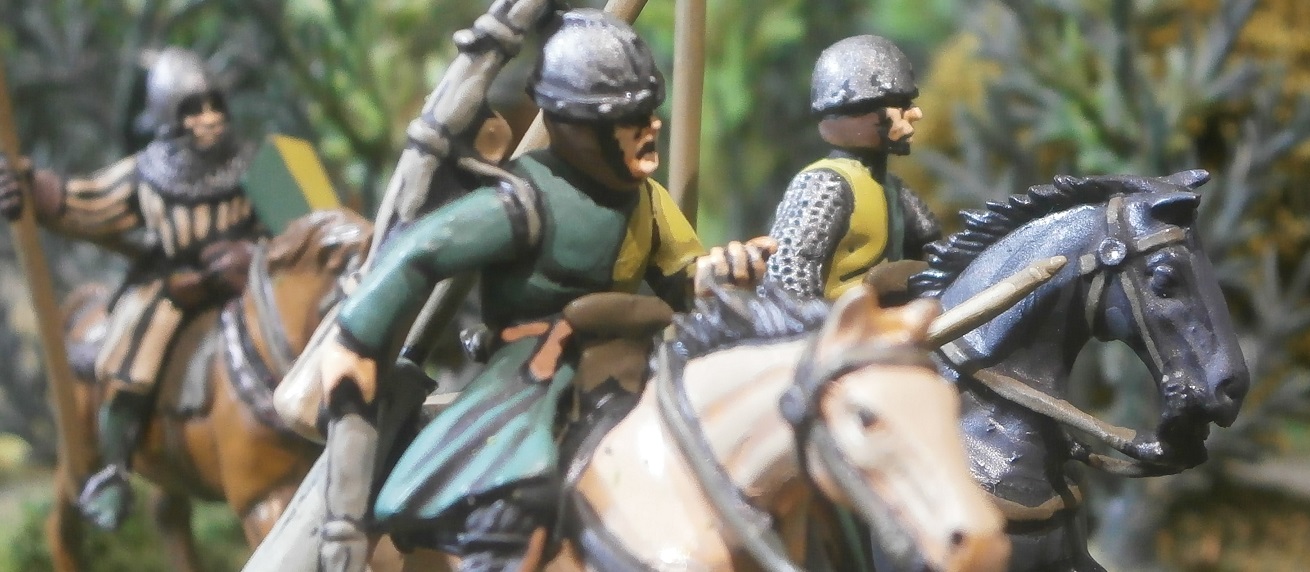
“Well, wizards like to keep to themselves,” said Bossu.
“Not always. That dwarf Glammerscale’s been riding with Jacquot’s lads, if you can call it riding. He’s full of friendly conversation.”
“Dwarfs aren’t proper wizards, so that don’t prove anything.”
Evrart pondered this a moment. “Alright,” he admitted, “I’ll grant you that. But what about Perette? She doesn’t exactly hide herself away; quite the opposite. Not that I’m complaining.”
“She’s not what you’d call ‘proper’ either,” said Bossu with a grin.
“Well, no. But they’re both just petty wizards. I’m talking about the great ones like Niccolo. They get noticed.”
“Not so,” said Bossu. “Most wizards shut themselves up in a tower or some such place and go about whatever strange wickedness they’ve set their minds to.”
“Perette doesn’t need any tower to be wicked,” joked Evrart, now grinning himself.
Their conversation stopped a moment as they heard a horn from up ahead.
“That’s the others,” said Evrart. He tugged the reigns a little to send his horse, his companions following, in the direction of the sound. Bossu kept by his side and returned to the topic in hand.
“I’m talking about the mighty wizards too. They say Niccolo’s lived more’n twice as long as anyone should hope for or expect, harbouring his grudge until he returned to retake the city with the ogres. No-one had heard of him for decades – everyone thought he was dead. That’s a lot of practice at hiding away. Now he’s returned, maybe he’s trying to finish off whatever it was he was doing before the Campogrottans threw him out?”
“I don’t buy it,” argued Evrart. “If Lord Niccolo really ruled that city, there’d be at least one report of him. Instead everyone talks about the ogres, about Razger and Wurgrut. How they took the city, then took Ravola, then robbed their way through Tilea. Razger gives the orders, his brutes do the damage. I don’t see how Niccolo fits in at all. You saw yourself, Bossu, it was their banners on the city towers, no one elses.”
“Oh, and you know Lord Niccolo’s coat-of-arms do you?”
“No, but I know it isn’t a line of teeth-mountains or a bull’s skull tied to a pole with catgut. He’s a nobleman of an ancient family. All the rulers are here, even the vampires, just like home. It’ll be some flowery leaf or a golden crown or fancy swirls in bright green or red or …”
“You’ve no idea what it is!”
“Ah, but I don’t need to know to make my point. Those banners were ogre banners. The whole realm is ruled by ogres. It’s Razger who leads the armies - he decides what they’ll do – so it’s no surprise that they spend all their time smashing places up and plundering. If Niccolo was some great and mighty wizard kept o’er long in this world by necromancy, then why didn’t he make an appearance on the walls during the assaults? Why didn’t he fling lightning down, or summon the undead to serve in the defence? Brute ogres, that’s all that was seen; blood-spattered shamans waving bloody innards about. That’s all.”
“From what I’ve heard of the assault, I doubt our lads would have noticed some old man amongst the brutes. What’s a flash of lightning here and there when Razger’s lads are shooting cannons like handguns and the walls are tumbling left and right?”
“Well,” said Evrart, “Let us see what’s what when we take the city. I’ll bet you ten silver ecus that there’s no sign of any wizard, nor even that there ever was one besides them butcher-shamans. Wizard Lord Niccolo’s nothing but a story.”
“I’ll take that bet,” said Bossu. “And you’ll pay me as soon as you get your share. I’m not waiting to hear your drunken excuses after you and your purse disappear into the stews for a week.”
The horn-blowing riders were the other half of their own band – led by a veteran called Raol - who had split off earlier in the day to sweep a little further north and so cover more ground, aiming to rendezvous near the strangely shaped black-rock they had camped at on their last circuit. Upon meeting it was immediately apparent the new arrivals did not intend to stop, so the two groups merged to ride as one.
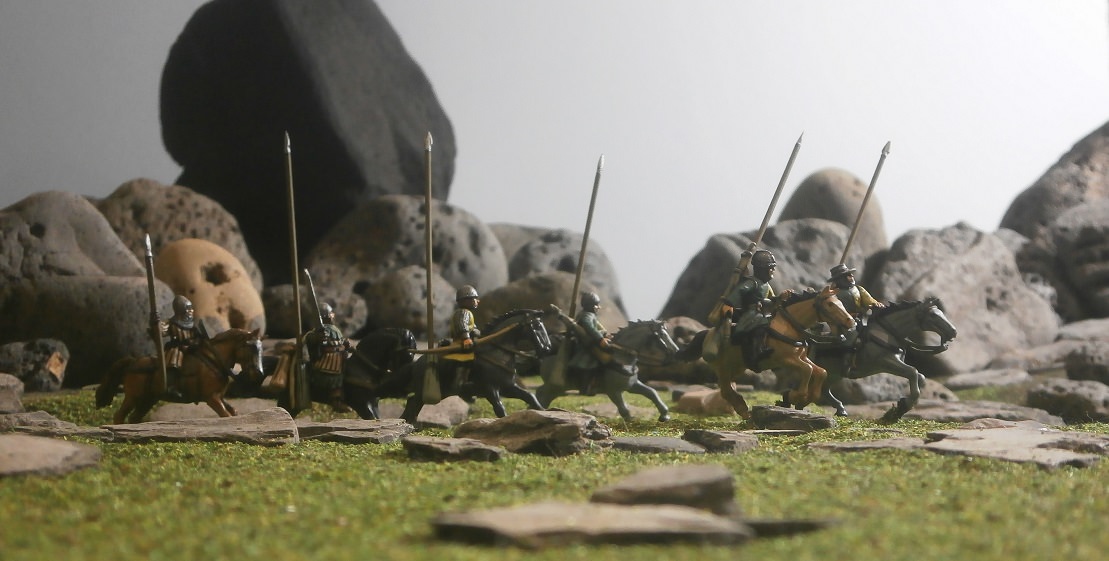
The riders were mounted on good horses, but not destriers like the nobility of Bretonnia favoured in battle, nor palfreys like the same nobles rode when travelling. These horses were best described as rounceys, trained for both long journeys and battle, but not able to support the weight of a plated knight and barding. Each soldier wore a light armour of chainmail and carried long spears, so they could deliver a charge if the opportunity arose, and sported parti-coloured yellow and green shields, being the company’s livery. Every one of them also carried bows and quivers, allowing them to loose volleys at a distance to harry the foe. As they rode now, some clutched their spears, their bows wrapped in waxed linen and slung across either their own back or their mounts; while others held their bows, their spears slotted into long pouches behind their saddles and their shields slung on harness hooks. One or two, Evrart and Raol included, found it more convenient to have both weapons wrapped and bagged while they concentrated on riding and keeping an eye out. They had experience enough to know that should trouble arise, they would have time to prepare whichever weapon they needed, and if they hadn’t time, then they could draw their swords in a moment.
“News, then?” shouted Evrart to Raol, as they both rode at the head of the reconstituted column.
“Aye, and not good. There’s more coming.”
“Razger?”
“Don’t think so,” said Raol. “This lot came from Buldio.”
“Could be some trick of Razger’s, trying to swing around and arrive where he ain’t expected?”
“We thought so too,” said Raol. “So to make sure we got a proper look at them. They’re just a band of bulls, too small in number to be Razger’s army - no warmachines, no baggage, an’ only one banner. I reckon they’ve been off bullying Buldio, but now ordered to return.”
“Could they be meeting with Razger?”
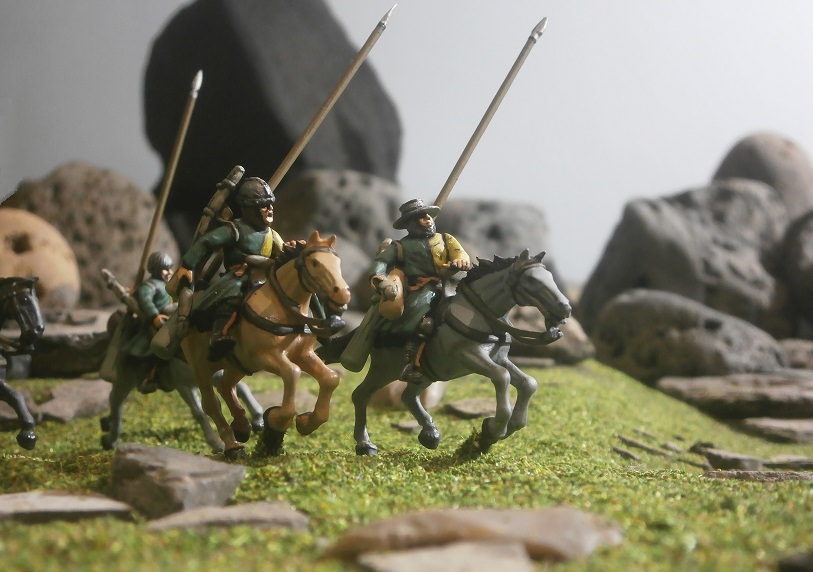
“If that’s their plan, then they’re meeting at Campogrotta. The road they’re taking leads straight there.”
…
(An hour later.)
As they reached the southern stretch of the rocky-ground they spied one of the other two bands of riders heading their way, led by the riders’ commander, Sergeant Huget. The company’s colours were easily made out at the sergeant’s side, long before much else could be seen. Once again the two groups rode towards each other …
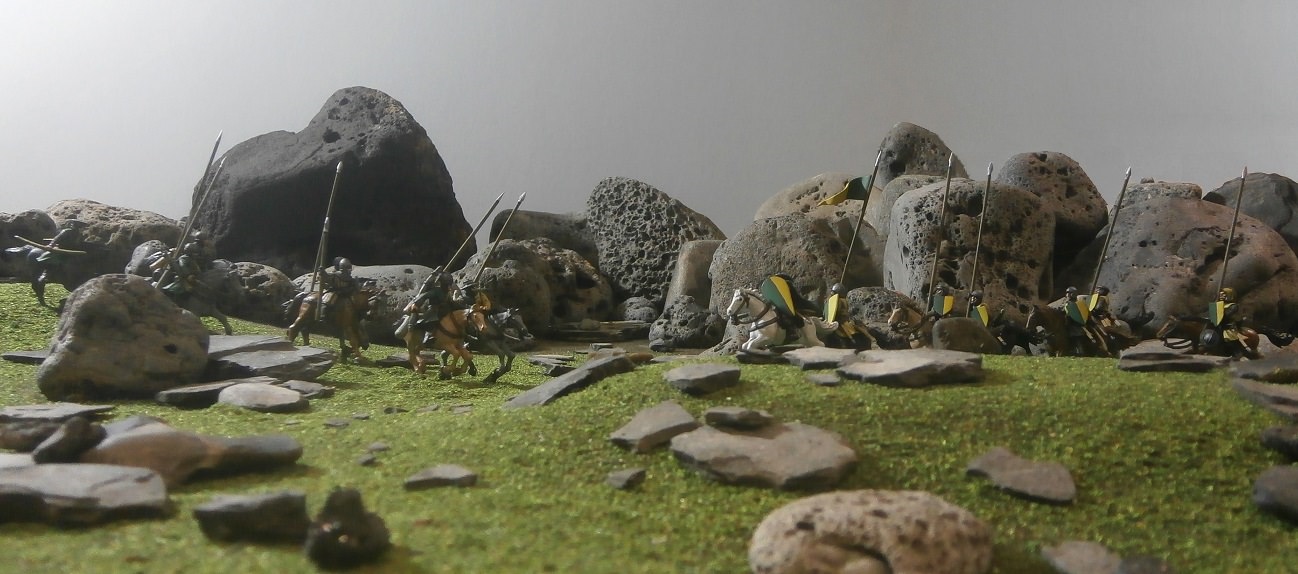
… to join each other on the move; and once again Evrart kept his place at the fore, thus joining the sergeant. As they made their way to the path they had found previously, which led through the wide band of rocks bounding the southernmost reach of this stony land, he reported all he had learned to the sergeant. By the time he finished they had entered the gap through the rocks.
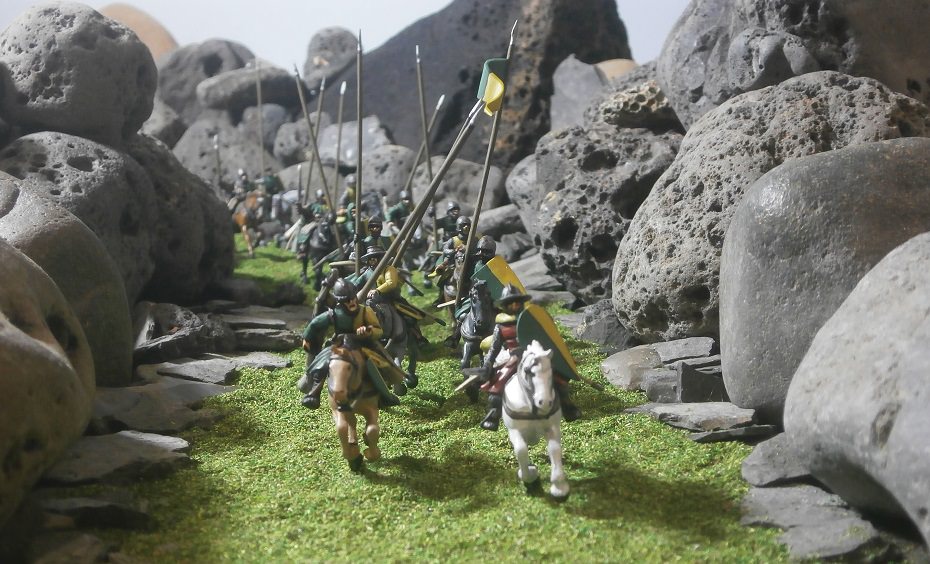
“They’re not the only enemy heading this way,” said the sergeant. “We’ve seen more on the Iron Road.”
“Razger?” asked Evrart.
“I don’t think so. They’re much the same as you described, except that there were greenskin runts with this lot too. And they were coming from the east not the west, which is where Razger will come from.”
“They can’t be from the Lugo watchtower, that place was dead. And there’s no way they came down the Iron Road,” said Evrart.
“No, I reckon they came from the villages of Sermide, only they went north to meet the road before they turned west, instead of just going straight to Campogrotta. They might be planning to meet the ones you saw. ‘Twould explain their diversions.”
“They’re bringing everything they can, then?” asked Evrart.
“As to be expected,” said the sergeant.
“So does that mean Razger’s coming too?”
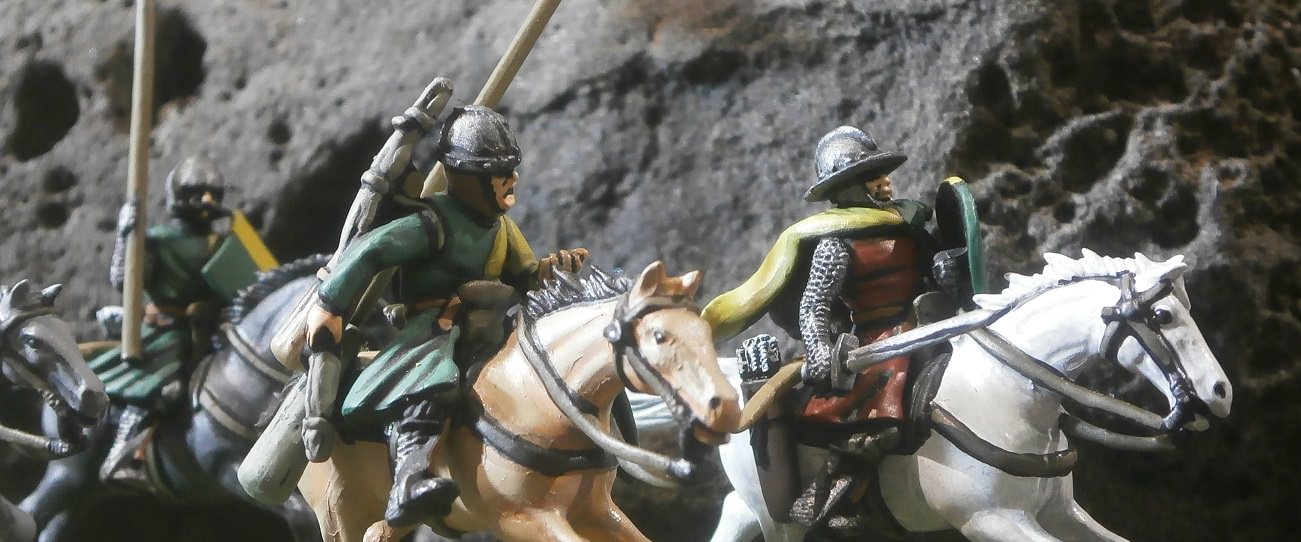
“Who knows? If he is, then the army’s in big trouble because the enemy’s closing from all sides. If he isn’t, then the army still needs to know about this lot because they’re trouble enough.”
-------------------------------------------------------------------------------
Prequel to second assault on Campogrotta
Out Riding
North East of Campogrotta, Very Early Autumn 2403
Having circumnavigated Campogrotta three times, which at over two leagues out from the city meant travelling a considerable distance, the Brabanzon riders were within sight of the rock-strewn area between the villages of Buldio and the Astigo River. They were one of three such scouting bands circling the besieged city in order to discover any approaching relief forces. Lord Narhaz, the ‘great-thane’ commanding the army of Karak Borgo, had every reason to expect the enemy to attempt a relief, for not only was the tyrant Razger Boulderguts reportedly returning to the city having completed his grand (and very profitable) chevauchee, but there were also reports of an ogre garrison at Ravola to the north and smaller forces scattered throughout Campogrotta’s compass. The ogres’ iron grip on the entire realm had relied on gangs of club-wielding brutes to ensure the native citizens’ continually cowed obedience, and any or all of these ogres could be on the move.
Evrart, the longest serving Brabanzon mercenary amongst the riders, his toothless mouth and sunken cheeks belying his sturdy toughness and considerable strength, rode at the head of the little band, regaling his friend Bossu with his latest theory.
“Ask anyone,” he suggested, “even the locals. No-one has ever seen him.”

“Well, wizards like to keep to themselves,” said Bossu.
“Not always. That dwarf Glammerscale’s been riding with Jacquot’s lads, if you can call it riding. He’s full of friendly conversation.”
“Dwarfs aren’t proper wizards, so that don’t prove anything.”
Evrart pondered this a moment. “Alright,” he admitted, “I’ll grant you that. But what about Perette? She doesn’t exactly hide herself away; quite the opposite. Not that I’m complaining.”
“She’s not what you’d call ‘proper’ either,” said Bossu with a grin.
“Well, no. But they’re both just petty wizards. I’m talking about the great ones like Niccolo. They get noticed.”
“Not so,” said Bossu. “Most wizards shut themselves up in a tower or some such place and go about whatever strange wickedness they’ve set their minds to.”
“Perette doesn’t need any tower to be wicked,” joked Evrart, now grinning himself.
Their conversation stopped a moment as they heard a horn from up ahead.
“That’s the others,” said Evrart. He tugged the reigns a little to send his horse, his companions following, in the direction of the sound. Bossu kept by his side and returned to the topic in hand.
“I’m talking about the mighty wizards too. They say Niccolo’s lived more’n twice as long as anyone should hope for or expect, harbouring his grudge until he returned to retake the city with the ogres. No-one had heard of him for decades – everyone thought he was dead. That’s a lot of practice at hiding away. Now he’s returned, maybe he’s trying to finish off whatever it was he was doing before the Campogrottans threw him out?”
“I don’t buy it,” argued Evrart. “If Lord Niccolo really ruled that city, there’d be at least one report of him. Instead everyone talks about the ogres, about Razger and Wurgrut. How they took the city, then took Ravola, then robbed their way through Tilea. Razger gives the orders, his brutes do the damage. I don’t see how Niccolo fits in at all. You saw yourself, Bossu, it was their banners on the city towers, no one elses.”
“Oh, and you know Lord Niccolo’s coat-of-arms do you?”
“No, but I know it isn’t a line of teeth-mountains or a bull’s skull tied to a pole with catgut. He’s a nobleman of an ancient family. All the rulers are here, even the vampires, just like home. It’ll be some flowery leaf or a golden crown or fancy swirls in bright green or red or …”
“You’ve no idea what it is!”
“Ah, but I don’t need to know to make my point. Those banners were ogre banners. The whole realm is ruled by ogres. It’s Razger who leads the armies - he decides what they’ll do – so it’s no surprise that they spend all their time smashing places up and plundering. If Niccolo was some great and mighty wizard kept o’er long in this world by necromancy, then why didn’t he make an appearance on the walls during the assaults? Why didn’t he fling lightning down, or summon the undead to serve in the defence? Brute ogres, that’s all that was seen; blood-spattered shamans waving bloody innards about. That’s all.”
“From what I’ve heard of the assault, I doubt our lads would have noticed some old man amongst the brutes. What’s a flash of lightning here and there when Razger’s lads are shooting cannons like handguns and the walls are tumbling left and right?”
“Well,” said Evrart, “Let us see what’s what when we take the city. I’ll bet you ten silver ecus that there’s no sign of any wizard, nor even that there ever was one besides them butcher-shamans. Wizard Lord Niccolo’s nothing but a story.”
“I’ll take that bet,” said Bossu. “And you’ll pay me as soon as you get your share. I’m not waiting to hear your drunken excuses after you and your purse disappear into the stews for a week.”
The horn-blowing riders were the other half of their own band – led by a veteran called Raol - who had split off earlier in the day to sweep a little further north and so cover more ground, aiming to rendezvous near the strangely shaped black-rock they had camped at on their last circuit. Upon meeting it was immediately apparent the new arrivals did not intend to stop, so the two groups merged to ride as one.

The riders were mounted on good horses, but not destriers like the nobility of Bretonnia favoured in battle, nor palfreys like the same nobles rode when travelling. These horses were best described as rounceys, trained for both long journeys and battle, but not able to support the weight of a plated knight and barding. Each soldier wore a light armour of chainmail and carried long spears, so they could deliver a charge if the opportunity arose, and sported parti-coloured yellow and green shields, being the company’s livery. Every one of them also carried bows and quivers, allowing them to loose volleys at a distance to harry the foe. As they rode now, some clutched their spears, their bows wrapped in waxed linen and slung across either their own back or their mounts; while others held their bows, their spears slotted into long pouches behind their saddles and their shields slung on harness hooks. One or two, Evrart and Raol included, found it more convenient to have both weapons wrapped and bagged while they concentrated on riding and keeping an eye out. They had experience enough to know that should trouble arise, they would have time to prepare whichever weapon they needed, and if they hadn’t time, then they could draw their swords in a moment.
“News, then?” shouted Evrart to Raol, as they both rode at the head of the reconstituted column.
“Aye, and not good. There’s more coming.”
“Razger?”
“Don’t think so,” said Raol. “This lot came from Buldio.”
“Could be some trick of Razger’s, trying to swing around and arrive where he ain’t expected?”
“We thought so too,” said Raol. “So to make sure we got a proper look at them. They’re just a band of bulls, too small in number to be Razger’s army - no warmachines, no baggage, an’ only one banner. I reckon they’ve been off bullying Buldio, but now ordered to return.”
“Could they be meeting with Razger?”

“If that’s their plan, then they’re meeting at Campogrotta. The road they’re taking leads straight there.”
…
(An hour later.)
As they reached the southern stretch of the rocky-ground they spied one of the other two bands of riders heading their way, led by the riders’ commander, Sergeant Huget. The company’s colours were easily made out at the sergeant’s side, long before much else could be seen. Once again the two groups rode towards each other …

… to join each other on the move; and once again Evrart kept his place at the fore, thus joining the sergeant. As they made their way to the path they had found previously, which led through the wide band of rocks bounding the southernmost reach of this stony land, he reported all he had learned to the sergeant. By the time he finished they had entered the gap through the rocks.

“They’re not the only enemy heading this way,” said the sergeant. “We’ve seen more on the Iron Road.”
“Razger?” asked Evrart.
“I don’t think so. They’re much the same as you described, except that there were greenskin runts with this lot too. And they were coming from the east not the west, which is where Razger will come from.”
“They can’t be from the Lugo watchtower, that place was dead. And there’s no way they came down the Iron Road,” said Evrart.
“No, I reckon they came from the villages of Sermide, only they went north to meet the road before they turned west, instead of just going straight to Campogrotta. They might be planning to meet the ones you saw. ‘Twould explain their diversions.”
“They’re bringing everything they can, then?” asked Evrart.
“As to be expected,” said the sergeant.
“So does that mean Razger’s coming too?”

“Who knows? If he is, then the army’s in big trouble because the enemy’s closing from all sides. If he isn’t, then the army still needs to know about this lot because they’re trouble enough.”
Padre
Lord
Game Note: The following game continues almost from the point the previous battle ended, but now the ogres have two 400 pts relief forces, one entering from the north side, the other from the south, as well as a few newly-bought maneaters bribed (using saved ‘Supply Points’ in the city’s coffers) to help on the defence of the city. This scenario came about due to the fact that the first assault was a technical draw (as per the campaign siege-assault rules) even though the attackers very obviously had the upper hand. Also, because the battle took place at the very end of the summer season, thus (again a technicality) the end of season phase kicked in and reinforcements could be created and ordered. What would be a simply some number-crunching in a board-game style campaign thus drove the creation of the above story-piece and the wargame below. Without the relief forces, the battle would have not been worth fighting, being a foregone conclusion. But with the extra forces performing a pincer attack we decided it was game on!
The Second Assault on Campogrotta: The Battle
Part 1: Deployment and Turn One
The army of Karak Borgo waited four days for their master engineer to declare it was safe to recommence firing Granite Breaker. The engineer spent that time scrutinising every square inch of the enormous barrel – no easy thing considering its massive iron weight had to be lifted aloft by a hastily constructed hoist, to a height of just more than the width of a dwarf, allowing him to crawl beneath, there to inspect the underside. As was the dwarven way he was not to be rushed, taking his time to do the job thoroughly. Not one dwarf thought to complain, bar Glammerscale the wizard, who ought never be taken as an example of a typical dwarven attitude. The Brabanzon mercenaries, on the other hand, found the delay most frustrating - to them the city seemed ripe for the taking. They had to console themselves with the notion that once the massive gun continued its booming battery, the enemy would be so distracted and distressed that the mercenaries’ casualties during the assault should be much less than otherwise they might.
Meanwhile the bombardment was maintained by the mighty engine’s smaller counterparts: cannons, bolt throwers and the archaically fashioned stone thrower the Brabanzon had brought in pieces through the mountain pass, then pegged and lashed together with practised skill. Their combined efforts paled into insignificance compared to Granite Breaker’s earlier work, but it showed the enemy the besiegers were awake and able to hurl missiles perfectly capable of punching right through ogre flesh and bones, if not very effective against the stone walls.
The besiegers kept a constant, close eye upon the shattered walls and towers, expecting a sally would surely be launched against them, but it seemed the defenders had not the numbers for such. Either that, or they were awaiting some other development. In the meantime, despite the steady barrage of bolt and ball, the surviving ogres patrolled the walls with their own brass and iron pieces, with smouldering slow-match always to hand.

Some brutes, as if careless of whatever could be thrown at them, patrolled the mounds of rubble where the walls had tumbled. Others occasionally wandered outside the walls. Perhaps curiosity had got the better of them? Or they wanted to flaunt their contempt of the dwarves and men dispersed about the city?
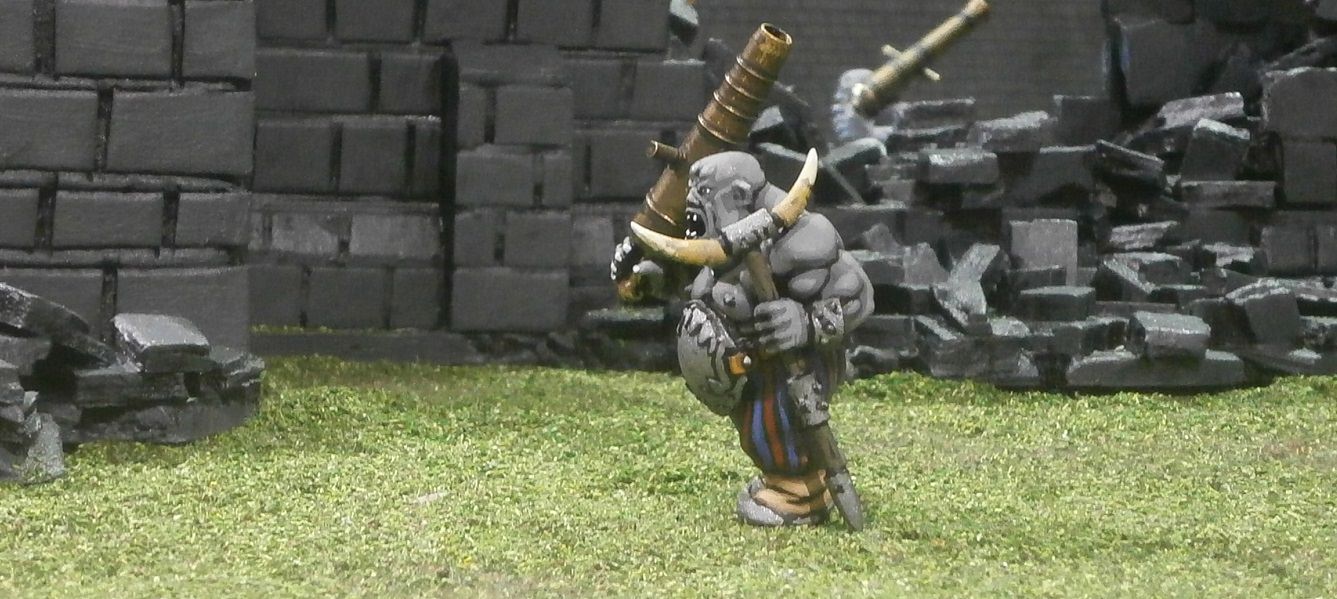
Some of these even re-crossed the rubble to return inside, although several never came back, simply adding new, grey heaps to the already large mounds of tumbled stones.
When their hired Brabanzon scouts returned in the afternoon of the fourth day the army of Karak Borgo learned exactly why the ogres were biding their time. The riders reported the approach of two separate relief forces, from both the north and the south-east. An hour later, when the master engineer was finally satisfied (and not a moment sooner), the re-loading of Granite Breaker began and the ‘Great Thane’ of Dravaz, Lord Narhak, ordered the call to arms.
The army drew up in a rather different manner than last assault, for they knew the foe would come from up to three sides. The dwarfs formed a defensive arc afore their artillery pieces. The scouts had reported greater numbers approaching from the south-east, so Lord Narhak joined his warriors to form a barrier to that side, while his thunderers and longbeard veterans stood upon his flank, along the front of the line.
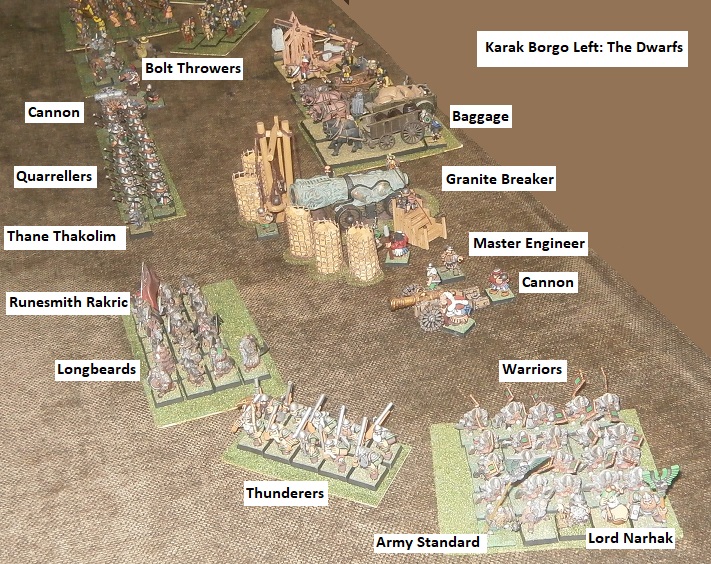
Beyond them, closer to the centre of the line, were the dwarven quarrellers, then the cannon and bolt throwers, with Granite Breaker behind (able to shoot over the rest). Upon the right of the line were the mercenary Bretonnians, the Brabanzon, their main regiment of foot-soldiers providing the more solid defence, while longbowmen and brigand archers formed close by to sting any who approached from that side. The Brabanzon horsemen, now reconstituted into one body, patrolled the front of the line (Game Note: Here having already made their vanguard move.) …

Baron Garoy and his youthful knights rode upon the far-right, hoping to be the first to engage any foe approaching from that flank. They had lost several of their number during the first assault merely attempting to cross the rubble of the breaches and were now hoping to engage the foe on the flat, for that would mean either glory through victory or defeat in combat, and not the ignominy of death due a fall.
The defenders clustered mainly behind the southern walls, before the dwarven line. The slaughtermaster Wurgrut joined the newly recruited maneaters behind one of the few stretches of wall that had yet to tumble, while one of the two surviving companies of leadbelchers awaited even further within for orders concerning where and when to move up.
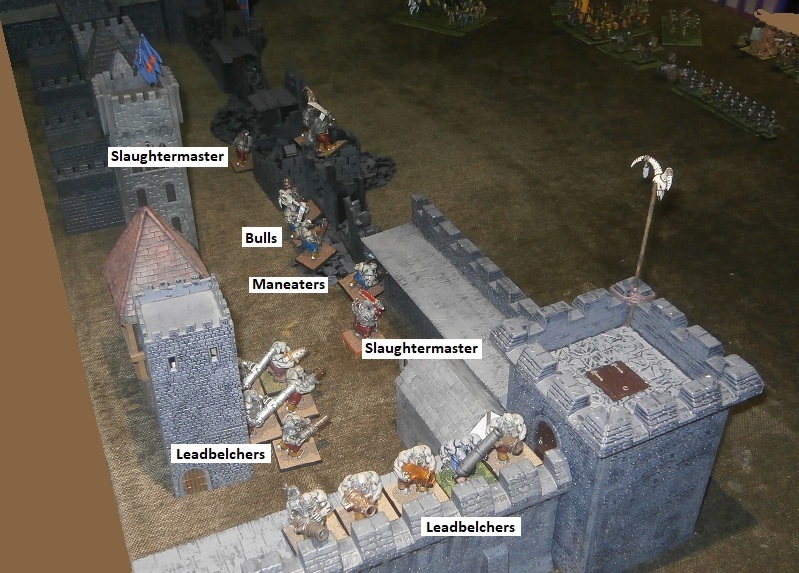
The other leadbelchers had mounted the southern wall, where, considering they could not even see the attackers, they too awaited orders. Wurgrut’s second in command skulked with the last of the bulls behind the ruinous gate.
Such were the dispositions as the second assault was to begin.
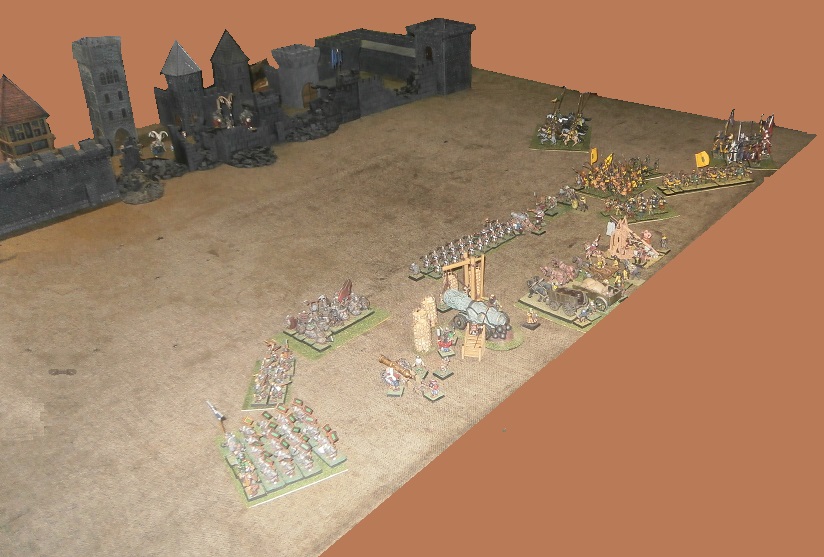
As Sergeant Huget led his riders towards the wall, to get a closer and therefore better look at what appeared to be a very weakly defended stretch …
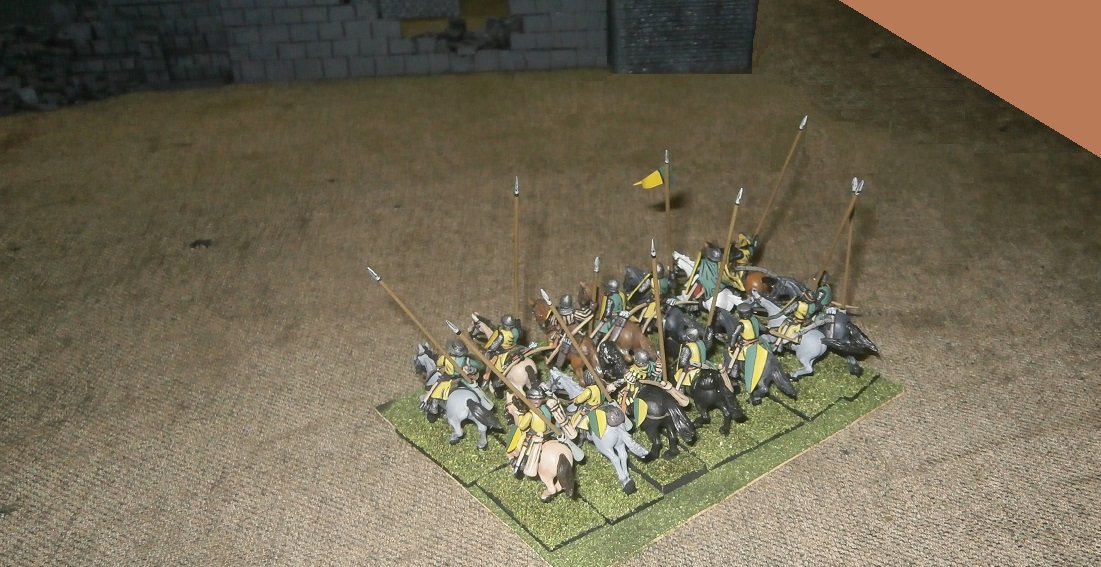
… the ogres took the bold manoeuvre as a sign that battle was about to commence. The leadbelchers on the southern wall …

… having ladders ready on the ramparts, descended outside the walls, and crept as best they could, whilst hefting their heavy metal burdens, towards the corner tower.
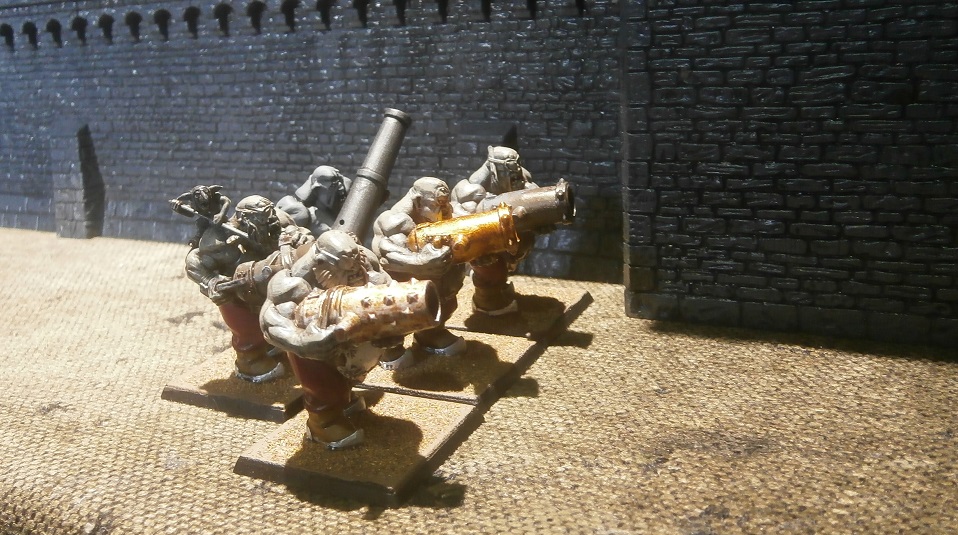
The remainder of the garrison merely shuffled and stretched to peek out through the ruins here and there. One of the maneaters, his ridiculously oversized head ornament (Game Note: Sorry Jamie, but even you have to admit it is a bizarre headdress/mask combination!) as well as the semi-collapsed ruins obscuring his view, had spotted the horsemen closing on the walls, but then quickly lost sight of them.
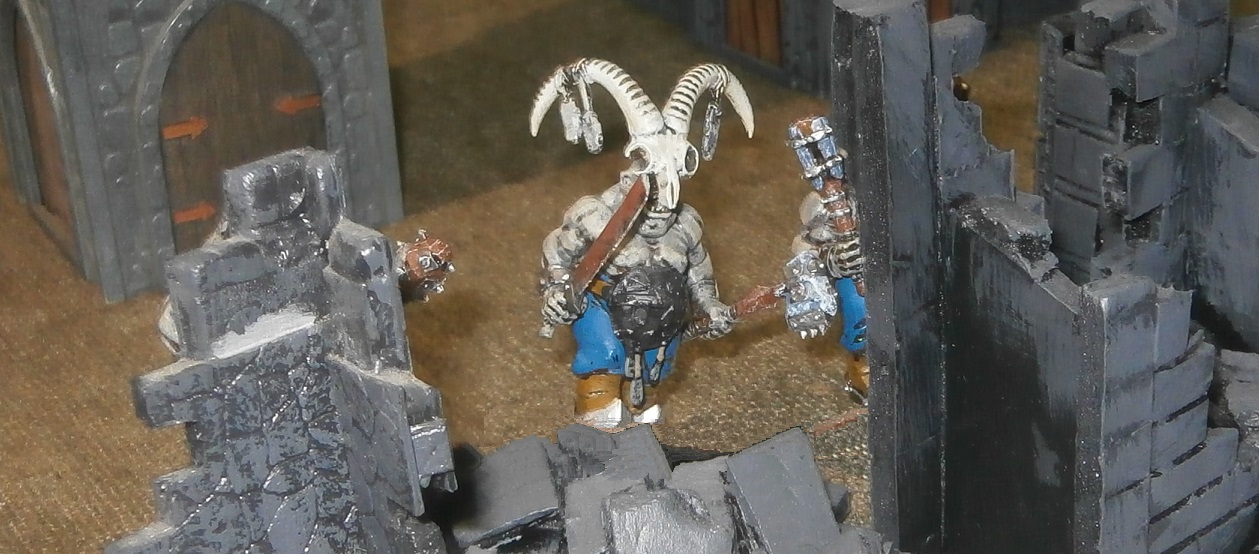
He shouted across to second slaughtermaster further along the wall, who responded by conjuring up the spell known as Braingobbler to work a fearful doubt into their minds. Sergeant Huget’s angry shouts, laced as they were with more than a hint of the panic the ogres’ enchantment had sent speckling through him also, failed either to reassure or cow his men, and the riders turned and fled. (Game Note: They failed the dispel roll and their re-rolled panic test – the Brabanzon army standard was within 12”) This initial discouragement, however, had little effect on the rest of the Brabanzon, for most simply assumed the riders had seen whatever they had seen, then chosen to fall back to a safer distance. When the horsemen did indeed rally and reform, this seemed only to confirm the mistaken assumption.
Amongst the riders it was the veteran Evrart who spoke first.
“That was magic, lads. Nasty and peculiar. But none of us is hurt, so let’s put it behind us. If that’s all they have, then it’s a good thing, not bad. Such as that shan’t cut or bruise us, nor break our bones, just give us bad dreams.”
He took a hearty gulp of the dwarven ale in his costrel, as did several others a moment later. Then the sergeant asked, “Ready?” and after a smattering of Ayes, they reformed their body.
The only regiment to move amongst the attackers were the Brabanzon longbowmen, looking to find themselves an opportunity to shoot. The dwarven crossbowmen already had their opportunity …
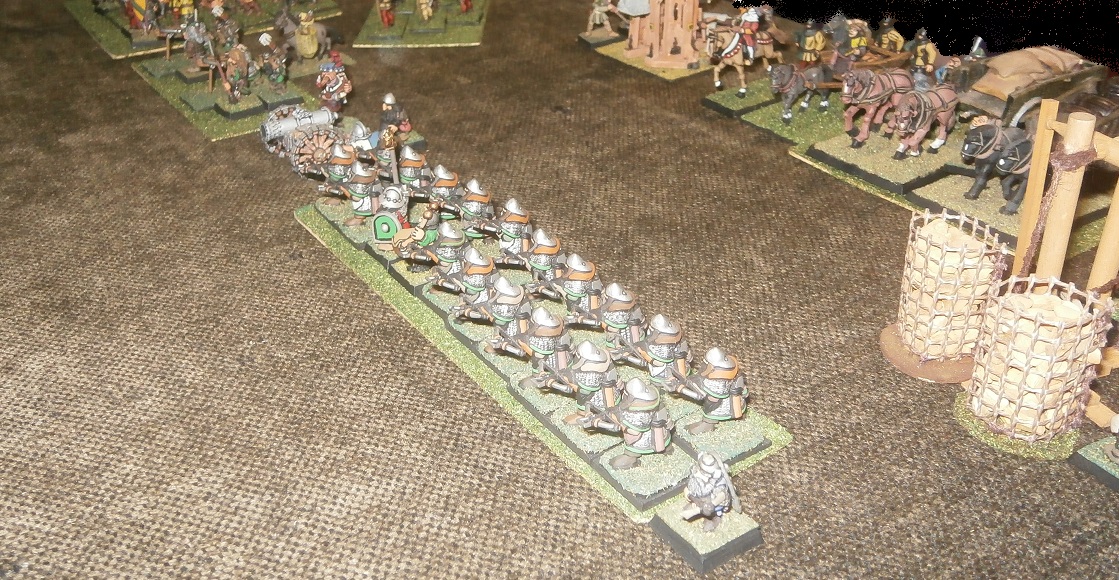
… and sent a storm of bolts at the Slaughtermaster. These clattered upon the stone all around him, and even struck his body, but some magical ward he possessed thwarted those few that otherwise might have cut into him. He grinned, revealing his maw of splintered teeth and bloody gums, and reached out to pluck a bolt from the mortar it had embedded itself in, thinking it might serve well as a toothpick. But then his eyes widened as he noticed the black shape of a roundshot skipping towards him. If he hadn’t already moved to grab the bolt, the ball would have hit him square on, instead it brushed his arm to leave a large, black bruise. (Game Note: This was technically a direct hit and he failed his ward, but then its D6 wound roll came up 1!)
Below Granite Breaker’s muzzle, one of the matrosses reached aloft to tip the wooden container holding the iron ball, and sent it rolling down to join the two already inside.
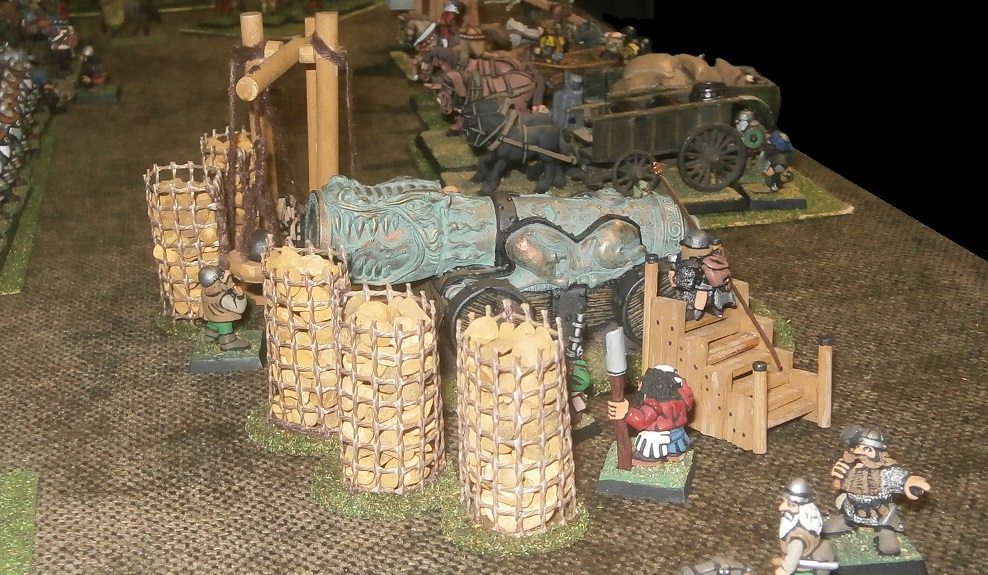
The crew did not bother to wad or ram the shots home (to do so would take another half an hour) but instead moved away from the front and cupped their hands over their ears, their thumbs splayed out at the back so as to relieve the pressure that was about to shudder its way through their heads. The chief gunner dipped his extra-long linstock so his mate could blow on the coals, then swung it up and over to lower the glowing end of the match down onto the trail of slightly slower-burning powder he had trailed behind the mound of more excitable powder directly upon the touch hole. This gave him just enough time to turn and all but throw himself down the steps of his platform.
The resultant boom was no more nor less loud than its previous efforts, and yet all those before and within the walls still found themselves shocked. The trio of balls missed the stone defences, travelling through one of breaches Granite Breaker had already made, and ploughed several hundred yards into the city, collapsing several houses and punching through many more walls.
Unfortunately, the great gun’s blast had come at a very inopportune moment for the trebuchet’s Brabanzon crew. Two had been winding tension into the tautly coiled rope, another was nursing the catch to hold the winder in place as the rods were removed and replaced to tighten some more, and a fourth, now that the basket was low enough to do so, had begun adding rocks. Who flinched, or slipped, or let go, no-one knows, but the resultant premature release wrecked the machine, killed two crewmen and wounded a third. (Game Note: You have probably guessed – catastrophic misfire.)
Turn 2 to follow.
The Second Assault on Campogrotta: The Battle
Part 1: Deployment and Turn One
The army of Karak Borgo waited four days for their master engineer to declare it was safe to recommence firing Granite Breaker. The engineer spent that time scrutinising every square inch of the enormous barrel – no easy thing considering its massive iron weight had to be lifted aloft by a hastily constructed hoist, to a height of just more than the width of a dwarf, allowing him to crawl beneath, there to inspect the underside. As was the dwarven way he was not to be rushed, taking his time to do the job thoroughly. Not one dwarf thought to complain, bar Glammerscale the wizard, who ought never be taken as an example of a typical dwarven attitude. The Brabanzon mercenaries, on the other hand, found the delay most frustrating - to them the city seemed ripe for the taking. They had to console themselves with the notion that once the massive gun continued its booming battery, the enemy would be so distracted and distressed that the mercenaries’ casualties during the assault should be much less than otherwise they might.
Meanwhile the bombardment was maintained by the mighty engine’s smaller counterparts: cannons, bolt throwers and the archaically fashioned stone thrower the Brabanzon had brought in pieces through the mountain pass, then pegged and lashed together with practised skill. Their combined efforts paled into insignificance compared to Granite Breaker’s earlier work, but it showed the enemy the besiegers were awake and able to hurl missiles perfectly capable of punching right through ogre flesh and bones, if not very effective against the stone walls.
The besiegers kept a constant, close eye upon the shattered walls and towers, expecting a sally would surely be launched against them, but it seemed the defenders had not the numbers for such. Either that, or they were awaiting some other development. In the meantime, despite the steady barrage of bolt and ball, the surviving ogres patrolled the walls with their own brass and iron pieces, with smouldering slow-match always to hand.

Some brutes, as if careless of whatever could be thrown at them, patrolled the mounds of rubble where the walls had tumbled. Others occasionally wandered outside the walls. Perhaps curiosity had got the better of them? Or they wanted to flaunt their contempt of the dwarves and men dispersed about the city?

Some of these even re-crossed the rubble to return inside, although several never came back, simply adding new, grey heaps to the already large mounds of tumbled stones.
When their hired Brabanzon scouts returned in the afternoon of the fourth day the army of Karak Borgo learned exactly why the ogres were biding their time. The riders reported the approach of two separate relief forces, from both the north and the south-east. An hour later, when the master engineer was finally satisfied (and not a moment sooner), the re-loading of Granite Breaker began and the ‘Great Thane’ of Dravaz, Lord Narhak, ordered the call to arms.
The army drew up in a rather different manner than last assault, for they knew the foe would come from up to three sides. The dwarfs formed a defensive arc afore their artillery pieces. The scouts had reported greater numbers approaching from the south-east, so Lord Narhak joined his warriors to form a barrier to that side, while his thunderers and longbeard veterans stood upon his flank, along the front of the line.

Beyond them, closer to the centre of the line, were the dwarven quarrellers, then the cannon and bolt throwers, with Granite Breaker behind (able to shoot over the rest). Upon the right of the line were the mercenary Bretonnians, the Brabanzon, their main regiment of foot-soldiers providing the more solid defence, while longbowmen and brigand archers formed close by to sting any who approached from that side. The Brabanzon horsemen, now reconstituted into one body, patrolled the front of the line (Game Note: Here having already made their vanguard move.) …

Baron Garoy and his youthful knights rode upon the far-right, hoping to be the first to engage any foe approaching from that flank. They had lost several of their number during the first assault merely attempting to cross the rubble of the breaches and were now hoping to engage the foe on the flat, for that would mean either glory through victory or defeat in combat, and not the ignominy of death due a fall.
The defenders clustered mainly behind the southern walls, before the dwarven line. The slaughtermaster Wurgrut joined the newly recruited maneaters behind one of the few stretches of wall that had yet to tumble, while one of the two surviving companies of leadbelchers awaited even further within for orders concerning where and when to move up.

The other leadbelchers had mounted the southern wall, where, considering they could not even see the attackers, they too awaited orders. Wurgrut’s second in command skulked with the last of the bulls behind the ruinous gate.
Such were the dispositions as the second assault was to begin.

As Sergeant Huget led his riders towards the wall, to get a closer and therefore better look at what appeared to be a very weakly defended stretch …

… the ogres took the bold manoeuvre as a sign that battle was about to commence. The leadbelchers on the southern wall …

… having ladders ready on the ramparts, descended outside the walls, and crept as best they could, whilst hefting their heavy metal burdens, towards the corner tower.

The remainder of the garrison merely shuffled and stretched to peek out through the ruins here and there. One of the maneaters, his ridiculously oversized head ornament (Game Note: Sorry Jamie, but even you have to admit it is a bizarre headdress/mask combination!) as well as the semi-collapsed ruins obscuring his view, had spotted the horsemen closing on the walls, but then quickly lost sight of them.

He shouted across to second slaughtermaster further along the wall, who responded by conjuring up the spell known as Braingobbler to work a fearful doubt into their minds. Sergeant Huget’s angry shouts, laced as they were with more than a hint of the panic the ogres’ enchantment had sent speckling through him also, failed either to reassure or cow his men, and the riders turned and fled. (Game Note: They failed the dispel roll and their re-rolled panic test – the Brabanzon army standard was within 12”) This initial discouragement, however, had little effect on the rest of the Brabanzon, for most simply assumed the riders had seen whatever they had seen, then chosen to fall back to a safer distance. When the horsemen did indeed rally and reform, this seemed only to confirm the mistaken assumption.
Amongst the riders it was the veteran Evrart who spoke first.
“That was magic, lads. Nasty and peculiar. But none of us is hurt, so let’s put it behind us. If that’s all they have, then it’s a good thing, not bad. Such as that shan’t cut or bruise us, nor break our bones, just give us bad dreams.”
He took a hearty gulp of the dwarven ale in his costrel, as did several others a moment later. Then the sergeant asked, “Ready?” and after a smattering of Ayes, they reformed their body.
The only regiment to move amongst the attackers were the Brabanzon longbowmen, looking to find themselves an opportunity to shoot. The dwarven crossbowmen already had their opportunity …

… and sent a storm of bolts at the Slaughtermaster. These clattered upon the stone all around him, and even struck his body, but some magical ward he possessed thwarted those few that otherwise might have cut into him. He grinned, revealing his maw of splintered teeth and bloody gums, and reached out to pluck a bolt from the mortar it had embedded itself in, thinking it might serve well as a toothpick. But then his eyes widened as he noticed the black shape of a roundshot skipping towards him. If he hadn’t already moved to grab the bolt, the ball would have hit him square on, instead it brushed his arm to leave a large, black bruise. (Game Note: This was technically a direct hit and he failed his ward, but then its D6 wound roll came up 1!)
Below Granite Breaker’s muzzle, one of the matrosses reached aloft to tip the wooden container holding the iron ball, and sent it rolling down to join the two already inside.

The crew did not bother to wad or ram the shots home (to do so would take another half an hour) but instead moved away from the front and cupped their hands over their ears, their thumbs splayed out at the back so as to relieve the pressure that was about to shudder its way through their heads. The chief gunner dipped his extra-long linstock so his mate could blow on the coals, then swung it up and over to lower the glowing end of the match down onto the trail of slightly slower-burning powder he had trailed behind the mound of more excitable powder directly upon the touch hole. This gave him just enough time to turn and all but throw himself down the steps of his platform.
The resultant boom was no more nor less loud than its previous efforts, and yet all those before and within the walls still found themselves shocked. The trio of balls missed the stone defences, travelling through one of breaches Granite Breaker had already made, and ploughed several hundred yards into the city, collapsing several houses and punching through many more walls.
Unfortunately, the great gun’s blast had come at a very inopportune moment for the trebuchet’s Brabanzon crew. Two had been winding tension into the tautly coiled rope, another was nursing the catch to hold the winder in place as the rods were removed and replaced to tighten some more, and a fourth, now that the basket was low enough to do so, had begun adding rocks. Who flinched, or slipped, or let go, no-one knows, but the resultant premature release wrecked the machine, killed two crewmen and wounded a third. (Game Note: You have probably guessed – catastrophic misfire.)
Turn 2 to follow.
Padre
Lord
Turns 2 – 3
The dwarven Longbeards, commanded by the Runesmith Rakric Bronzeborn, had already begun to move towards the city wall …

… when the ogre relief force from Sermide arrived upon the field, consisting of a company of bulls and a mob of gnoblars. (Game Note: Both relief forces rolled separately, 5+ to arrive on turn 2, 4+ on turn 3, and if still absent, an automatic arrival on turn 4)
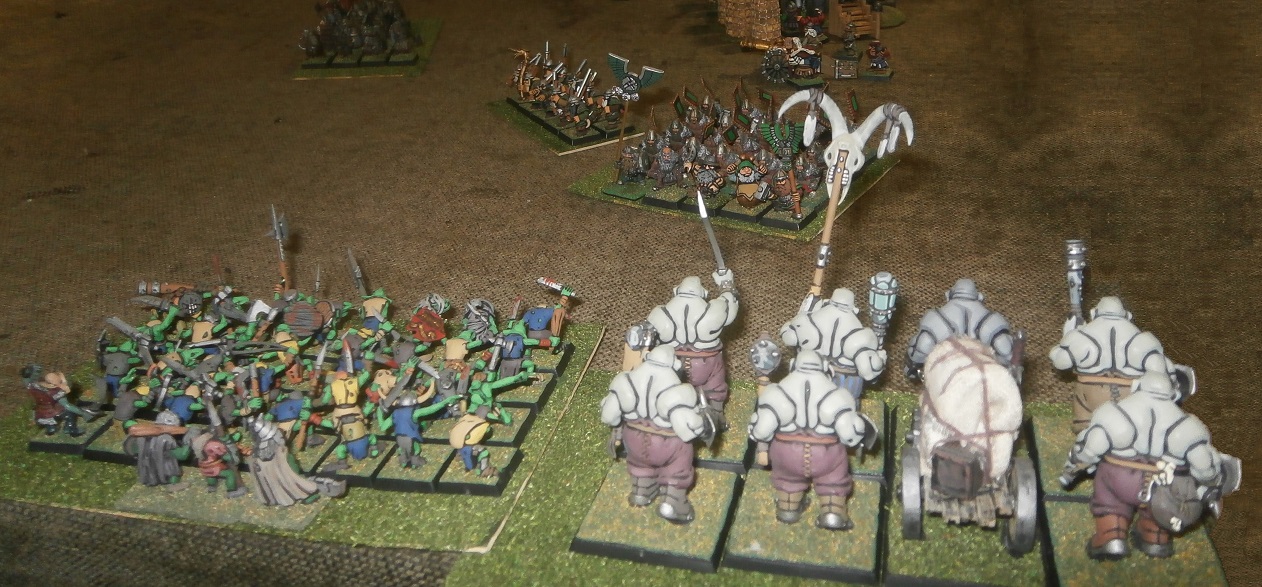
Lord Narhak had expected them, and so he was ready. He, his warriors and his army standard bearer, the long-bearded veteran Thane Bragdebreg, had tarried as the longbeards moved away, and so now stood directly in the ogres’ way.
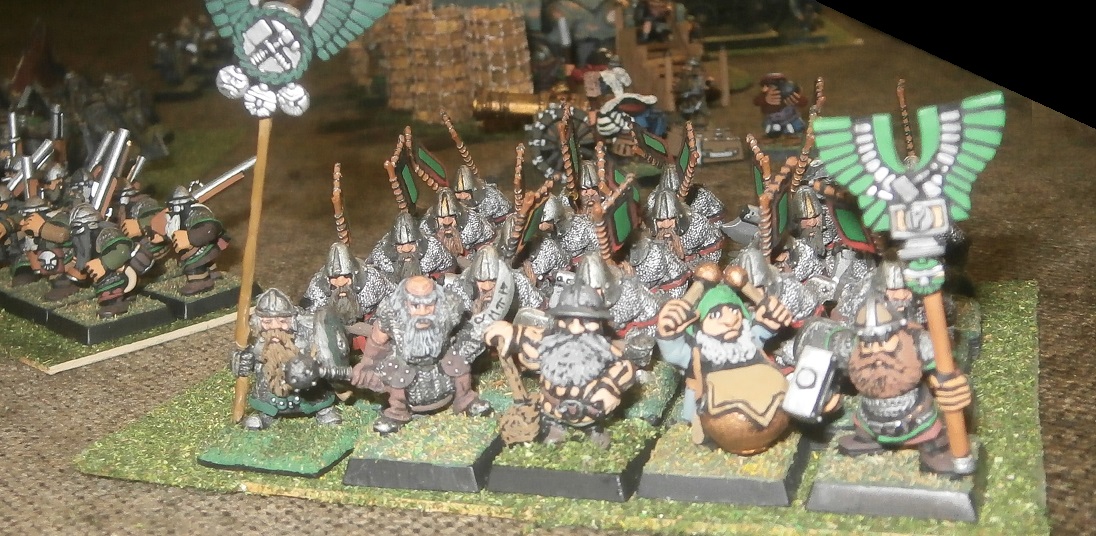
The leadbelchers inside the city, reassured by the fact that Granite Breaker had failed even to chip the defences (and happy to pretend they had not witnessed what its shot had done to the dwellings inside the walls) now ascended onto the parapet, there to be joined by the Slaughtermaster Wurgrut. To their left the Maneaters edged forwards through the rubble, all the better to snipe at the foe using their handgun-sized pistols, while the leadbelchers who had descended from the southern wall now moved out into the shadow of the corner tower.
Wurgrut, having spotted the arrival of the first relief force, now attempted to crush the bones of the dwarven thunderers close to the newcomers, but although his spell was cast, it did little more than make the enemy’s bones ache, while the energies that spilled from his over-hasty efforts hurt stung him and the leadbelchers at his side, and sloughed away what other energies the winds of magic could have provided for both him and his lieutenant. He cursed, partly at the pain of the injury he had received, partly at the frustration of fumbling his magical efforts, but mainly because cursing was his most common form of utterance.
Only momentarily distracted by their comrade’s wound, the leadbelchers on the wall with Wurgut blasted their barrels at the advancing Longbeards, cutting four down. Their success drew the maneaters’ and other leadbelchers’ interest, so that they too gave fire upon the same enemy regiment, but despite spewing great plumes of smoke, they failed to harm any more of the enemy. Rakric Bronzeborn took a puff upon his pipe, and uttered a single, entirely unnecessary, word: “Steady”.

The ragged mob of gnoblars drew close enough to hurl a varied collection of sharp missiles at the dwarven handgunners, killing one. While they whooped and squealed, the dwarves calmly continued making their pieces ready.
Lord Narhak now ordered his warriors to ‘march on’, towards the ogres. This was no charge, but rather an attempt to ensure that the bulls could not slip past the warriors while the gnoblars caused a distraction.

Slowly but surely, the dwarves moved so that the only way either gnoblars or ogres could get to the artillery pieces in the rear was to go through them. One amongst the warriors a drummer named Ringregur beat the steady call required for this manoeuvre whilst staring wide-eyed at the massive brutes ahead.
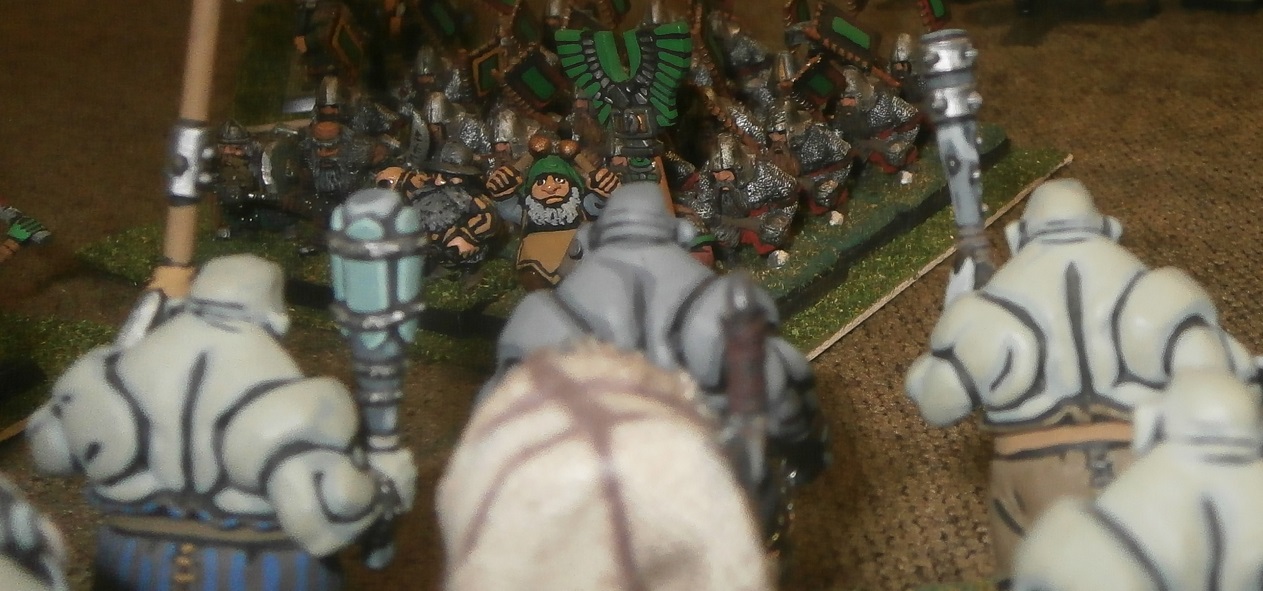
He had been recruited fresh for this campaign and had never seen battle before, apart from the occasional drunken brawl in the alehouses and halls he entertained in. He did not know it, but Lord Narhak had noticed his expression, recognising the trepidation it revealed. Even as the brute foe began their charge, Lord Narhak leaned towards the drummer and said, “Tough Audience.” Ringregur might have laughed had he had time to do so.
(Game note: I have to admit that as GM, note-taker and photographer, I thought the dwarfs were in a very bad situation. If the ogres got through they could sweep down the line destroying machine after machine before anyone else could get to grips with them, never mind actually stop them. The dwarven player, however, despite commanding an NPC force not his own, knew the capabilities of a dwarven unit with not one but two lords within it better than I, as well as what spells he planned to assist them, and he was confident. Time would tell.)
Glammerscale the wizard, standing between the quarrellers and the stone-filled gabions shielding Granite Breaker’s crew, could see what was happening on the left flank.

Having his most important books at hand, and tasselled bookmarks handily placed, he opened to a richly adorned page containing the bound spell Harmonic Convergence. With little more than a stroke and a word of command, he released the spell and so blessed the warriors for the fight ahead. Emboldened by this success, he turned to a much trickier page, for the spell there was described but not bound. He had studied this page deep into the night, and now read it aloud hoping to call down a comet from the heavens. For a moment he thought it had worked, but then he sensed the unlacing of the etheric winds by the enemy’s magicians, and the possibility was gone. He closed the book but, in hope, left the bookmark in its place.
While the thunderers arguably wasted good powder killing four gnoblars, one of the bolt-throwers injured a leadbelcher, while shots from the smaller cannons tore a bull in half and felled another leadbelcher. Granite breaker struck the last standing section of wall to visibly shake both it and the ogres upon it, which is why Wurgrut accompanied the leadbelchers off the wall to stand boldly upon the outside.

Now that the relief had begin to arrive, the ‘slaughtermaster-general’ did not intend to sit inside the walls as they were torn apart like the last time. Ahead of him, the other company of leadbelchers had already ventured some distance out …
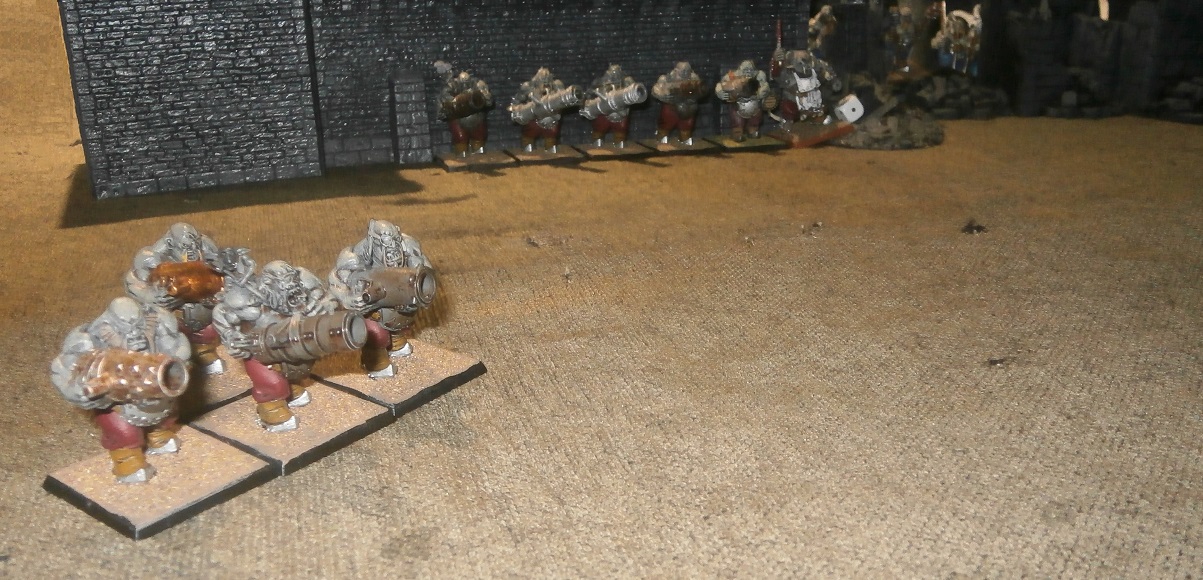
… while to the other side the maneaters and bulls had also emerged from the ruinous walls.

As all these ogres came on, the relief force had already charged: the bulls smashed hard into the steel-clad dwarf warriors; beside them the gnoblars poured onto the much smaller body of dwarven thunderers, leaving five dead from the dwarves’ countershot.
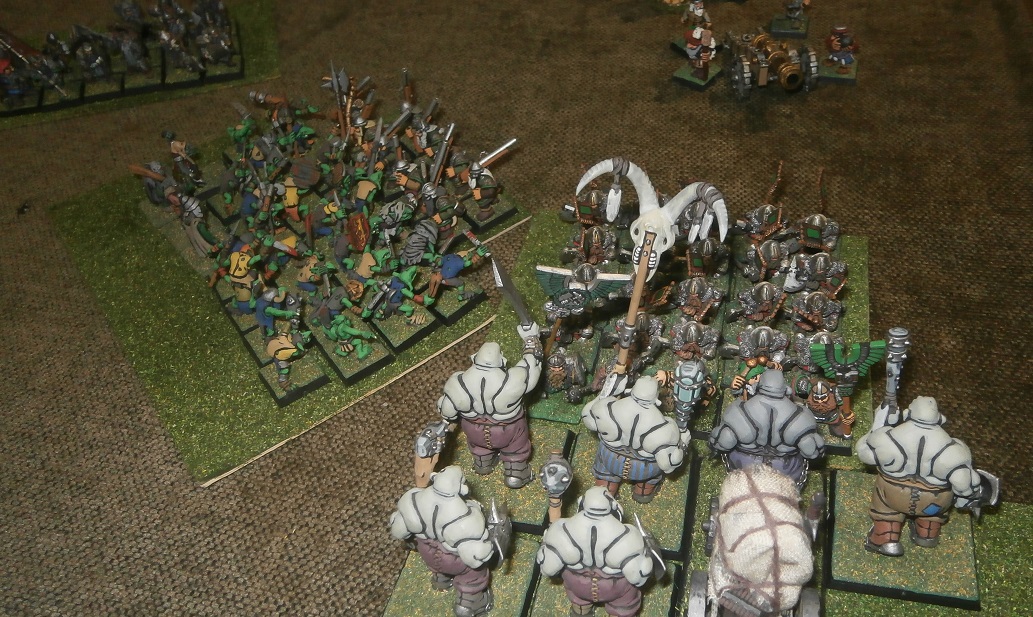
Neither Slaughtermaster could find it in themselves to summon sufficient magical energies to their bidding, and so it was left to the leadbelchers to fell another pair of longbeards. The combats were considerably messier than the shooting. Two dwarven warriors were fatally crushed by the mere impact of the bulls, then the ogres’ clubs broke the neck of another. Lord Narhak viciously bloodied the crusher in command of the bulls, causing him to reel away in pain, while Thane Bragdebreg and the other warriors also carved deep wounds. The bulls, more confused than fearful, found themselves unexpectedly halted. They would need to do a lot more to break through than they had bargained for.
The gnoblars failed even to scratch their tough-skinned, armoured foe, while the dwarves dispatched four of the greenskins. Perhaps because the bulls were still fighting at their side, and despite their usual cowardice, they too managed to fight on. (Game Note: Both units passed their Break tests.) This they immediately regretted, for the surviving longbeards now charged into their flank.
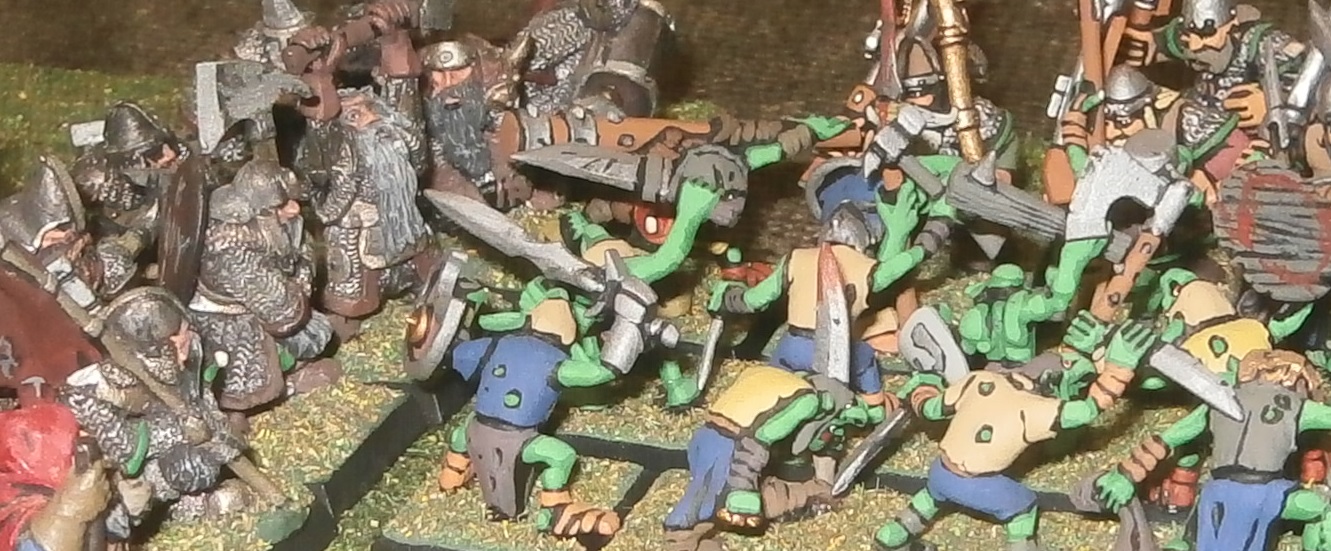
Knowing that Baron Garoy was watching the army’s flank from a little way behind them …
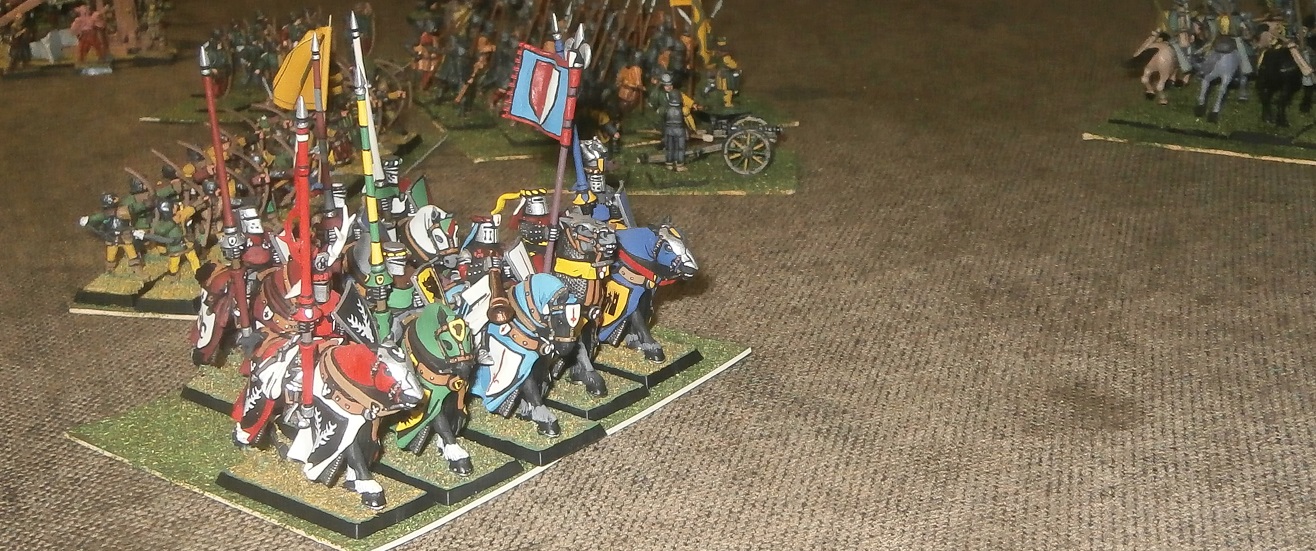
… the Brabanzon riders now spurred their mounts to carry them within bowshot distance of the bulls, coming very close to the ruinous walls to do so.
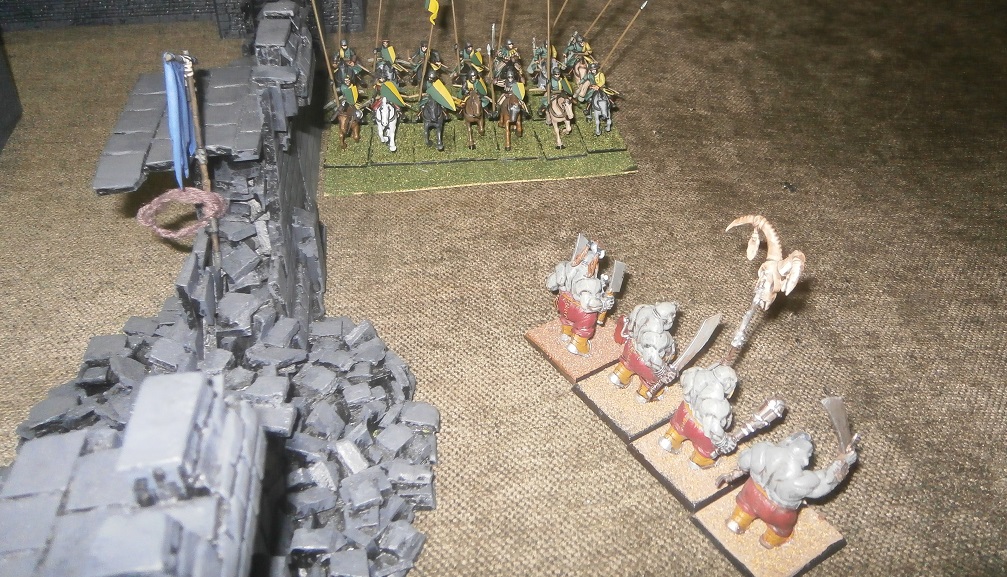
Both Slaughtermasters had spotted Perette amongst the Brabanzon foot soldiers …

… and both remembered the fire magic she had employed to during the first assault. Keen to avoid such casualties during this last, desperate sally from the walls, both chose to ignore Glammerscale and concentrate on thwarting whatever magic she intended to summon. Thus it was that dwarf wizard managed once again to settle a harmonic convergence onto the dwarf warriors, magically blessing their blade-work.
(Game Note: I know, I know … ‘dwarf’ & ‘wizard’ are not two words Warhammer players expect to see joined together, but the old model itself proves the concept is not entirely impossible. I had to come up with suitable rules for him. Of course, any dwarf army containing him does not get the ‘Natural Resistance’ dispel roll bonus, but this army would have lost this anyway by having the fallen damsel Perette on their side. He also struggles a little more than other with magic - each spell he attempts is +2 harder to cast than the standard casting value. Dwarfs are not natural wizards, so he has to try harder!)
Perette failed to conjure anything anyway, so the ogres’ caution was wasted. The attackers’ shooting, however, was quite impressive. One bolt killed a bull (Note: The player made his third snake-eyes panic test in a row here!), another tore deep into the chief slaughtermaster Wurgut. One of the cannons took down a maneater, while Granite Breaker felled another, and the dwarven crossbow killed a third! Even the Brabanzon riders stuck a few arrows into the enemy. All this damage left only one maneater, two bulls and the second Slaughtermaster in the centre of the field.
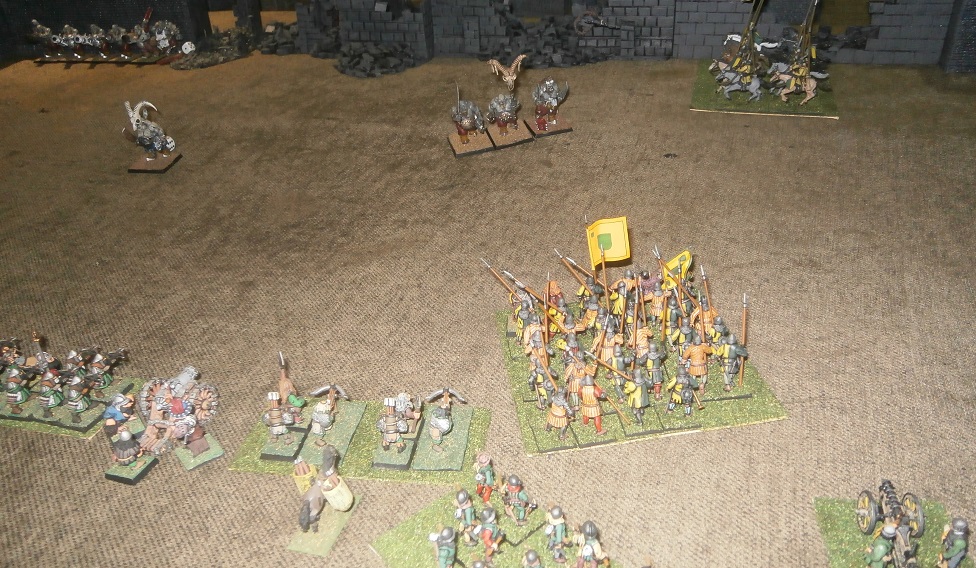
To the disappointment of its crew, the mercenaries’ light gun …
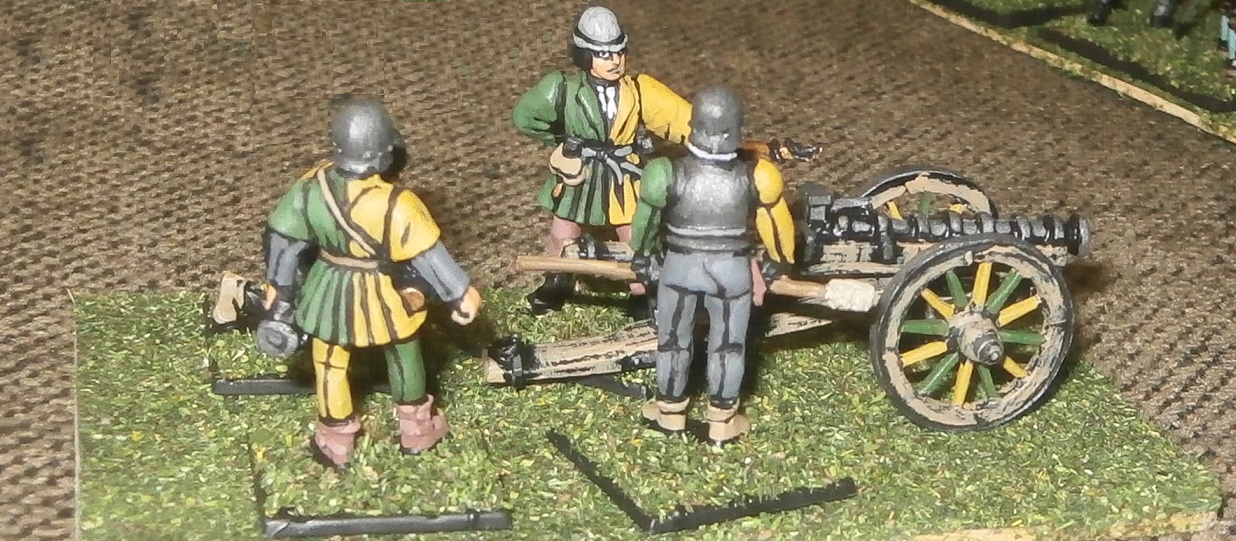
… merely buried its ball in the dirt.
The dwarves now hacked the gnoblars apart, and when the last few greenskins fled in terror, both dwarven regiments followed to finish them off and hit the bulls’ flank.
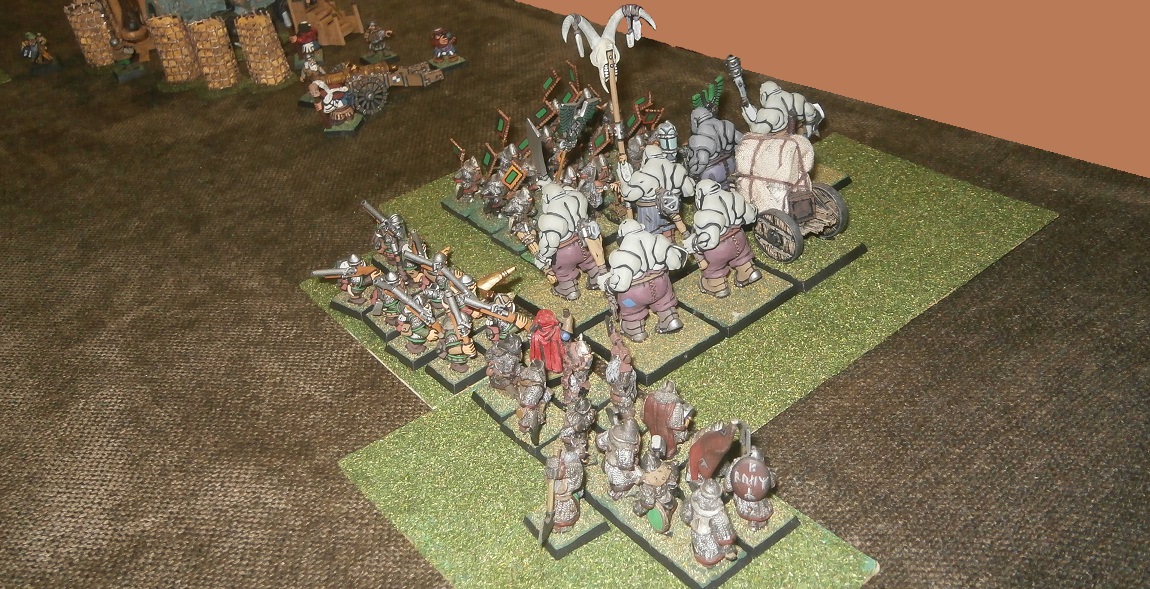
A bloodbath ensued, as Lord Narhak knocked the crusher’s brains out, Bragdebreg killed a bull by himself, and two more bulls were slain by the rest. Such was their prowess, luck and the skill of their shieldwall, that not one dwarf was harmed. The few surviving bulls knew full well to remain would be suicide, and so attempted to flee. They were pursued from the field by the Longbeards.
The threat from Sermide had been dealt with. The threat from Buldio had yet to arrive.
Turns 4-6 to follow.
The dwarven Longbeards, commanded by the Runesmith Rakric Bronzeborn, had already begun to move towards the city wall …

… when the ogre relief force from Sermide arrived upon the field, consisting of a company of bulls and a mob of gnoblars. (Game Note: Both relief forces rolled separately, 5+ to arrive on turn 2, 4+ on turn 3, and if still absent, an automatic arrival on turn 4)

Lord Narhak had expected them, and so he was ready. He, his warriors and his army standard bearer, the long-bearded veteran Thane Bragdebreg, had tarried as the longbeards moved away, and so now stood directly in the ogres’ way.

The leadbelchers inside the city, reassured by the fact that Granite Breaker had failed even to chip the defences (and happy to pretend they had not witnessed what its shot had done to the dwellings inside the walls) now ascended onto the parapet, there to be joined by the Slaughtermaster Wurgrut. To their left the Maneaters edged forwards through the rubble, all the better to snipe at the foe using their handgun-sized pistols, while the leadbelchers who had descended from the southern wall now moved out into the shadow of the corner tower.
Wurgrut, having spotted the arrival of the first relief force, now attempted to crush the bones of the dwarven thunderers close to the newcomers, but although his spell was cast, it did little more than make the enemy’s bones ache, while the energies that spilled from his over-hasty efforts hurt stung him and the leadbelchers at his side, and sloughed away what other energies the winds of magic could have provided for both him and his lieutenant. He cursed, partly at the pain of the injury he had received, partly at the frustration of fumbling his magical efforts, but mainly because cursing was his most common form of utterance.
Only momentarily distracted by their comrade’s wound, the leadbelchers on the wall with Wurgut blasted their barrels at the advancing Longbeards, cutting four down. Their success drew the maneaters’ and other leadbelchers’ interest, so that they too gave fire upon the same enemy regiment, but despite spewing great plumes of smoke, they failed to harm any more of the enemy. Rakric Bronzeborn took a puff upon his pipe, and uttered a single, entirely unnecessary, word: “Steady”.

The ragged mob of gnoblars drew close enough to hurl a varied collection of sharp missiles at the dwarven handgunners, killing one. While they whooped and squealed, the dwarves calmly continued making their pieces ready.
Lord Narhak now ordered his warriors to ‘march on’, towards the ogres. This was no charge, but rather an attempt to ensure that the bulls could not slip past the warriors while the gnoblars caused a distraction.

Slowly but surely, the dwarves moved so that the only way either gnoblars or ogres could get to the artillery pieces in the rear was to go through them. One amongst the warriors a drummer named Ringregur beat the steady call required for this manoeuvre whilst staring wide-eyed at the massive brutes ahead.

He had been recruited fresh for this campaign and had never seen battle before, apart from the occasional drunken brawl in the alehouses and halls he entertained in. He did not know it, but Lord Narhak had noticed his expression, recognising the trepidation it revealed. Even as the brute foe began their charge, Lord Narhak leaned towards the drummer and said, “Tough Audience.” Ringregur might have laughed had he had time to do so.
(Game note: I have to admit that as GM, note-taker and photographer, I thought the dwarfs were in a very bad situation. If the ogres got through they could sweep down the line destroying machine after machine before anyone else could get to grips with them, never mind actually stop them. The dwarven player, however, despite commanding an NPC force not his own, knew the capabilities of a dwarven unit with not one but two lords within it better than I, as well as what spells he planned to assist them, and he was confident. Time would tell.)
Glammerscale the wizard, standing between the quarrellers and the stone-filled gabions shielding Granite Breaker’s crew, could see what was happening on the left flank.

Having his most important books at hand, and tasselled bookmarks handily placed, he opened to a richly adorned page containing the bound spell Harmonic Convergence. With little more than a stroke and a word of command, he released the spell and so blessed the warriors for the fight ahead. Emboldened by this success, he turned to a much trickier page, for the spell there was described but not bound. He had studied this page deep into the night, and now read it aloud hoping to call down a comet from the heavens. For a moment he thought it had worked, but then he sensed the unlacing of the etheric winds by the enemy’s magicians, and the possibility was gone. He closed the book but, in hope, left the bookmark in its place.
While the thunderers arguably wasted good powder killing four gnoblars, one of the bolt-throwers injured a leadbelcher, while shots from the smaller cannons tore a bull in half and felled another leadbelcher. Granite breaker struck the last standing section of wall to visibly shake both it and the ogres upon it, which is why Wurgrut accompanied the leadbelchers off the wall to stand boldly upon the outside.

Now that the relief had begin to arrive, the ‘slaughtermaster-general’ did not intend to sit inside the walls as they were torn apart like the last time. Ahead of him, the other company of leadbelchers had already ventured some distance out …

… while to the other side the maneaters and bulls had also emerged from the ruinous walls.

As all these ogres came on, the relief force had already charged: the bulls smashed hard into the steel-clad dwarf warriors; beside them the gnoblars poured onto the much smaller body of dwarven thunderers, leaving five dead from the dwarves’ countershot.

Neither Slaughtermaster could find it in themselves to summon sufficient magical energies to their bidding, and so it was left to the leadbelchers to fell another pair of longbeards. The combats were considerably messier than the shooting. Two dwarven warriors were fatally crushed by the mere impact of the bulls, then the ogres’ clubs broke the neck of another. Lord Narhak viciously bloodied the crusher in command of the bulls, causing him to reel away in pain, while Thane Bragdebreg and the other warriors also carved deep wounds. The bulls, more confused than fearful, found themselves unexpectedly halted. They would need to do a lot more to break through than they had bargained for.
The gnoblars failed even to scratch their tough-skinned, armoured foe, while the dwarves dispatched four of the greenskins. Perhaps because the bulls were still fighting at their side, and despite their usual cowardice, they too managed to fight on. (Game Note: Both units passed their Break tests.) This they immediately regretted, for the surviving longbeards now charged into their flank.

Knowing that Baron Garoy was watching the army’s flank from a little way behind them …

… the Brabanzon riders now spurred their mounts to carry them within bowshot distance of the bulls, coming very close to the ruinous walls to do so.

Both Slaughtermasters had spotted Perette amongst the Brabanzon foot soldiers …

… and both remembered the fire magic she had employed to during the first assault. Keen to avoid such casualties during this last, desperate sally from the walls, both chose to ignore Glammerscale and concentrate on thwarting whatever magic she intended to summon. Thus it was that dwarf wizard managed once again to settle a harmonic convergence onto the dwarf warriors, magically blessing their blade-work.
(Game Note: I know, I know … ‘dwarf’ & ‘wizard’ are not two words Warhammer players expect to see joined together, but the old model itself proves the concept is not entirely impossible. I had to come up with suitable rules for him. Of course, any dwarf army containing him does not get the ‘Natural Resistance’ dispel roll bonus, but this army would have lost this anyway by having the fallen damsel Perette on their side. He also struggles a little more than other with magic - each spell he attempts is +2 harder to cast than the standard casting value. Dwarfs are not natural wizards, so he has to try harder!)
Perette failed to conjure anything anyway, so the ogres’ caution was wasted. The attackers’ shooting, however, was quite impressive. One bolt killed a bull (Note: The player made his third snake-eyes panic test in a row here!), another tore deep into the chief slaughtermaster Wurgut. One of the cannons took down a maneater, while Granite Breaker felled another, and the dwarven crossbow killed a third! Even the Brabanzon riders stuck a few arrows into the enemy. All this damage left only one maneater, two bulls and the second Slaughtermaster in the centre of the field.

To the disappointment of its crew, the mercenaries’ light gun …

… merely buried its ball in the dirt.
The dwarves now hacked the gnoblars apart, and when the last few greenskins fled in terror, both dwarven regiments followed to finish them off and hit the bulls’ flank.

A bloodbath ensued, as Lord Narhak knocked the crusher’s brains out, Bragdebreg killed a bull by himself, and two more bulls were slain by the rest. Such was their prowess, luck and the skill of their shieldwall, that not one dwarf was harmed. The few surviving bulls knew full well to remain would be suicide, and so attempted to flee. They were pursued from the field by the Longbeards.
The threat from Sermide had been dealt with. The threat from Buldio had yet to arrive.
Turns 4-6 to follow.
Lands Annex
Vassal
Another great passage to wake up to, still enjoying this enormously. Have a happy new year!
Padre
Lord
Thanks for the vote of confidence, Lands Annex. I am really excited for the campaign in 2019, so much planned - modelling & painting; characters & stories; & some big games hopefully. Real big.
-----------------------------------------------------------------------------------------------------------------------------------------------------------------
Turns 4-6
The Buldian relief force arrived just as the last Sermiden was chased away. This new force had no gnoblars accompanying them, consisting only of brute bull warriors with a bruiser in command. Like many ogre regiments of Border Princes’ origins, they wore spiked helmets and gut-plates, carrying huge swords in one hand while their other hands were enclosed in bladed gauntlets of steel.
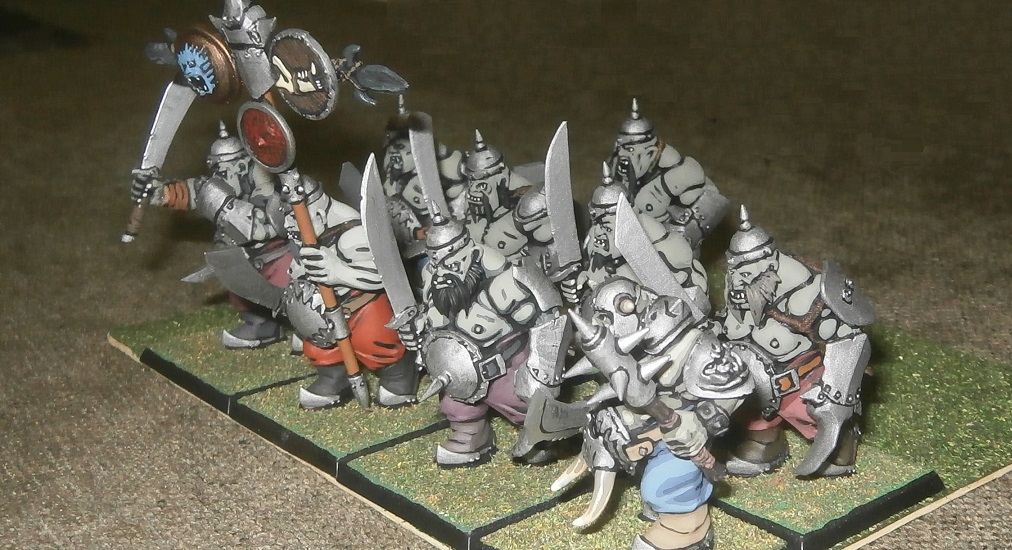
The bruiser had horns sprouting from both his gut plate and helmet, and he bore two weapons – an ugly, hooked blade and a very hefty iron club adorned with seven conical barbs. He led his company boldly onto the field, as if there were nothing at all to fear. The ogres’ arrival was so sudden, and they moved so quickly, that the young Baron Garoy and his knights, despite waiting with intent for just this occurrence, were taken by surprise, and found themselves unable to deliver their anticipated charge. It did not go unnoticed amongst several knights that the baron had hesitated, if only for the merest moment, and so failed to deliver a prompt enough command. The knights were now forced to turn about if they were to get to grips with the foe.
(Game Note: It was a charge arc issue. I suppose Damo had assumed the ogres would come on closer to the knights, rather than into what had appeared at the start of the game to be a killing ground before several missile units and engines – at that time an insane place to enter.)
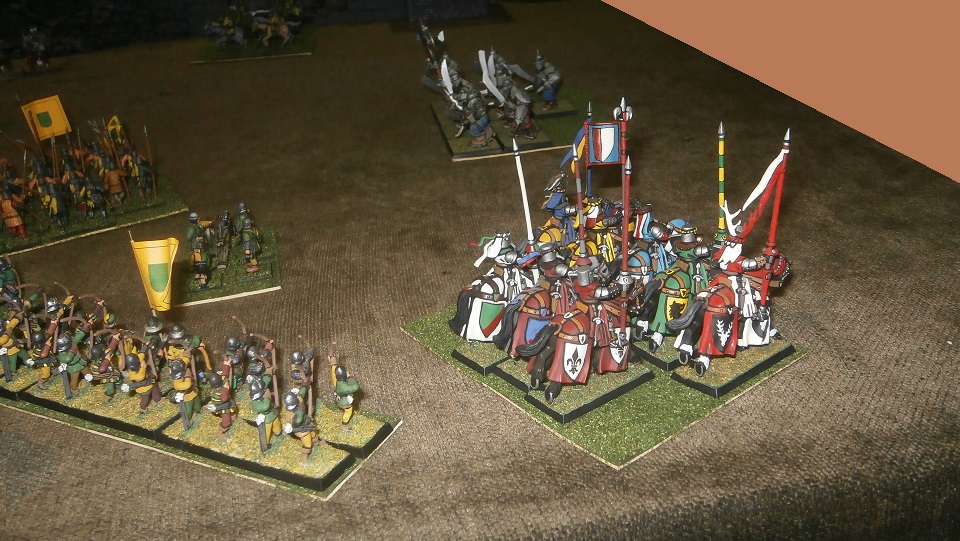
One brute upon the Buldians’ right flank was shouting something that none among the Brabanzon could understand. When he was answered in the same alien tongue by a shout from the second slaughtermaster with the last surviving garrison bulls, the soldiers knew exactly what was intended - both ogre companies would coordinate their charges to hit the Branbanzon’s spear-armed foot-soldiers from two sides at the same time. The soldiers were only real fighting body on that flank, apart from the momentarily disoriented knights, for all else were archers and the like.

Upon the far right of the ogres’ line the leadbelchers who had first emerged from the defences, despite having noticed the sparsity of surviving ogres elsewhere before the walls, and as yet unaware that the Buldian relief force had arrived, finally decided to risk a charge at the reformed dwarven handgunners. Their effort, however, was somewhat half-hearted, as if they merely wanted to appear willing before they looked instead to their own survival, and as soon as one of them fell to the dwarves’ perfectly executed volley, they turned and fled from the field and the city.
Their initial, apparently aggressive movement was noticed, however, and spurred the lone surviving maneater and the slaughtermaster with the bulls to have a go too. Neither managed to reach the enemy, instead slowing to a halt as they saw the unexpected flight of the leadbelchers to their right. Wurgrut was sufficiently flustered by what was unfolding before him that he fumbled his attempts at summoning a magical maw, losing control of his creation to harm only himself and his own ogres.
Too distracted by the newcomers, the Brabanzon failed to notice the garrison ogres’ discomfort. Baron Garoy finally brought his knights about so that they might deliver a charge, while the Brabanzon spearmen manoeuvred similarly so that they might receive one!

Perette had no intention of being caught in the imminent deadly mayhem, so she glanced around looking for somewhere safer to be. Spotting the brigand archers in the rear …

… she ran towards them - they were the sort of troops who could move quickly, avoiding trouble, which was exactly what she intended herself. She came to a halt between them and a basket carrying mule …
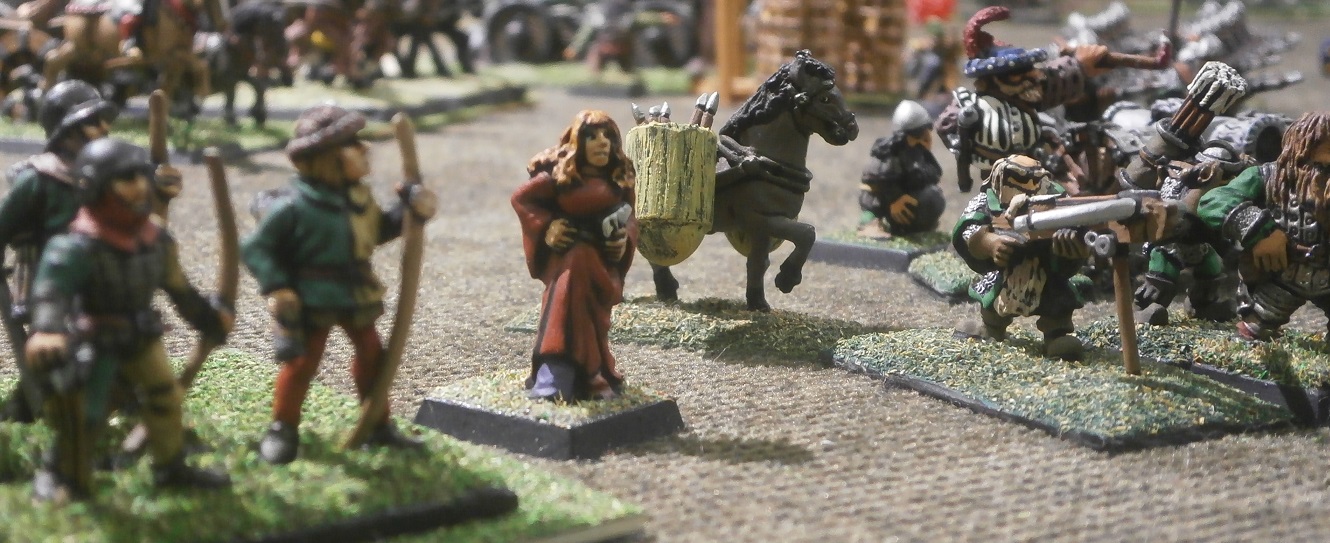
… and immediately set about attempting magic, but her desperate dash had left her distracted too, and her spells failed to manifest materially.
Bolt, bullet and arrow, both large and small, now came bursting from almost every part of the army of Karak Borgo. Granite Breaker’s mighty shot caused the last maneater to vanish in a red haze, and another leadbelcher fell dead, but much of the shooting was panicked and o’er hasty, especially from the Brabanzon, so that only two of the Buldian brutes fell.
The Brabanzon horsemen’s volley also had little noticeable effect, and they now became onlookers from their somewhat removed position before the ragged walls …
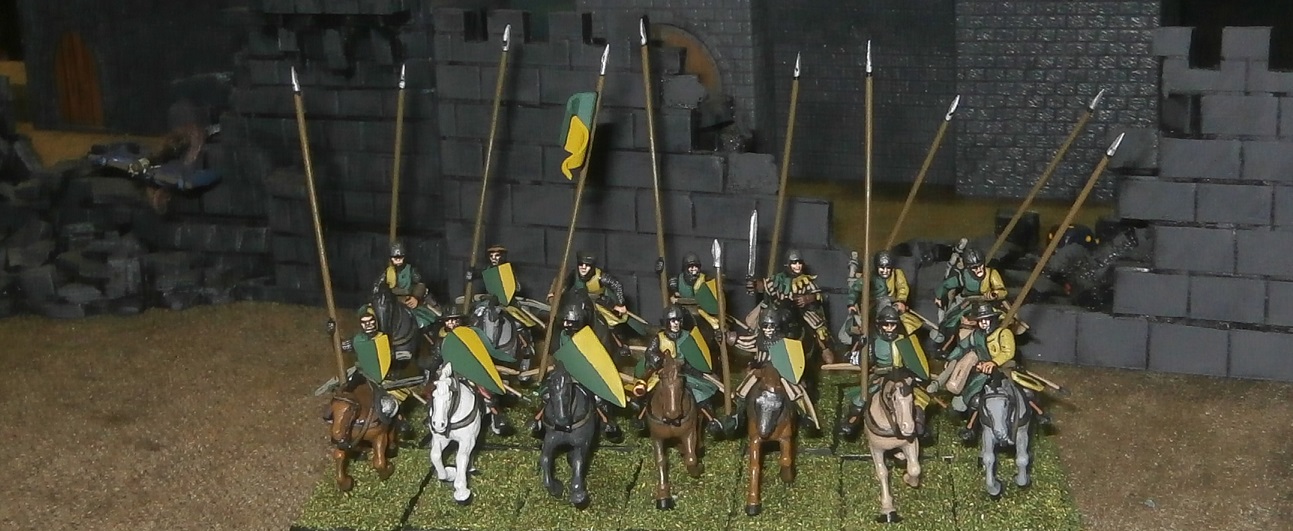
… watching as the Buldian brutes smashed into the front of the Brabanzon spearmen while the second slaughtermaster with the last bull hit them in the flank.
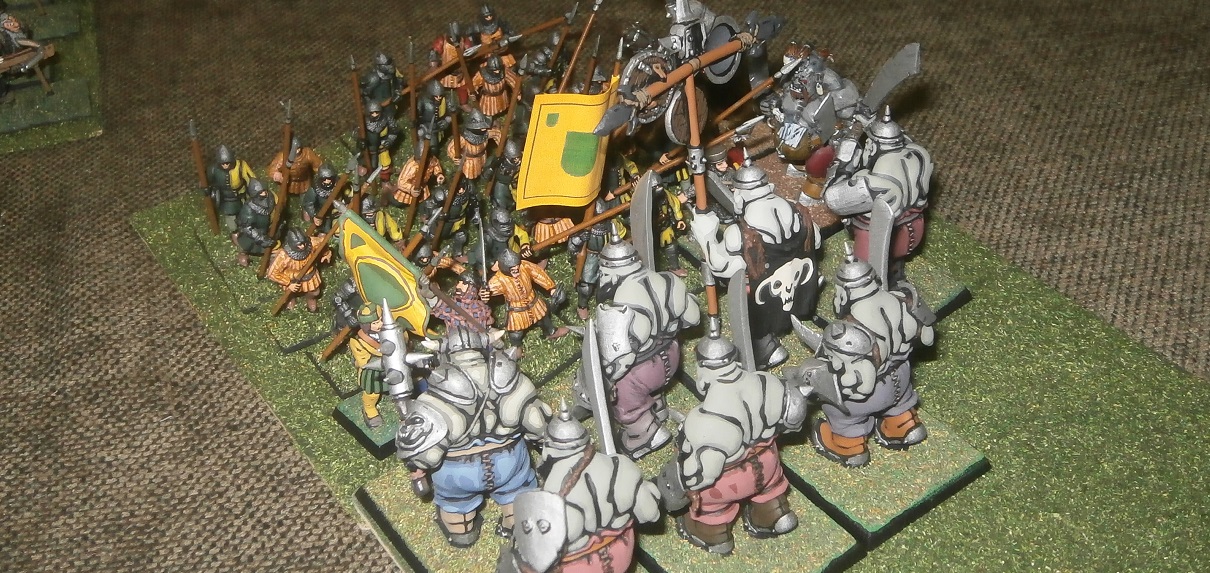
The Brabanzon footsoldiers were of good reputation, at least when it came to battle, if not for restraint when it came to plunder and pillage. Every man was a veteran of at least one war, and they were led by no less than their company’s commander, Captain Lodar ‘the Wolf’, with Jean de Salle, the company ensign, by his side. Yet despite all this, despite bracing themselves and presenting a neatly serried array of spear tips, they were not to prevail. Five died from the mere shock of the brutes’ impact, before even one blade had struck a blow. Captain Lodar was hewn in two, from left shoulder to right waist, and six more soldiers were similarly butchered. So smashed and shattered were the remainder, that they broke immediately. When the brutes came on they cut down and crushed umpteen more, so that the fighting heart of the Brabanzon, as well as their leaders, were gone. The Buldian bulls’ pace had hardly been slowed by this butchery, and they crashed into the dwarven crew of one of the bolt throwers.
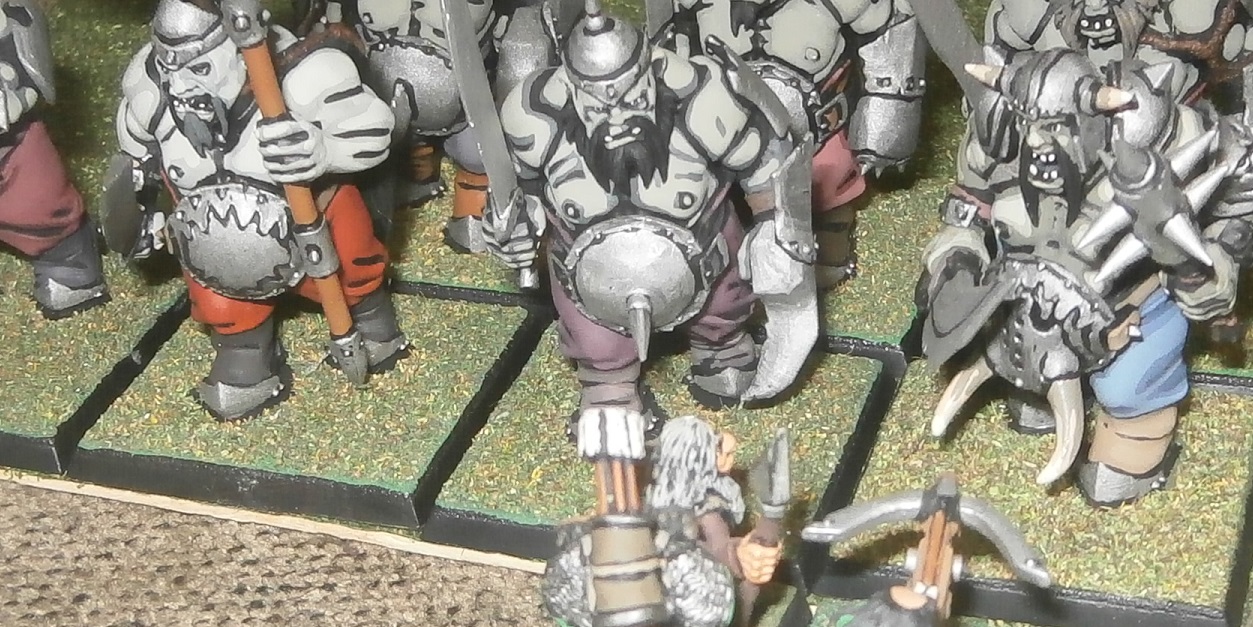
At last, Baron Garoy and his companions got to deliver the charge they had been yearning for, into the rear of the ogres.
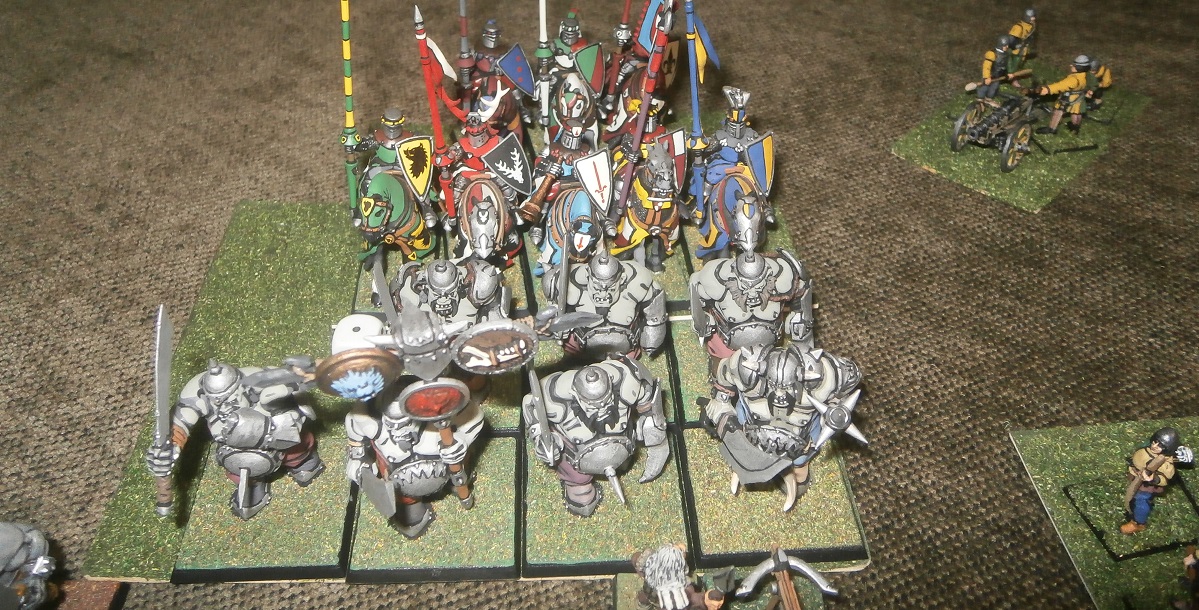
Baron Garoy himself took on the Bruiser, glad of his armour when the ogre’s giant club thudded into his shield and arm, bending the first and numbing the other. It was all he could do to stay mounted. One knight’s lance struck home, and took down a bull, but the ogres had quickly slaughtered the dwarven crewmen and all now turned to face the Baron Garoy’s company. The knights’ charge was over, their impetus spent, and more than one now wondered whether their one real chance had already passed.
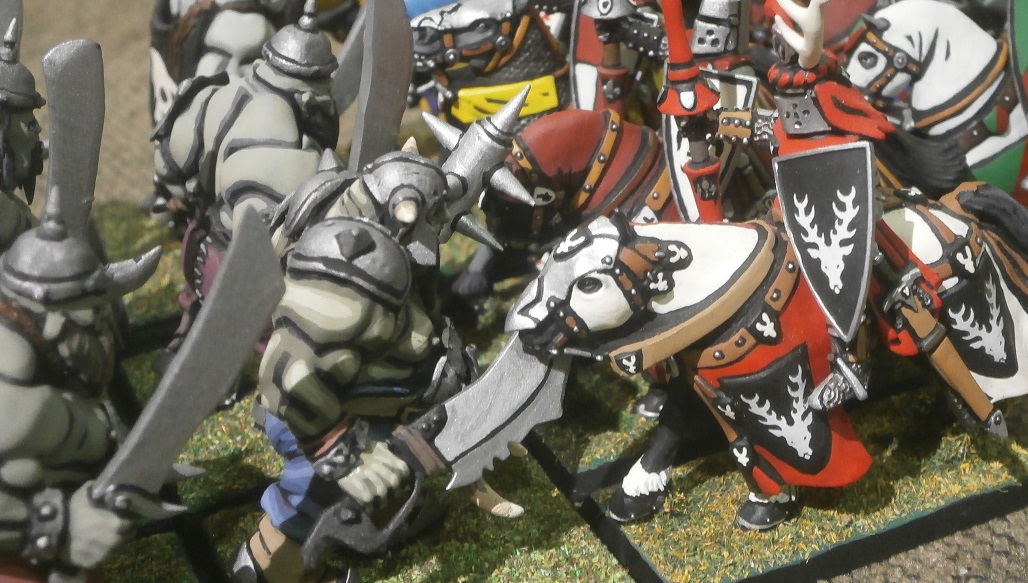
Moment’s before, Perette had seen an opportunity – the second slaughtermaster and the last garrison bull were before her, visible through a momentary gap appearing between the Brabanzon and dwarves.

Having caught her breath and regained her composure she could put all her mind to the task. The fireball she conjured singed her comrades on its flight, and upon striking killed the slaughtermaster and send the last Campogrottan garrison bull stumbling, smoking, choking forwards, only to be riddled with bolts from the quarrellers. Some of the bolts’ fletchings caught fire as he fell dead.
More of the of leadbelchers with Wurgrut fell, while he himself watched in addled fascination as one of Granite Breaker’s massive roundshots skipped off the ground before him to fly only an inch above his head. (Game note: Failed ‘Look Out Sir, but Ward save passed) He cursed, then cursed again for good measure, and although he could see there was still some sort of fighting going on to the enemy’s right, he knew to remain would be madness. He had no intention of dying today. He turned, pushing a leadbelcher to the ground to clear the way, and scrabbled over the tumbled masonry into the city.
The Buldian bruiser was grinning as he struck Baron Garoy again, almost exactly as before. This time the baron’s arm broke and the snapped bone inside dislodged from his shoulder. The force of the blow was too much for any human frame. Dropping his sword, his sight lost to him, he began to tumble from his saddle but was caught by the man beside him. Crying, “The Baron is wounded,” another grabbed his lord’s reins to lead him away. “Away” came another shout, which is exactly what the knights did, with the Buldian brutes pursuing.
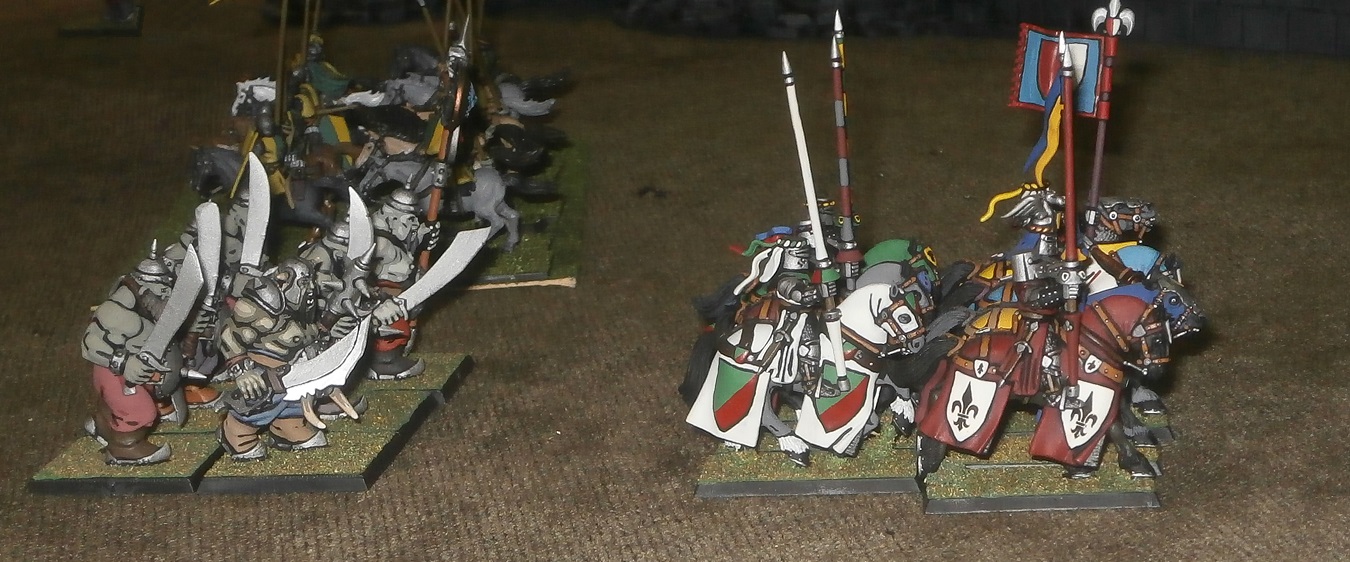
(Game Note: Apart from the Baron’s ‘death’ – he was not overkilled – not one other wound was unsaved in the combat. The knights lost their break test, but the ogres could not catch them. I know the baron was actually still alive, however, as I rolled on one of the campaign character injury tables, and death was not the result. Only overkilled characters don’t get the option of rolling on the chart.)
This left the Buldian bulls somewhat exposed. None of the garrison were to be seen, and the knights were too fast for them to reach. Longbowmen, brigands, horse archers, cannons and a bolt thrower surrounded them.
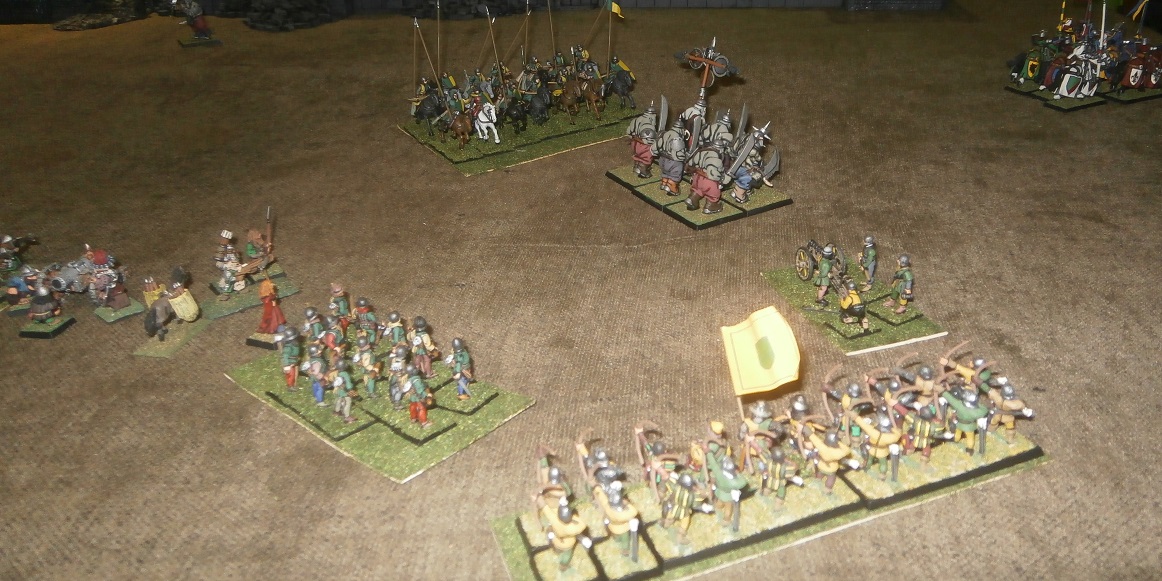
Perette’s next attempt at a fireball was of little effect – merely warming the brutes’ backsides as they slowed. She now watched …
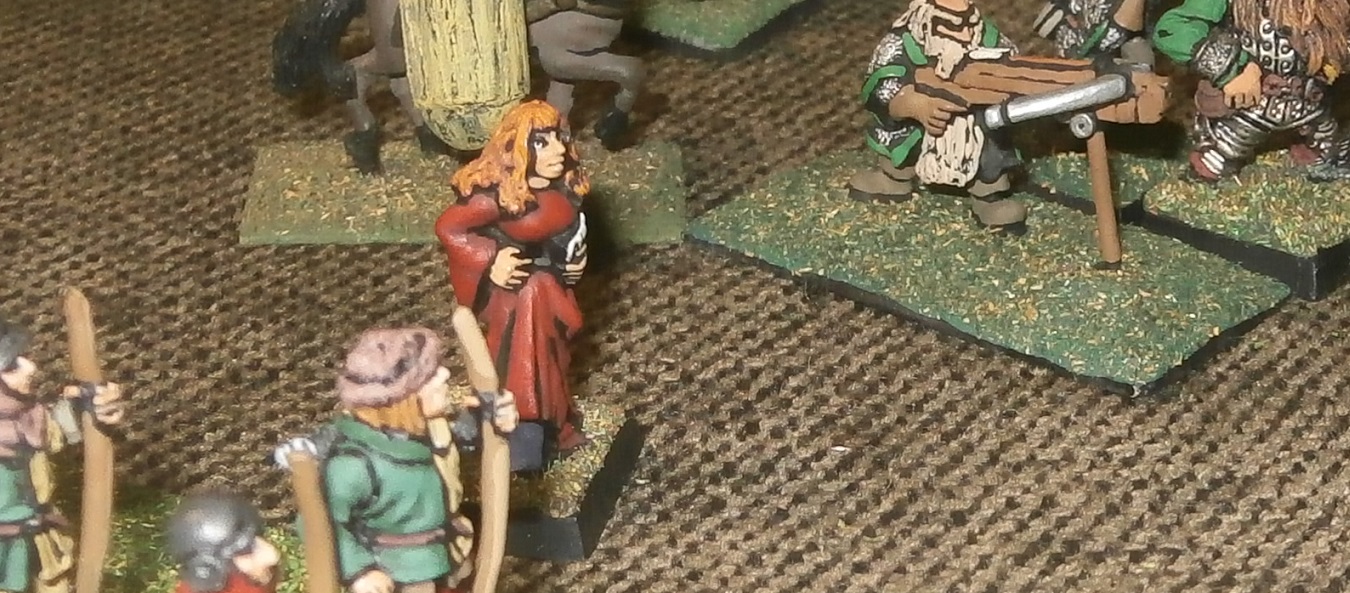
… as a storm of missiles lashed against the ogres. Two more of the brutes fell, leaving only three with the bruiser.

The bulls had no real chance of getting to grips with the foe, and they knew it. Any one of the enemy bodies surrounding them could easily move away, meanwhile the rest would whittle them down to nought if given the chance.
Game Note: Game over, end of turn 6.)
The bruiser growled, hurled his giant club towards the Brabanzon’s little gun, then ordered his men to follow him from the field.
Campogrotta had fallen. This was surely the beginning of the end of the ogres’ tyrannical rule of this northern Tilean realm. Razger had not returned home in time. Should he do so now he would find the dwarves and their mercenaries ready and waiting. Admittedly, the Brabanzon had suffered heavily, so that only their lightest troops remained intact, and had no commander at present to lead them, but the Compagnia del Sole was on its way, reputedly with a force greater than the dwarves’ current army. Considering the ogre forces remaining in the realm of Campogrotta were petty in size and scattered, Razger’s battered army could not hope to prevail.
Perette found herself in the unusual position of being asked by the brigand archers at her side what they should do now. They had personally witnessed her killing of the ogre shaman, and consequently their opinions concerning her had been transformed. As she pondered, Glammerscale joined her and told them the city had fallen, their work was nearly done.
“Just a matter,” he said, “of collecting your portion of the prize.”
He didn’t need to say anything more. The archers ran off, towards the city, along with every other Brabanzon still standing on the field, and as they clambered over the rubble, their shouts and whoops began to reverberate through the streets.
Game Notes:
Thanks Damo for commanding the attackers, as you have done for so many NPC armies. You have a detailed tactical understanding that has always eluded me. I am glad you too wanted to keep Perette and Glammerscale alive. And I agree, for some reason I too am more fond of the Brabanzon than the dwarves. What will become of them now that they have become merely a brigade of light missile troops? What will become of the fallen damsel Perette?
And thank you Jamie for allowing us to play a game which might have seemed a foregone conclusion but which in truth, had your relief forces both arrived on turn 2, or even together on turn 3, and had magic gone more your way, and if a few more of the enemy’s machines had misbehaved, this might have been a very destructive battle indeed for the attackers. It is only right, I suppose, that we played the game in which your own realm’s capital city was under attack. I bet everyone is now wondering where Razger is, and what the mysterious wizard lord Niccolo is up to. For now, only you and I know!
-----------------------------------------------------------------------------------------------------------------------------------------------------------------
Turns 4-6
The Buldian relief force arrived just as the last Sermiden was chased away. This new force had no gnoblars accompanying them, consisting only of brute bull warriors with a bruiser in command. Like many ogre regiments of Border Princes’ origins, they wore spiked helmets and gut-plates, carrying huge swords in one hand while their other hands were enclosed in bladed gauntlets of steel.

The bruiser had horns sprouting from both his gut plate and helmet, and he bore two weapons – an ugly, hooked blade and a very hefty iron club adorned with seven conical barbs. He led his company boldly onto the field, as if there were nothing at all to fear. The ogres’ arrival was so sudden, and they moved so quickly, that the young Baron Garoy and his knights, despite waiting with intent for just this occurrence, were taken by surprise, and found themselves unable to deliver their anticipated charge. It did not go unnoticed amongst several knights that the baron had hesitated, if only for the merest moment, and so failed to deliver a prompt enough command. The knights were now forced to turn about if they were to get to grips with the foe.
(Game Note: It was a charge arc issue. I suppose Damo had assumed the ogres would come on closer to the knights, rather than into what had appeared at the start of the game to be a killing ground before several missile units and engines – at that time an insane place to enter.)

One brute upon the Buldians’ right flank was shouting something that none among the Brabanzon could understand. When he was answered in the same alien tongue by a shout from the second slaughtermaster with the last surviving garrison bulls, the soldiers knew exactly what was intended - both ogre companies would coordinate their charges to hit the Branbanzon’s spear-armed foot-soldiers from two sides at the same time. The soldiers were only real fighting body on that flank, apart from the momentarily disoriented knights, for all else were archers and the like.

Upon the far right of the ogres’ line the leadbelchers who had first emerged from the defences, despite having noticed the sparsity of surviving ogres elsewhere before the walls, and as yet unaware that the Buldian relief force had arrived, finally decided to risk a charge at the reformed dwarven handgunners. Their effort, however, was somewhat half-hearted, as if they merely wanted to appear willing before they looked instead to their own survival, and as soon as one of them fell to the dwarves’ perfectly executed volley, they turned and fled from the field and the city.
Their initial, apparently aggressive movement was noticed, however, and spurred the lone surviving maneater and the slaughtermaster with the bulls to have a go too. Neither managed to reach the enemy, instead slowing to a halt as they saw the unexpected flight of the leadbelchers to their right. Wurgrut was sufficiently flustered by what was unfolding before him that he fumbled his attempts at summoning a magical maw, losing control of his creation to harm only himself and his own ogres.
Too distracted by the newcomers, the Brabanzon failed to notice the garrison ogres’ discomfort. Baron Garoy finally brought his knights about so that they might deliver a charge, while the Brabanzon spearmen manoeuvred similarly so that they might receive one!

Perette had no intention of being caught in the imminent deadly mayhem, so she glanced around looking for somewhere safer to be. Spotting the brigand archers in the rear …

… she ran towards them - they were the sort of troops who could move quickly, avoiding trouble, which was exactly what she intended herself. She came to a halt between them and a basket carrying mule …

… and immediately set about attempting magic, but her desperate dash had left her distracted too, and her spells failed to manifest materially.
Bolt, bullet and arrow, both large and small, now came bursting from almost every part of the army of Karak Borgo. Granite Breaker’s mighty shot caused the last maneater to vanish in a red haze, and another leadbelcher fell dead, but much of the shooting was panicked and o’er hasty, especially from the Brabanzon, so that only two of the Buldian brutes fell.
The Brabanzon horsemen’s volley also had little noticeable effect, and they now became onlookers from their somewhat removed position before the ragged walls …

… watching as the Buldian brutes smashed into the front of the Brabanzon spearmen while the second slaughtermaster with the last bull hit them in the flank.

The Brabanzon footsoldiers were of good reputation, at least when it came to battle, if not for restraint when it came to plunder and pillage. Every man was a veteran of at least one war, and they were led by no less than their company’s commander, Captain Lodar ‘the Wolf’, with Jean de Salle, the company ensign, by his side. Yet despite all this, despite bracing themselves and presenting a neatly serried array of spear tips, they were not to prevail. Five died from the mere shock of the brutes’ impact, before even one blade had struck a blow. Captain Lodar was hewn in two, from left shoulder to right waist, and six more soldiers were similarly butchered. So smashed and shattered were the remainder, that they broke immediately. When the brutes came on they cut down and crushed umpteen more, so that the fighting heart of the Brabanzon, as well as their leaders, were gone. The Buldian bulls’ pace had hardly been slowed by this butchery, and they crashed into the dwarven crew of one of the bolt throwers.

At last, Baron Garoy and his companions got to deliver the charge they had been yearning for, into the rear of the ogres.

Baron Garoy himself took on the Bruiser, glad of his armour when the ogre’s giant club thudded into his shield and arm, bending the first and numbing the other. It was all he could do to stay mounted. One knight’s lance struck home, and took down a bull, but the ogres had quickly slaughtered the dwarven crewmen and all now turned to face the Baron Garoy’s company. The knights’ charge was over, their impetus spent, and more than one now wondered whether their one real chance had already passed.

Moment’s before, Perette had seen an opportunity – the second slaughtermaster and the last garrison bull were before her, visible through a momentary gap appearing between the Brabanzon and dwarves.

Having caught her breath and regained her composure she could put all her mind to the task. The fireball she conjured singed her comrades on its flight, and upon striking killed the slaughtermaster and send the last Campogrottan garrison bull stumbling, smoking, choking forwards, only to be riddled with bolts from the quarrellers. Some of the bolts’ fletchings caught fire as he fell dead.
More of the of leadbelchers with Wurgrut fell, while he himself watched in addled fascination as one of Granite Breaker’s massive roundshots skipped off the ground before him to fly only an inch above his head. (Game note: Failed ‘Look Out Sir, but Ward save passed) He cursed, then cursed again for good measure, and although he could see there was still some sort of fighting going on to the enemy’s right, he knew to remain would be madness. He had no intention of dying today. He turned, pushing a leadbelcher to the ground to clear the way, and scrabbled over the tumbled masonry into the city.
The Buldian bruiser was grinning as he struck Baron Garoy again, almost exactly as before. This time the baron’s arm broke and the snapped bone inside dislodged from his shoulder. The force of the blow was too much for any human frame. Dropping his sword, his sight lost to him, he began to tumble from his saddle but was caught by the man beside him. Crying, “The Baron is wounded,” another grabbed his lord’s reins to lead him away. “Away” came another shout, which is exactly what the knights did, with the Buldian brutes pursuing.

(Game Note: Apart from the Baron’s ‘death’ – he was not overkilled – not one other wound was unsaved in the combat. The knights lost their break test, but the ogres could not catch them. I know the baron was actually still alive, however, as I rolled on one of the campaign character injury tables, and death was not the result. Only overkilled characters don’t get the option of rolling on the chart.)
This left the Buldian bulls somewhat exposed. None of the garrison were to be seen, and the knights were too fast for them to reach. Longbowmen, brigands, horse archers, cannons and a bolt thrower surrounded them.

Perette’s next attempt at a fireball was of little effect – merely warming the brutes’ backsides as they slowed. She now watched …

… as a storm of missiles lashed against the ogres. Two more of the brutes fell, leaving only three with the bruiser.

The bulls had no real chance of getting to grips with the foe, and they knew it. Any one of the enemy bodies surrounding them could easily move away, meanwhile the rest would whittle them down to nought if given the chance.
Game Note: Game over, end of turn 6.)
The bruiser growled, hurled his giant club towards the Brabanzon’s little gun, then ordered his men to follow him from the field.
Campogrotta had fallen. This was surely the beginning of the end of the ogres’ tyrannical rule of this northern Tilean realm. Razger had not returned home in time. Should he do so now he would find the dwarves and their mercenaries ready and waiting. Admittedly, the Brabanzon had suffered heavily, so that only their lightest troops remained intact, and had no commander at present to lead them, but the Compagnia del Sole was on its way, reputedly with a force greater than the dwarves’ current army. Considering the ogre forces remaining in the realm of Campogrotta were petty in size and scattered, Razger’s battered army could not hope to prevail.
Perette found herself in the unusual position of being asked by the brigand archers at her side what they should do now. They had personally witnessed her killing of the ogre shaman, and consequently their opinions concerning her had been transformed. As she pondered, Glammerscale joined her and told them the city had fallen, their work was nearly done.
“Just a matter,” he said, “of collecting your portion of the prize.”
He didn’t need to say anything more. The archers ran off, towards the city, along with every other Brabanzon still standing on the field, and as they clambered over the rubble, their shouts and whoops began to reverberate through the streets.
Game Notes:
Thanks Damo for commanding the attackers, as you have done for so many NPC armies. You have a detailed tactical understanding that has always eluded me. I am glad you too wanted to keep Perette and Glammerscale alive. And I agree, for some reason I too am more fond of the Brabanzon than the dwarves. What will become of them now that they have become merely a brigade of light missile troops? What will become of the fallen damsel Perette?
And thank you Jamie for allowing us to play a game which might have seemed a foregone conclusion but which in truth, had your relief forces both arrived on turn 2, or even together on turn 3, and had magic gone more your way, and if a few more of the enemy’s machines had misbehaved, this might have been a very destructive battle indeed for the attackers. It is only right, I suppose, that we played the game in which your own realm’s capital city was under attack. I bet everyone is now wondering where Razger is, and what the mysterious wizard lord Niccolo is up to. For now, only you and I know!
Padre
Lord
The Great Gathering
Prequel to the Battle of the Valley of Death
At long last an army capable of striking a deadly blow at the vampire duchess’s horrid hegemony of the north had assembled, and not a moment too soon for her foul forces had reached further south than ever before. Consisting of five armies from different city states, including a multitude of mercenaries, it was vast in size. Its soldiers hailed from all over Tilea and beyond - from Estalia, the Empire and even far-flung Cathay, with dwarf and halfling regiments as well as those of men. Their assembly spawned a sprawling camp, filling an entire valley in the wide, low hills west of Trantio. At the camp’s heart stood a massive tent, where the allies' council of war was about to begin.
Having traveled at the head of the last two armies to arrive, Arch-Lector Bernado Ugolini now made his way to that tent, accompanied by several of his Cathayan bodyguards. As he walked, he scrutinised the soldiers he passed to satisfy himself that there was indeed enough strength in the three southern armies already present to make his (about to be) proposed plan viable. In truth, he had expected more - the Verezzan and Luccinan contingents appeared to be significantly depleted in strength. Perhaps, he thought, they were divided and so also distributed elsewhere in the camp, but he knew this was unlikely for it not at all the usual practice. As the massive Portomaggioran army made up for any deficiency in numbers on the lesser realms' behalf, he did not let it worry him. Indeed, his spirits were sufficiently lifted to put a smile upon his face. The Tileans in the camp saw this as a sign of his pleasure, his happy blessing upon them, and respectfully made the sign of Morr as he passed. Even Myrmidia-worshipping soldiers knew which god to pray to when facing the undead.
Of course, his expression grew stern before he entered the command tent, for he knew full well that there was work yet to be done inside, and no guarantee of success. He had marched with enough conglomerate armies, either advising or commanding them, to know that it was never easy to reach a consensus concerning strategy. What with commanders from no less than five different states, several of whom did not merely distrust each other but had effectively been enemies until the dire threat of undeath had forced their cooperation, he expected the canvass walls to house a veritable cornucopia of conflicting concerns, incompatible priorities and discordant interests. More than this, there would most likely be disagreements between officers within the same army.
Passing Lord Alessio Falconi’s guards both outside and in …
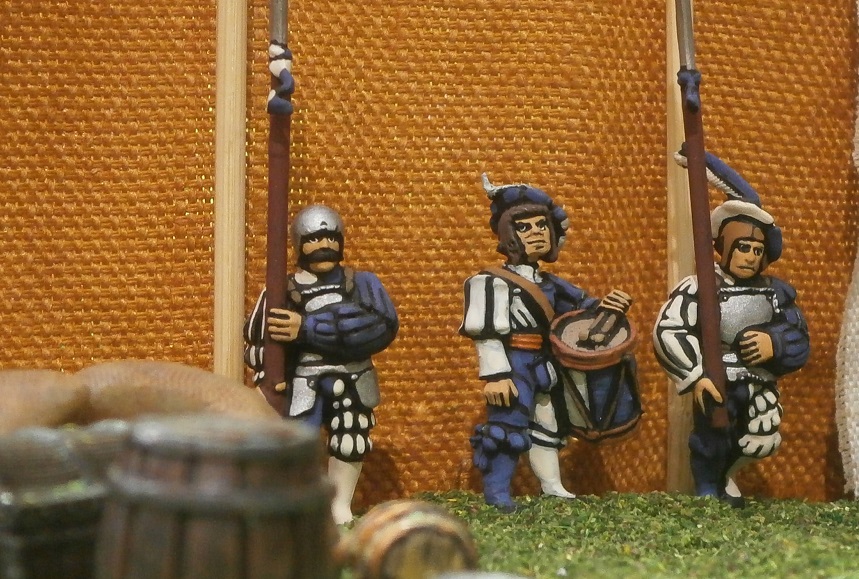
… he discovered a gathering of officers and their attendants around a central table. Lord Alessio of Portomaggiore was immediately apparent, standing beneath a painted, silken banner sporting his family’s golden falcon, with an eclectic collection of what must be his captains gathered around him. He was well known to have travelled widely, and it appeared he had brought some of those he had encountered back with him. Upon thinking this, Bernado had to suppress a new smile, for of course he himself was guarded by strangely garbed Cathayans.
The young Lord Silvano, whom Bernado knew very well indeed from their shared adventures and who had rode with him from Remas, was already in attendance, liveried in Pavonan blue and white, and as such identical to the blue and white of Lord Alessio’s army. Some childish remnant lurking in the corner of Bernado’s mind wondered whether this was perhaps a sign that the two armies would work well together?
No doubt some of the others were from Verezzo and Luccini, but Bernado could not see the young King Ferronso amongst them, nor his good friend from youth, the philosopher Lord Lucca of Verezzo. Perhaps they had yet to arrive? What could possibly delay them, considering their armies had reportedly marched alongside the Portomaggiorans, he knew not. Perhaps their absence had something to do with the small numbers of their soldiers outside? As he took his allotted place, a place of honour to the right of the allied armies’ effective captain-general, Lord Alessio, he presumed all would become clear, momentarily.
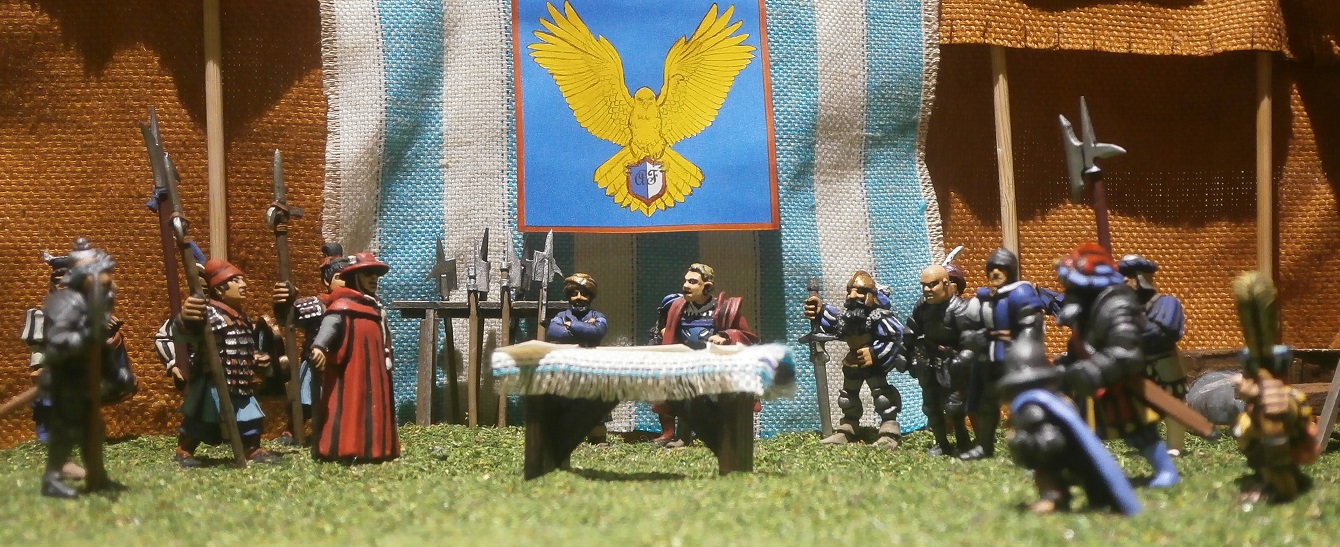
Many amongst the officers made the sign of Morr, and Bernado acknowledged them graciously by lifting his hand in a sign of blessing and saying a brief prayer in the ancient tongue of Tilea. Appropriately, it was the captain general, Lord Alessio who then spoke,
“Your holiness, you are most welcome. I think I speak for us all when I say we are mightily reassured by your presence amongst us, especially in light of the task that now faces us. May Morr protect us in the fight to come.

Bernado did smile now. “And I am most happy to be here with you, captain general, for here at last, it seems to me upon my first impression, is gathered an army sufficient for the work of eradicating the vampires’ evil from Tilea. Morr’s blessings are most assuredly to be poured upon this army.”
“We are most happy too that you brought Lord Silvano with you,” said Alessio, bowing slightly to the young Pavonan lord, who returned the gesture. “Though I have to ask, where is Duke Guidobaldo?”
“My father felt it was his duty to return home,” said Silvano. “Our city currently lies unprotected, a state of affairs that cannot be allowed to continue now that the tyrant Boulderguts has slipped from our reach and the vampire duchess’s army is so close.”
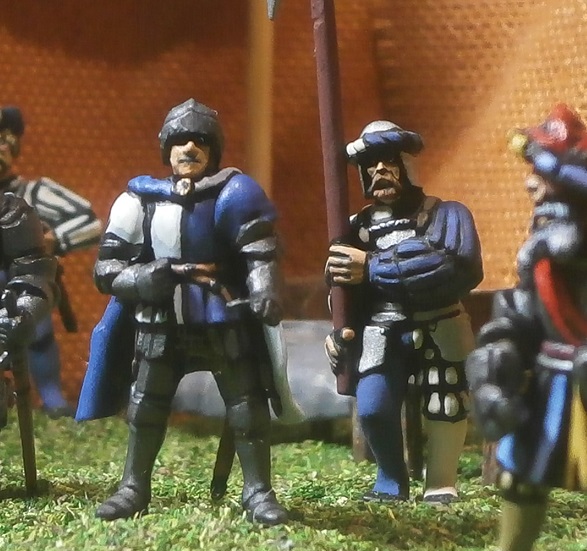
“Ah yes,” said Lord Alessio. “We marched north in the hope of defeating Boulderguts once and for all, to prevent his further devastation. Indeed, I fashioned this army with the brutes in mind. Now we are faced with a quite different foe. Pray tell, my Lord Silvano, if your father took leave with his army, what command is left to you?”
“My father has fully honoured his commitments, taking only our horse soldiers and a newly raised regiment of Reman bravi. I now command our guns and household foot soldiers.”
“So he left behind only that which would slow him down as he went home,” muttered a grizzled, old soldier, heavily bearded and heavily armoured, wearing the yellow and blue of Verezzo.
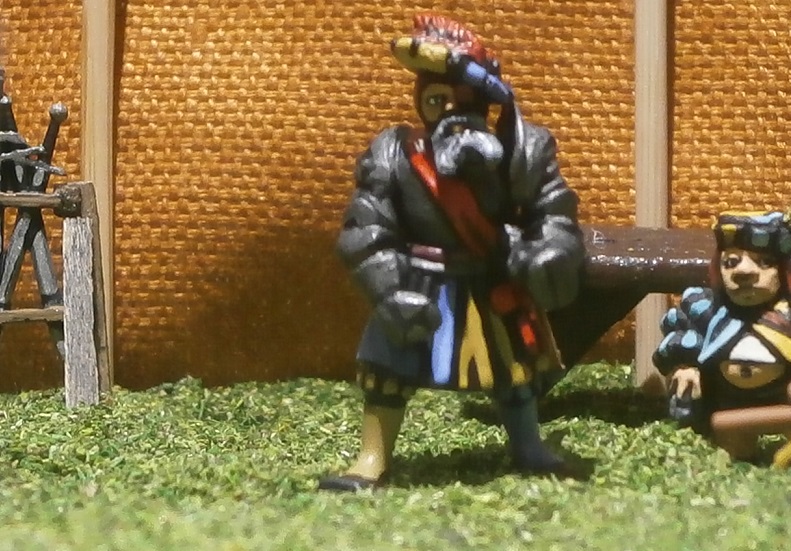
Lord Silvano showed no sign of displeasure at this disparaging remark. Bernado had noticed that since the brutal blow to the young lord’s head at Via Diocleta, Silvano had suffered more than merely physical consequences. One of his eyes was now fashioned of glass, and he looked somehow older than his years. More noticeable, perhaps, was his distant nature, as if he were at one remove from that which occurred around him; as if, as one of the Reman priests had put it, he had taken ‘a step closer to death’. Here now, when many others would have reacted angrily to such a comment, the young lord exhibited an absence of any emotion.
“My father left me with exactly that best suited for an assault upon the walls of Trantio,” explained Lord Silvano.
Bernado nodded. “More than that, my lord, your father removed from our city those left unemployed by the fall of so many noble houses during the recent unrest. Such men could have proved most troublesome to us had they not been given new purpose. I am grateful to your father for this, and that the soldiers he left under your command are veterans who have proved themselves several times over in this war. I for one would never criticise Duke Guidobaldo’s desire to care for the well-being of his people.”
He glanced at the Verezzan captain to gauge the man’s response, but the fellow was an old veteran, an Empire mercenary by the looks of him, and simply looked on as if nothing of consequence had happened. Bernado supposed such a man would have faced such horrors during his life as a soldier that he would barely register a little awkwardness in conversation. Bernado noted, however, the comment had revealed there was still antipathy between Verezzo and Pavona, born of Lord Lucca’s allegedly tardy rejection of Duke Guidobaldo’s niece as a wife for his son. For some time, Bernado suspected Duke Guidobaldo had engineered the perceived slight to serve his own purpose (being to conquer every city-state neighbouring his own) each time claiming some matter of honour or revenge as his motive. Whether this were true or not, the bad feeling engendered between the two states was apparently still felt.
Bernado now addressed Lord Alessio, “I must ask, captain general, where are King Ferronso and Lord Lucca?
Lord Alessio gave only the hint of a frown, but several other officers noticeably glanced at each other, both acknowledging and revealing their general disquiet.
“They have also left a portion of their forces under my command,” Lord Alessio answered. “And indeed, like the good duke, saw fit to ensure that those forces were of the kind useful in an assault. Might I introduce Barone Iacopo Brunetti of Poliena, commanding the Verezzan brigade …”
Here Bernado thought Alessio was gesturing towards the mumbling Verezzan captain, but then realised there was a halfling standing by the man’s side, who now bowed.
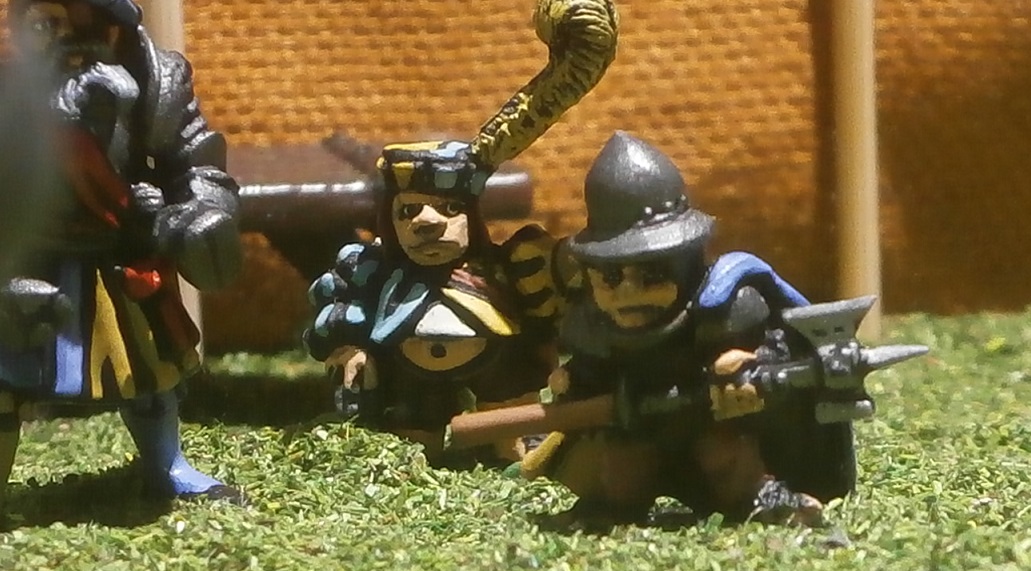
The little barone sported a heavy iron helmet and clutched a polearm in both hands. Behind him was another halfling, an archer liveried in the yellow and blue of Verezzo.
" ... and Captain Muzio Vanni." This time he did indicate the plain spoken Verezzan. Then he turned to address another, "And this is General Marsilio da Fermo, commander of the Luccinan brigade.”
General Marsilio was another old soldier, almost white haired, in full, unadorned plate armour. He leaned upon a great battle axe of an archaic design, its haft almost as tall as him.
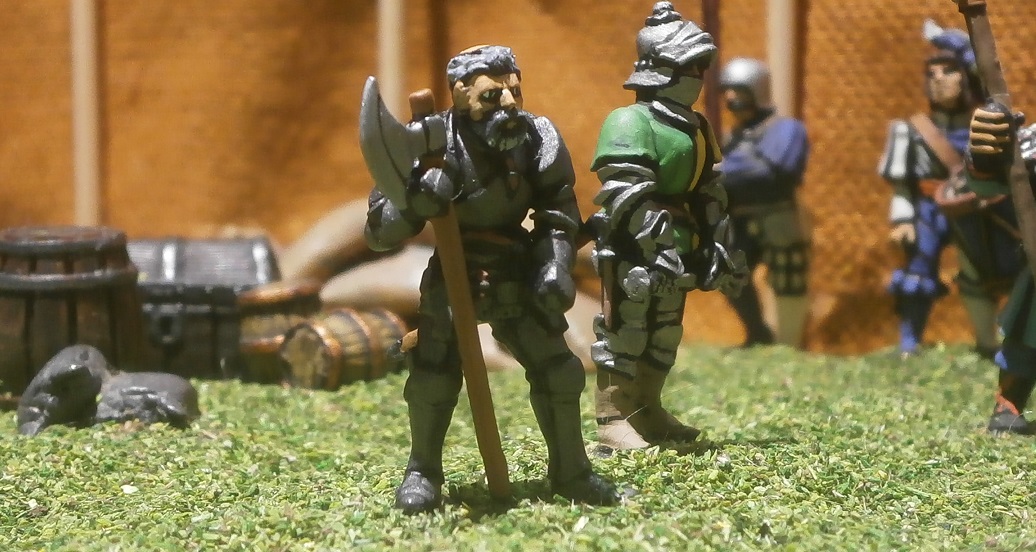
“Your presence, Barone Iacopo and General Marsilio,” said Bernado, choosing not to mention the captain by name, “as well as that of those you command, pleases me greatly. But I must ask again: where are your masters?”
“Blame the Sartosan scum for my king’s absence,” said General Marsilio. “Their love for gold means they care nothing for the living of Tilea. To them, this war merely presents an opportunity to raid the coastal cities whilst our armies are busy elsewhere.”
Bernado had heard the rumours of increased Sartosan activity in the Pirate’s Current, and of some northern seaman named Volker who was attempting to unite them. “The King has returned to Luccini then?” he asked.
“Aye, but unlike Lord Silvano, he has left me with little more than a single regiment to command,” said the general, sounding embittered. And well he might, thought Bernado, for the rank of general sat ill alongside command of one regiment.
“And a great gun,” said Lord Alessio.
“Aye, a single piece,” said the Luccinan with unconcealed contempt.
It occurred to Bernado that the young king might have been glad, at least, to leave his general behind, for the fellow did not seem to care about mincing his words and youthful monarchs often had a certain fragile pride about them.
“Then the pirates are to blame,” declared Bernado, “and not King Ferronso. He cannot be expected personally to fight this foe while his people are being ravaged and robbed by corsairs.”
General Marsilio acknowledged the arch-lector with a nod. Bernado turned to the halfling.
“Barone Iacopo, I was looking forward to meeting again with Lord Lucca. I can only presume he too has other concerns?”
The halfling’s voice, like most of his kind, was somewhat lilting, and in tone like that a of youth.
“A great many, your holiness. They weigh upon him heavily. If you would oblige?” asked the halfling as he gestured for a servant garbed in a flamboyant hat and carrying a polished brass horn, to come up. Bernado nodded his assent, and the courtly youth stepped forwards, unravelled a paper and began to read:
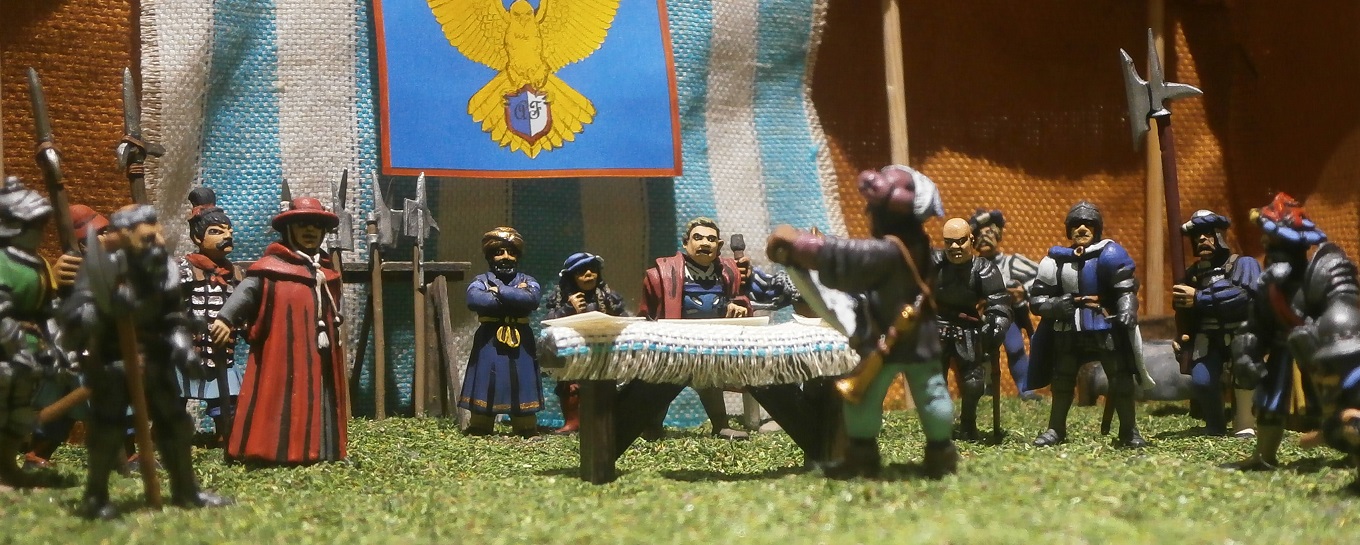
“This to his Holiness Bernado Ugolini, the righteous right hand of Morr, from your old friend Lucca. I pray you are well, and that your dreams treat you kindly. My heart is heavy with the knowledge that I shall not be with you before Trantio, and it pains me that you might think the less of me for it. Not willing to ask another to make excuses upon my behalf, I would by this missive explain myself to you, and all those with you who are to face the foul army threatening every Tilean realm. I know full well that the fate of every living Tilean hangs in the balance, and yet I cannot ignore the responsibilities of rule and the love and protection I owe my people. None presently know Razger Boulderguts’ whereabouts, but it seems to me that the brute most likely intends to circumnavigate the great allied army in order to attack the south. He has performed just such maneouevres before, and despite defeat at your hands went on to lay waste to Ridraffa. Furthermore, there are reliable reports of a large band of greenskins this side of the mountains, sufficient in strength to extract a ransom from the Pavonan town of Scozzese. Knowing that you are bringing the armies of both Remas and Pavona to join with the Portomaggiorans, and that I have left with you all that is of real use in the assault to come, thus fashioning an army entirely capable of victory in the struggle ahead, I feel that the only course of action open to me is to return to Verezzo to do what I can to keep my subjects safe from these other threats. Furthermore, it seems to me that were the rumours of an alliance between the vampires and brutes true, then it would be remiss to leave the allied army’s rear unguarded, so that Razger could launch an attack to relieve Trantio. My soldiers can guard against just such a move.
If I were a proud man, I would have stayed, but I am justly humbled by my duty to my people, obliged to accept sound reason, and beholden to taking the best course of strategic action. When it comes to the safe future of Tilea, however, I am yours to command, and so if I have chosen wrongly, then simply say so and I will return immediately. Ever your servant, and always your friend, Lucca Vescussi, Lord of Verezzo.”
Bernado dismissed the servant and thanked the barone. “I do not doubt Lord Lucca’s sincerity,” he declared, “for I know him to be as honest as he is wise. However, I was led to believe the army of the VMC is also marching north to aid us in our war, and by way of Verezzo. Would they not be of use in defeating any brutes and goblins attempting to outflank us?”
“In his wisdom, my master did take the VMC into account in his deliberations, your holiness,” said the barone, “but not as a reassurance, rather as a further cause for concern. He does not yet trust them, which in truth made for another reason to return home.”
Bernado could not argue against his old friend’s suspicions, for he himself did not know whether the Marienburgers were to be trusted. An army ruled by merchants was an unusual thing anywhere in the world, certainly in Tilea, and nothing the VMC had so far done proved their intentions harmless. They had offered protection to Alciente, and now they ruled it. They promised to fight Khurnag’s Waagh, and now they ruled all that they took from his forces. They had swallowed up Capelli without a fight, simply because the town knew it could not defend itself against such force. And it was their soldiers who had thought to interfere somewhat unhelpfully with Raverno’s self-inflicted troubles by razing the contado of Camponeffro. There was even a rumour that the VMC had hired mercenary bands of goblins. Mind you, similar tales were told of Lord Alessio, so one could not single out the northerners on this account.
Suddenly the Verezzan captain spoke again. “Nor did our master wish to fight alongside the Pavonan duke.”
The halfling looked askance at his companion. “Not so, Captain Muzio,” he was quick to counter.
“Aye, maybe you’re right,” said the captain. “If it was one of Lord Lucca concerns, I’m sure it was very low on his list.”
One of Lord Alessio’s officers, a bald, fierce looking man in full plate leaning upon his sword like a cane, snorted in laughter at this.
Lord Alessio did not rebuke the man. Instead saying,
“No matter. Even if true, we must put such petty animosities behind us, for the enemy threatens every Tilean. Like you yourself said, your holiness, and it seems Lord Lucca also believes, we have a force entirely sufficient for the task in hand. So now, shall we proceed with formulating our plan of attack? I would know first what powder each army has available, for the walls of Trantio are strong and will take require much battering if we are to breach them. My lord Silvano, were the walls breached during your father’s war against Prince Girenzo?”
“They were, captain general, but they were fully repaired during our occupation of the city. I myself oversaw the commencement of the work, and received a report when it was completed, a matter of weeks before the ogres came. I do not believe the walls were in any way dismantled during the subsequent withdrawal from the city.”
“You mean the flight from the city, after your soldiers stripped it of everything of worth,” said Captain Muzio.
Bernado had had enough of this man. “I suggest you hold your tongue, captain,” he said firmly, noticing the concern writ upon the faces of nearly all gathered, not least the captain’s nominal commander, the halfling Barone Iacopo. “If all you have to offer is accusations concerning Duke Guidobaldo’s past actions, then it seems to me you are of little use to this council.”
“I shall speak no more of it, your holiness,” said the captain. “And I apologise to all concerned for my o’er hasty words.
The young Pavonan lord’s face showed nothing but indifference. If he had noticed the formality of the apology, perhaps revealing its superficial nature, he gave no sign.
Bernado, not for the first time, wondered why - as ever in Tilea – a tangle of complications invariably threatened to imbue any alliance with an intrinsic fragility. Already, several, substantial absences meant this great army, large as it was, was nevertheless a much-reduced version of its potentially massive size. And now those officers remaining were exhibiting their mutual distrust, before a plan had been even been discussed. He had learned the hard way that every commander in a composite force such as this had his own priorities, fears and desires, his own different plans concerning how to achieve victory. Even their ideas of what constituted victory varied. Despite these concerns, he knew he himself was about to be guilty of exactly the same sort of contrariness. Still, what needed saying must be said, so he turned to Lord Alessio,
“Before you proceed, captain general, I would speak of my own concerns, for they will bear heavily upon the plans we make here.”
For the merest moment, Lord Alessio looked perplexed. But it did not last. Perhaps, thought Bernado, his own bitter experiences meant the captain-general recognised the inevitable nature of the game they were now playing?
“Of course, your Holiness,” said the captain general. “I greatly value your guidance. We all do.”
The easy acceptance and subtle flattery of this comment did make Bernado wonder about the man’s sincerity - this was not the first time he had detected Lord Alessio’s clever combination of both business and courtly skills.
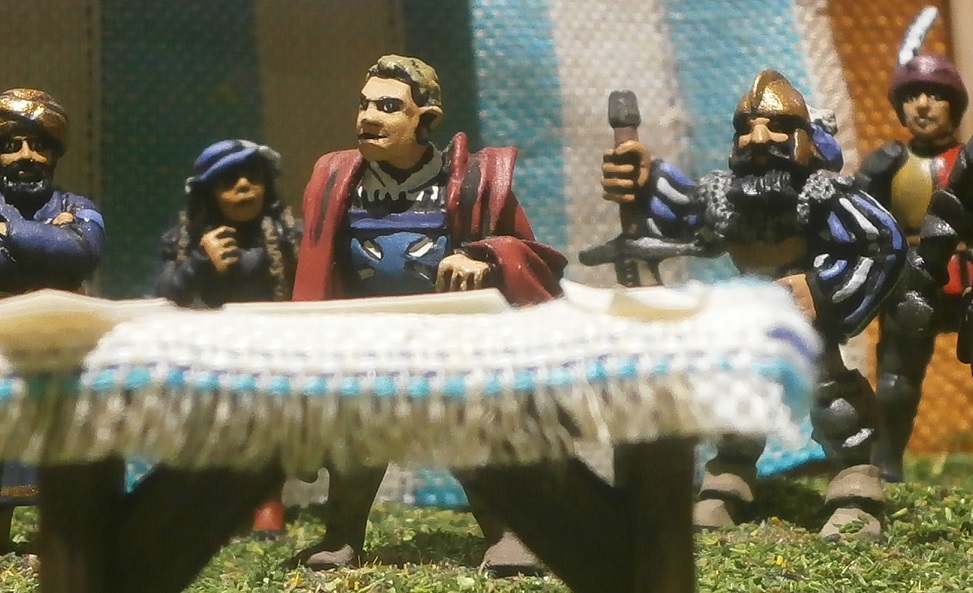
Such skills would serve him well in the juggling act of commanding such an army as this. Bernado was counting on him possessing a similar talent for strategy.
“Know that what I am about to suggest comes from my own bitter experiences, not simply from prayerful contemplation,” Bernado began. “I sometimes feel I have been more a soldier than a churchman. I fought with the holy peasant-army of Viadaza against the vampire duke at the Bridge of Pontremola. Against the odds, perhaps, victory was gained, for by the hand of one man - General Urbano D’Alessio, may he find blissful rest in the garden of Morr - the vampire duke was slain, and his army faltered. Nevertheless, they escaped in force, and in all likelihood became the core of the vampire Duchess’s army. Worse than that, despite a victory bought dearly with the blood of many, the city of Viadaza was captured by the undead the very next day when Lord Adolfo revealed himself to be a vampire. I was also amongst the army that recaptured Viadaza, along with Lord Silvano here, only to watch as the vampire Lord Adolfo escaped with his foul servants to attend his cruel mistress. Only recently I fought at the Via Diocleta, where the joint armies of Remas and Pavona drove the tyrant Boulderguts from the Remas. This too was called a victory, for Boulderguts was prevented from reaching the holy city. But then he marched on to raze Ridraffa to the ground, and to escape northwards in command of a significant force and hauling a vast train of loot stolen at such a cost in lives. Now he presents more than a potential thorn in our side, for he could yet, with perhaps minimal reinforcements, bring ruin to many more cities.”
Bernado fell silent here for a moment, to let the miserable truth of what he had just said, how three of the greatest victories achieved in recent years had ultimately proved fruitless, sink in. He could not help but look at Lord Silvano, who was wounded at Via Diocleta, but again saw only the same detachment. The rest waited in anticipation to hear why he was telling them this.
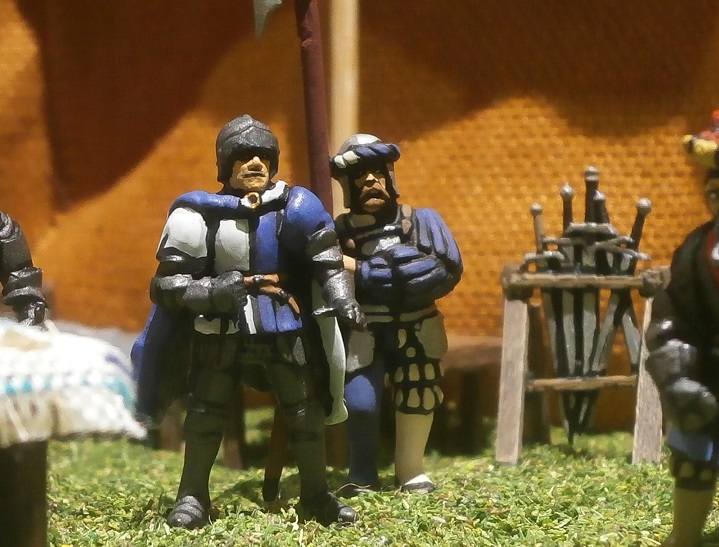
“I will not allow another great sacrifice to be made, the deaths of thousands, so much suffering for so little gain. The foe must not be allowed to escape from Trantio, to rally elsewhere. This time the enemy must be annihilated. Even if they flee the city, they must be caught and destroyed. Not one, single, foul servant can be allowed to return north to the vampire duchess.”
He paused again, to judge the reaction of the men before him. They seemed solemnly agreeable so far.
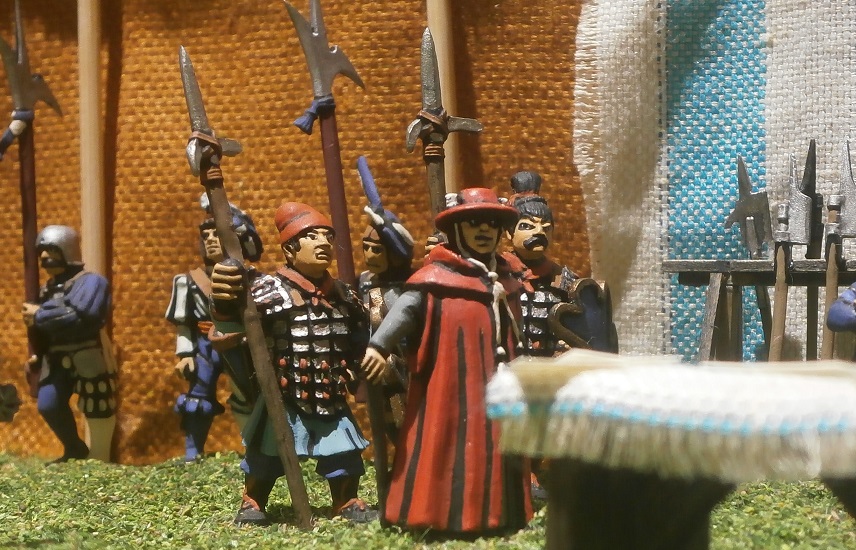 )
)
“So, I propose the following plan: I will, with the aid of brave Lord Silvano here, lead the armies of Remas and the Pavona north towards the contada of Preto, while the rest of you assault the city. When you win, which you surely must do with the strength at your disposal, and our enemies again attempts to escape, we will intercept and utterly destroy them. In this way, the vampires’ final defeat will truly have begun. As we speak, the fanatical army of the Disciplinati di Morr is pursuing the vampire duchess towards Ebino. When they catch her, she will have only what remains to her after the second assault on Viadaza, and nothing from this southern army to come to her aid. Even if the Disciplinati ‘s army fails to destroy her army completely, we can march north with sufficient strength to deliver the necessary coup de grace.”
He knew that those gathered had not in their wildest dreams expected him to suggest dividing their strength at the very moment that such a force had at long last successfully been gathered. But he had weighed everything as best he could and was convinced the enemy could not prevail against the three armies from the south.
No-one spoke, instead waiting for Lord Alessio’s reply.
“I think,” said the captain general, “your Holiness, you have the true measure of what is required of us. We cannot allow the enemy to slip away. Even if we surround the city they could break through, as they have done before.”
Here Lord Alessio fell silent.
“But to take two armies for a task that may not even prove necessary,” said General Marsilio, “surely that is too much? It could weaken us critically before the walls of Trantio. If we cannot beat them, they will not run.”
“By your leave, General Alessio,” said the bald-headed officer by his side. “We need not send all the Remans and Pavonans, but rather send those from each army who are of little use in the assault. My own demigryphs, the Black Guard and the Knights of the Lady would all be wasted before the walls, as would all the rest of the horse.”
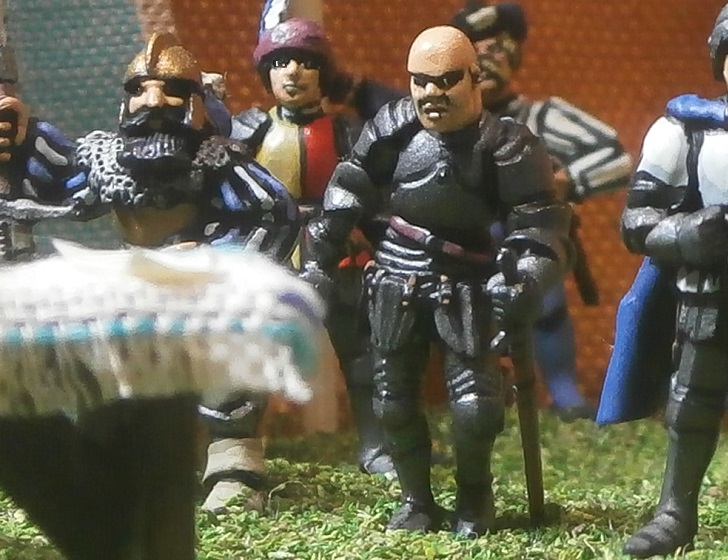
“But do we have sufficient horse to ensure victory over a retreating foe, Lord Black?” asked one of Lord Alessio’s advisers lurking in the rear, a short man, who looked more courtier than soldier. Lord Alessio listened without turning, as if there were such a familiarity between the two that he need not do so. “King Ferronso took his mounted men at arms away with him. Lord Lucca took his light horse. Now we learn that Duke Guidobaldo’s mounted knights have also gone.”

The captain-general seemed to be pondering the courtier’s concerns - Bernado assumed he was counting riders in his mind.
“Then the soldiers of my army will make up the shortfall,” offered Bernado. “This was my suggestion, and I would have my own forces committed to ensuring its success. My dwarfs cannot move as rapidly as the horse, but they can catch up every evening. My skirmishers and crossbowmen should also be sufficiently fleet of foot, certainly for the task in hand, for we are not asking them to travel a great distance. And we must, of course, send some of my fighting priests, for those we face are our god’s particular enemy, and my priests’ prayers could prove vital to success. I will stay here with you, for then I myself might channel holy Morr’s anger against the foe.”
“I can spare Pandolfo and his galloper gun,” said Barone Iacopo. “Its shots would barely chip the walls of Trantio but could sting the foe in the open field.”
“Good, good,” said Lord Alessio. “Then we can pursue your holiness’s plan, but with a force drawn from all the armies, sufficiently strong, sufficiently fast. Lord Marcus will command this interceptor force …”
“But Alessio …” interrupted Lord Black, only to be silenced by Lord Alessio’s raising of a hand.
“I would have you, Ned, with me before the city walls. If some monstrous creature were to emerge, or hellish riders, then you and your demigryphs may be needed. I think it would be unwise to leave our flanks unguarded before Trantio, considering what horrors may sally forth.”
“Lord-general,” came the thickly accented voice of the arabyan standing behind the captain-general. “The colossus?”
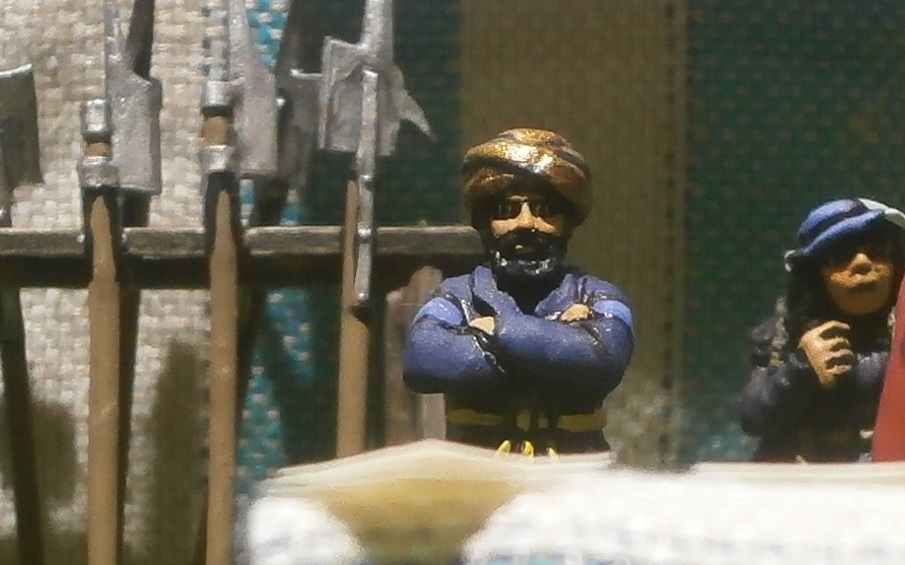
“It stays,” ordered Lord Alessio. “The weight of the foe’s magic will bear against us in the assault, and, though very thankful of the priests’ prayers, I would fight like with like. You and your construct will stay, to protect the other flank.”
Prequel to the Battle of the Valley of Death
At long last an army capable of striking a deadly blow at the vampire duchess’s horrid hegemony of the north had assembled, and not a moment too soon for her foul forces had reached further south than ever before. Consisting of five armies from different city states, including a multitude of mercenaries, it was vast in size. Its soldiers hailed from all over Tilea and beyond - from Estalia, the Empire and even far-flung Cathay, with dwarf and halfling regiments as well as those of men. Their assembly spawned a sprawling camp, filling an entire valley in the wide, low hills west of Trantio. At the camp’s heart stood a massive tent, where the allies' council of war was about to begin.
Having traveled at the head of the last two armies to arrive, Arch-Lector Bernado Ugolini now made his way to that tent, accompanied by several of his Cathayan bodyguards. As he walked, he scrutinised the soldiers he passed to satisfy himself that there was indeed enough strength in the three southern armies already present to make his (about to be) proposed plan viable. In truth, he had expected more - the Verezzan and Luccinan contingents appeared to be significantly depleted in strength. Perhaps, he thought, they were divided and so also distributed elsewhere in the camp, but he knew this was unlikely for it not at all the usual practice. As the massive Portomaggioran army made up for any deficiency in numbers on the lesser realms' behalf, he did not let it worry him. Indeed, his spirits were sufficiently lifted to put a smile upon his face. The Tileans in the camp saw this as a sign of his pleasure, his happy blessing upon them, and respectfully made the sign of Morr as he passed. Even Myrmidia-worshipping soldiers knew which god to pray to when facing the undead.
Of course, his expression grew stern before he entered the command tent, for he knew full well that there was work yet to be done inside, and no guarantee of success. He had marched with enough conglomerate armies, either advising or commanding them, to know that it was never easy to reach a consensus concerning strategy. What with commanders from no less than five different states, several of whom did not merely distrust each other but had effectively been enemies until the dire threat of undeath had forced their cooperation, he expected the canvass walls to house a veritable cornucopia of conflicting concerns, incompatible priorities and discordant interests. More than this, there would most likely be disagreements between officers within the same army.
Passing Lord Alessio Falconi’s guards both outside and in …

… he discovered a gathering of officers and their attendants around a central table. Lord Alessio of Portomaggiore was immediately apparent, standing beneath a painted, silken banner sporting his family’s golden falcon, with an eclectic collection of what must be his captains gathered around him. He was well known to have travelled widely, and it appeared he had brought some of those he had encountered back with him. Upon thinking this, Bernado had to suppress a new smile, for of course he himself was guarded by strangely garbed Cathayans.
The young Lord Silvano, whom Bernado knew very well indeed from their shared adventures and who had rode with him from Remas, was already in attendance, liveried in Pavonan blue and white, and as such identical to the blue and white of Lord Alessio’s army. Some childish remnant lurking in the corner of Bernado’s mind wondered whether this was perhaps a sign that the two armies would work well together?
No doubt some of the others were from Verezzo and Luccini, but Bernado could not see the young King Ferronso amongst them, nor his good friend from youth, the philosopher Lord Lucca of Verezzo. Perhaps they had yet to arrive? What could possibly delay them, considering their armies had reportedly marched alongside the Portomaggiorans, he knew not. Perhaps their absence had something to do with the small numbers of their soldiers outside? As he took his allotted place, a place of honour to the right of the allied armies’ effective captain-general, Lord Alessio, he presumed all would become clear, momentarily.

Many amongst the officers made the sign of Morr, and Bernado acknowledged them graciously by lifting his hand in a sign of blessing and saying a brief prayer in the ancient tongue of Tilea. Appropriately, it was the captain general, Lord Alessio who then spoke,
“Your holiness, you are most welcome. I think I speak for us all when I say we are mightily reassured by your presence amongst us, especially in light of the task that now faces us. May Morr protect us in the fight to come.

Bernado did smile now. “And I am most happy to be here with you, captain general, for here at last, it seems to me upon my first impression, is gathered an army sufficient for the work of eradicating the vampires’ evil from Tilea. Morr’s blessings are most assuredly to be poured upon this army.”
“We are most happy too that you brought Lord Silvano with you,” said Alessio, bowing slightly to the young Pavonan lord, who returned the gesture. “Though I have to ask, where is Duke Guidobaldo?”
“My father felt it was his duty to return home,” said Silvano. “Our city currently lies unprotected, a state of affairs that cannot be allowed to continue now that the tyrant Boulderguts has slipped from our reach and the vampire duchess’s army is so close.”

“Ah yes,” said Lord Alessio. “We marched north in the hope of defeating Boulderguts once and for all, to prevent his further devastation. Indeed, I fashioned this army with the brutes in mind. Now we are faced with a quite different foe. Pray tell, my Lord Silvano, if your father took leave with his army, what command is left to you?”
“My father has fully honoured his commitments, taking only our horse soldiers and a newly raised regiment of Reman bravi. I now command our guns and household foot soldiers.”
“So he left behind only that which would slow him down as he went home,” muttered a grizzled, old soldier, heavily bearded and heavily armoured, wearing the yellow and blue of Verezzo.

Lord Silvano showed no sign of displeasure at this disparaging remark. Bernado had noticed that since the brutal blow to the young lord’s head at Via Diocleta, Silvano had suffered more than merely physical consequences. One of his eyes was now fashioned of glass, and he looked somehow older than his years. More noticeable, perhaps, was his distant nature, as if he were at one remove from that which occurred around him; as if, as one of the Reman priests had put it, he had taken ‘a step closer to death’. Here now, when many others would have reacted angrily to such a comment, the young lord exhibited an absence of any emotion.
“My father left me with exactly that best suited for an assault upon the walls of Trantio,” explained Lord Silvano.
Bernado nodded. “More than that, my lord, your father removed from our city those left unemployed by the fall of so many noble houses during the recent unrest. Such men could have proved most troublesome to us had they not been given new purpose. I am grateful to your father for this, and that the soldiers he left under your command are veterans who have proved themselves several times over in this war. I for one would never criticise Duke Guidobaldo’s desire to care for the well-being of his people.”
He glanced at the Verezzan captain to gauge the man’s response, but the fellow was an old veteran, an Empire mercenary by the looks of him, and simply looked on as if nothing of consequence had happened. Bernado supposed such a man would have faced such horrors during his life as a soldier that he would barely register a little awkwardness in conversation. Bernado noted, however, the comment had revealed there was still antipathy between Verezzo and Pavona, born of Lord Lucca’s allegedly tardy rejection of Duke Guidobaldo’s niece as a wife for his son. For some time, Bernado suspected Duke Guidobaldo had engineered the perceived slight to serve his own purpose (being to conquer every city-state neighbouring his own) each time claiming some matter of honour or revenge as his motive. Whether this were true or not, the bad feeling engendered between the two states was apparently still felt.
Bernado now addressed Lord Alessio, “I must ask, captain general, where are King Ferronso and Lord Lucca?
Lord Alessio gave only the hint of a frown, but several other officers noticeably glanced at each other, both acknowledging and revealing their general disquiet.
“They have also left a portion of their forces under my command,” Lord Alessio answered. “And indeed, like the good duke, saw fit to ensure that those forces were of the kind useful in an assault. Might I introduce Barone Iacopo Brunetti of Poliena, commanding the Verezzan brigade …”
Here Bernado thought Alessio was gesturing towards the mumbling Verezzan captain, but then realised there was a halfling standing by the man’s side, who now bowed.

The little barone sported a heavy iron helmet and clutched a polearm in both hands. Behind him was another halfling, an archer liveried in the yellow and blue of Verezzo.
" ... and Captain Muzio Vanni." This time he did indicate the plain spoken Verezzan. Then he turned to address another, "And this is General Marsilio da Fermo, commander of the Luccinan brigade.”
General Marsilio was another old soldier, almost white haired, in full, unadorned plate armour. He leaned upon a great battle axe of an archaic design, its haft almost as tall as him.

“Your presence, Barone Iacopo and General Marsilio,” said Bernado, choosing not to mention the captain by name, “as well as that of those you command, pleases me greatly. But I must ask again: where are your masters?”
“Blame the Sartosan scum for my king’s absence,” said General Marsilio. “Their love for gold means they care nothing for the living of Tilea. To them, this war merely presents an opportunity to raid the coastal cities whilst our armies are busy elsewhere.”
Bernado had heard the rumours of increased Sartosan activity in the Pirate’s Current, and of some northern seaman named Volker who was attempting to unite them. “The King has returned to Luccini then?” he asked.
“Aye, but unlike Lord Silvano, he has left me with little more than a single regiment to command,” said the general, sounding embittered. And well he might, thought Bernado, for the rank of general sat ill alongside command of one regiment.
“And a great gun,” said Lord Alessio.
“Aye, a single piece,” said the Luccinan with unconcealed contempt.
It occurred to Bernado that the young king might have been glad, at least, to leave his general behind, for the fellow did not seem to care about mincing his words and youthful monarchs often had a certain fragile pride about them.
“Then the pirates are to blame,” declared Bernado, “and not King Ferronso. He cannot be expected personally to fight this foe while his people are being ravaged and robbed by corsairs.”
General Marsilio acknowledged the arch-lector with a nod. Bernado turned to the halfling.
“Barone Iacopo, I was looking forward to meeting again with Lord Lucca. I can only presume he too has other concerns?”
The halfling’s voice, like most of his kind, was somewhat lilting, and in tone like that a of youth.
“A great many, your holiness. They weigh upon him heavily. If you would oblige?” asked the halfling as he gestured for a servant garbed in a flamboyant hat and carrying a polished brass horn, to come up. Bernado nodded his assent, and the courtly youth stepped forwards, unravelled a paper and began to read:

“This to his Holiness Bernado Ugolini, the righteous right hand of Morr, from your old friend Lucca. I pray you are well, and that your dreams treat you kindly. My heart is heavy with the knowledge that I shall not be with you before Trantio, and it pains me that you might think the less of me for it. Not willing to ask another to make excuses upon my behalf, I would by this missive explain myself to you, and all those with you who are to face the foul army threatening every Tilean realm. I know full well that the fate of every living Tilean hangs in the balance, and yet I cannot ignore the responsibilities of rule and the love and protection I owe my people. None presently know Razger Boulderguts’ whereabouts, but it seems to me that the brute most likely intends to circumnavigate the great allied army in order to attack the south. He has performed just such maneouevres before, and despite defeat at your hands went on to lay waste to Ridraffa. Furthermore, there are reliable reports of a large band of greenskins this side of the mountains, sufficient in strength to extract a ransom from the Pavonan town of Scozzese. Knowing that you are bringing the armies of both Remas and Pavona to join with the Portomaggiorans, and that I have left with you all that is of real use in the assault to come, thus fashioning an army entirely capable of victory in the struggle ahead, I feel that the only course of action open to me is to return to Verezzo to do what I can to keep my subjects safe from these other threats. Furthermore, it seems to me that were the rumours of an alliance between the vampires and brutes true, then it would be remiss to leave the allied army’s rear unguarded, so that Razger could launch an attack to relieve Trantio. My soldiers can guard against just such a move.
If I were a proud man, I would have stayed, but I am justly humbled by my duty to my people, obliged to accept sound reason, and beholden to taking the best course of strategic action. When it comes to the safe future of Tilea, however, I am yours to command, and so if I have chosen wrongly, then simply say so and I will return immediately. Ever your servant, and always your friend, Lucca Vescussi, Lord of Verezzo.”
Bernado dismissed the servant and thanked the barone. “I do not doubt Lord Lucca’s sincerity,” he declared, “for I know him to be as honest as he is wise. However, I was led to believe the army of the VMC is also marching north to aid us in our war, and by way of Verezzo. Would they not be of use in defeating any brutes and goblins attempting to outflank us?”
“In his wisdom, my master did take the VMC into account in his deliberations, your holiness,” said the barone, “but not as a reassurance, rather as a further cause for concern. He does not yet trust them, which in truth made for another reason to return home.”
Bernado could not argue against his old friend’s suspicions, for he himself did not know whether the Marienburgers were to be trusted. An army ruled by merchants was an unusual thing anywhere in the world, certainly in Tilea, and nothing the VMC had so far done proved their intentions harmless. They had offered protection to Alciente, and now they ruled it. They promised to fight Khurnag’s Waagh, and now they ruled all that they took from his forces. They had swallowed up Capelli without a fight, simply because the town knew it could not defend itself against such force. And it was their soldiers who had thought to interfere somewhat unhelpfully with Raverno’s self-inflicted troubles by razing the contado of Camponeffro. There was even a rumour that the VMC had hired mercenary bands of goblins. Mind you, similar tales were told of Lord Alessio, so one could not single out the northerners on this account.
Suddenly the Verezzan captain spoke again. “Nor did our master wish to fight alongside the Pavonan duke.”
The halfling looked askance at his companion. “Not so, Captain Muzio,” he was quick to counter.
“Aye, maybe you’re right,” said the captain. “If it was one of Lord Lucca concerns, I’m sure it was very low on his list.”
One of Lord Alessio’s officers, a bald, fierce looking man in full plate leaning upon his sword like a cane, snorted in laughter at this.
Lord Alessio did not rebuke the man. Instead saying,
“No matter. Even if true, we must put such petty animosities behind us, for the enemy threatens every Tilean. Like you yourself said, your holiness, and it seems Lord Lucca also believes, we have a force entirely sufficient for the task in hand. So now, shall we proceed with formulating our plan of attack? I would know first what powder each army has available, for the walls of Trantio are strong and will take require much battering if we are to breach them. My lord Silvano, were the walls breached during your father’s war against Prince Girenzo?”
“They were, captain general, but they were fully repaired during our occupation of the city. I myself oversaw the commencement of the work, and received a report when it was completed, a matter of weeks before the ogres came. I do not believe the walls were in any way dismantled during the subsequent withdrawal from the city.”
“You mean the flight from the city, after your soldiers stripped it of everything of worth,” said Captain Muzio.
Bernado had had enough of this man. “I suggest you hold your tongue, captain,” he said firmly, noticing the concern writ upon the faces of nearly all gathered, not least the captain’s nominal commander, the halfling Barone Iacopo. “If all you have to offer is accusations concerning Duke Guidobaldo’s past actions, then it seems to me you are of little use to this council.”
“I shall speak no more of it, your holiness,” said the captain. “And I apologise to all concerned for my o’er hasty words.
The young Pavonan lord’s face showed nothing but indifference. If he had noticed the formality of the apology, perhaps revealing its superficial nature, he gave no sign.
Bernado, not for the first time, wondered why - as ever in Tilea – a tangle of complications invariably threatened to imbue any alliance with an intrinsic fragility. Already, several, substantial absences meant this great army, large as it was, was nevertheless a much-reduced version of its potentially massive size. And now those officers remaining were exhibiting their mutual distrust, before a plan had been even been discussed. He had learned the hard way that every commander in a composite force such as this had his own priorities, fears and desires, his own different plans concerning how to achieve victory. Even their ideas of what constituted victory varied. Despite these concerns, he knew he himself was about to be guilty of exactly the same sort of contrariness. Still, what needed saying must be said, so he turned to Lord Alessio,
“Before you proceed, captain general, I would speak of my own concerns, for they will bear heavily upon the plans we make here.”
For the merest moment, Lord Alessio looked perplexed. But it did not last. Perhaps, thought Bernado, his own bitter experiences meant the captain-general recognised the inevitable nature of the game they were now playing?
“Of course, your Holiness,” said the captain general. “I greatly value your guidance. We all do.”
The easy acceptance and subtle flattery of this comment did make Bernado wonder about the man’s sincerity - this was not the first time he had detected Lord Alessio’s clever combination of both business and courtly skills.

Such skills would serve him well in the juggling act of commanding such an army as this. Bernado was counting on him possessing a similar talent for strategy.
“Know that what I am about to suggest comes from my own bitter experiences, not simply from prayerful contemplation,” Bernado began. “I sometimes feel I have been more a soldier than a churchman. I fought with the holy peasant-army of Viadaza against the vampire duke at the Bridge of Pontremola. Against the odds, perhaps, victory was gained, for by the hand of one man - General Urbano D’Alessio, may he find blissful rest in the garden of Morr - the vampire duke was slain, and his army faltered. Nevertheless, they escaped in force, and in all likelihood became the core of the vampire Duchess’s army. Worse than that, despite a victory bought dearly with the blood of many, the city of Viadaza was captured by the undead the very next day when Lord Adolfo revealed himself to be a vampire. I was also amongst the army that recaptured Viadaza, along with Lord Silvano here, only to watch as the vampire Lord Adolfo escaped with his foul servants to attend his cruel mistress. Only recently I fought at the Via Diocleta, where the joint armies of Remas and Pavona drove the tyrant Boulderguts from the Remas. This too was called a victory, for Boulderguts was prevented from reaching the holy city. But then he marched on to raze Ridraffa to the ground, and to escape northwards in command of a significant force and hauling a vast train of loot stolen at such a cost in lives. Now he presents more than a potential thorn in our side, for he could yet, with perhaps minimal reinforcements, bring ruin to many more cities.”
Bernado fell silent here for a moment, to let the miserable truth of what he had just said, how three of the greatest victories achieved in recent years had ultimately proved fruitless, sink in. He could not help but look at Lord Silvano, who was wounded at Via Diocleta, but again saw only the same detachment. The rest waited in anticipation to hear why he was telling them this.

“I will not allow another great sacrifice to be made, the deaths of thousands, so much suffering for so little gain. The foe must not be allowed to escape from Trantio, to rally elsewhere. This time the enemy must be annihilated. Even if they flee the city, they must be caught and destroyed. Not one, single, foul servant can be allowed to return north to the vampire duchess.”
He paused again, to judge the reaction of the men before him. They seemed solemnly agreeable so far.

“So, I propose the following plan: I will, with the aid of brave Lord Silvano here, lead the armies of Remas and the Pavona north towards the contada of Preto, while the rest of you assault the city. When you win, which you surely must do with the strength at your disposal, and our enemies again attempts to escape, we will intercept and utterly destroy them. In this way, the vampires’ final defeat will truly have begun. As we speak, the fanatical army of the Disciplinati di Morr is pursuing the vampire duchess towards Ebino. When they catch her, she will have only what remains to her after the second assault on Viadaza, and nothing from this southern army to come to her aid. Even if the Disciplinati ‘s army fails to destroy her army completely, we can march north with sufficient strength to deliver the necessary coup de grace.”
He knew that those gathered had not in their wildest dreams expected him to suggest dividing their strength at the very moment that such a force had at long last successfully been gathered. But he had weighed everything as best he could and was convinced the enemy could not prevail against the three armies from the south.
No-one spoke, instead waiting for Lord Alessio’s reply.
“I think,” said the captain general, “your Holiness, you have the true measure of what is required of us. We cannot allow the enemy to slip away. Even if we surround the city they could break through, as they have done before.”
Here Lord Alessio fell silent.
“But to take two armies for a task that may not even prove necessary,” said General Marsilio, “surely that is too much? It could weaken us critically before the walls of Trantio. If we cannot beat them, they will not run.”
“By your leave, General Alessio,” said the bald-headed officer by his side. “We need not send all the Remans and Pavonans, but rather send those from each army who are of little use in the assault. My own demigryphs, the Black Guard and the Knights of the Lady would all be wasted before the walls, as would all the rest of the horse.”

“But do we have sufficient horse to ensure victory over a retreating foe, Lord Black?” asked one of Lord Alessio’s advisers lurking in the rear, a short man, who looked more courtier than soldier. Lord Alessio listened without turning, as if there were such a familiarity between the two that he need not do so. “King Ferronso took his mounted men at arms away with him. Lord Lucca took his light horse. Now we learn that Duke Guidobaldo’s mounted knights have also gone.”

The captain-general seemed to be pondering the courtier’s concerns - Bernado assumed he was counting riders in his mind.
“Then the soldiers of my army will make up the shortfall,” offered Bernado. “This was my suggestion, and I would have my own forces committed to ensuring its success. My dwarfs cannot move as rapidly as the horse, but they can catch up every evening. My skirmishers and crossbowmen should also be sufficiently fleet of foot, certainly for the task in hand, for we are not asking them to travel a great distance. And we must, of course, send some of my fighting priests, for those we face are our god’s particular enemy, and my priests’ prayers could prove vital to success. I will stay here with you, for then I myself might channel holy Morr’s anger against the foe.”
“I can spare Pandolfo and his galloper gun,” said Barone Iacopo. “Its shots would barely chip the walls of Trantio but could sting the foe in the open field.”
“Good, good,” said Lord Alessio. “Then we can pursue your holiness’s plan, but with a force drawn from all the armies, sufficiently strong, sufficiently fast. Lord Marcus will command this interceptor force …”
“But Alessio …” interrupted Lord Black, only to be silenced by Lord Alessio’s raising of a hand.
“I would have you, Ned, with me before the city walls. If some monstrous creature were to emerge, or hellish riders, then you and your demigryphs may be needed. I think it would be unwise to leave our flanks unguarded before Trantio, considering what horrors may sally forth.”
“Lord-general,” came the thickly accented voice of the arabyan standing behind the captain-general. “The colossus?”

“It stays,” ordered Lord Alessio. “The weight of the foe’s magic will bear against us in the assault, and, though very thankful of the priests’ prayers, I would fight like with like. You and your construct will stay, to protect the other flank.”
Lands Annex
Vassal
Oh ho! Colossus! Hmmm, something monstrously evil must be lurking behind the walls!
Padre
Lord
Lands Annex":3s6qpamt said:Oh ho! Colossus! Hmmm, something monstrously evil must be lurking behind the walls!
Note the last line: "You and your construct will stay, to protect the other flank.” The Colossus is with the Portomaggioran army, not the enemy!!! (Lord Alessio calls the colossus a 'construct' because that's what it is. Think of Rhodes and you'll get the idea!)
symphonicpoet
Moderator
The Campotrotta campaign was brilliant and I look forward to the next report eagerly. Splendidly written stuff and it sounds like tremendously fun games!
Padre
Lord
Thanks Symphonicpoet. Encouragement helps feed my madness!
....
Unholy of Unholies
Second Prequel to 'The Battle of the Valley of Death'
Trantio City, Early Autumn 2403
Moved by the malice coursing through his every vein, Biagino mounted the sanctuary and strode to the altar. Although the congregation’s whimpering could be heard throughout the building, he failed to perceive it – for him, the sound was buried beneath the much more powerful sensation of their fear and the delicious stench of so much warm blood. As he greedily guzzled great gulps of the despair emanating from every living soul gathered within the church, their pathetic sobbing was akin to being merely one of several subtle notes possessed by a fine wine. He had other things on his mind to distract him, not least the fact that an enormous army was camped to the west of the city, obviously intent upon doing battle.
Since late afternoon he had been mulling over what to do about the enemy. Should he meet them upon the walls of Trantio, forcing them to assault the city, or out in the field where he could bring his whole force to bear? Should he even be attempting to take on such a massive foe at all? Perhaps his mistress would prefer he retreat than risk losing the army he now commanded? He had left Viadaza with his own Church of Nagash, including his vampire thralls and the huge mob of resurrected cultists he named the Disciplinati di Nagash but referred to as his children, and a small but substantial army gifted to him by the Duchess Maria, containing powerful, arcane constructs and even a monstrous, undead dragon. Once he arrived at Trantio, this army had grown even stronger, as he, his step-get Captain Tusco and the necromancer Pascal della Cava, raised several regiments of ancient warriors, both foot soldiers and horse, from the ancient graves and burial pits of the necropolis valley of Norochia.
Yet the enemy army, no doubt a grand alliance of several states, made all this seem paltry in comparison. This was not to be an easy decision.
Once behind the altar he gave vent to an involuntary hiss and slammed his gold-topped crozier upon the stone floor, the sharp sound of which elicited a temporary silence.

His red-robed acolytes, the vampire thralls known as La Fraternita di Morti Irrequieti, stood nearby on the sanctuary, while his newly raised, fleshless soldiers lined every wall of the church, but he paid them no attention. They gave him nothing, only took from him. It was his will that lent them purpose - without him they would neither be nor do. It was the wretched huddle of people in the nave that fascinated him, for he could feed on them, play with them, delight in their dread.
Tonight, however, he wanted something different. He wanted their worship. Raising his hands to command general attention, he began.
“Let us pray!”
There was some confusion amongst the gathered, and even that gave him joy. The living were a veritable cornucopia of feelings, every one improved by a seasoning of terror and despair. He leered at them, then raised his eyes to the great church’s ceiling, and began intoning.
“Nagashi, exaudi nos.
Domine, majestatis infinitae.
Domine, fornax ardens.
Domine, virtutum omnium abysse.
Domine, omni laude dignissime.”
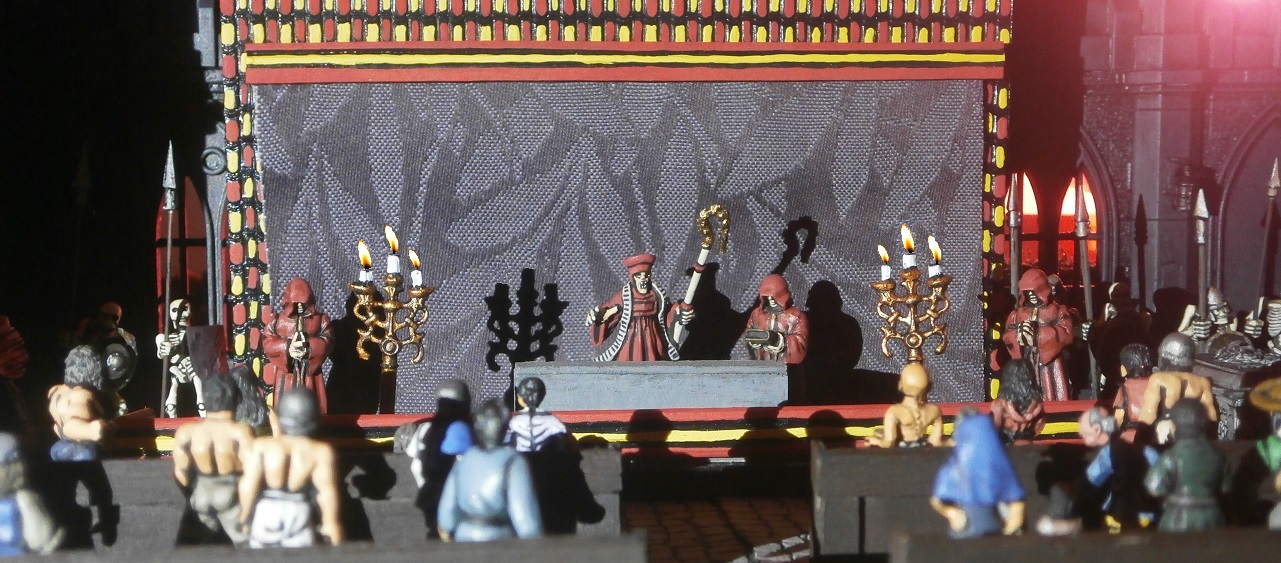
He fell silent and lowered his head to glare at the cowering flock before him.
“Well?” he demanded.
Someone began to sob – a woman by the sound of it.
“No,” he hissed angrily. “Say the words.”
The nearest acolyte, his face obscured by a hood, now sang in a voice as beautiful as it was terrible,
“Sanctificetur nomen tuum.”
This was followed by a stumbled attempt at repetition by the cowed congregation. Apart from the children, all the reluctant worshippers knew the words, being the same as those chanted by all Tileans during the most common service to Morr. The entire unholy mass was to be an inversion of the familiar; a profane mockery twisted to serve Nagash.
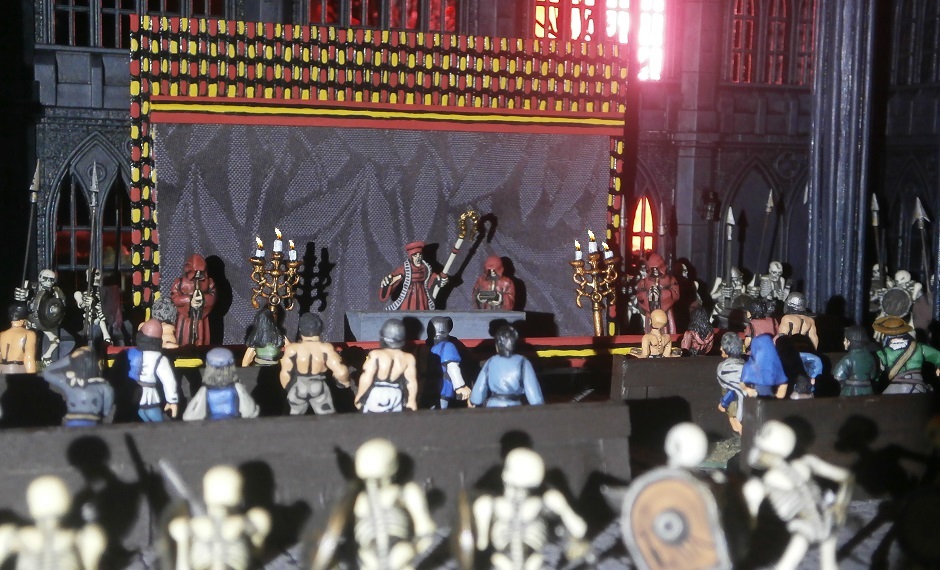
“Better,” muttered Biagino. His satisfied smile revealed the crooked fangs sitting uncomfortably large in his mouth. Then he addressed the congregation with a short homily.
“It gives me great satisfaction to see you all gathered here today. You are the last of the living in the city, and in what days remain of that life, your prayers will serve as the perfect prelude to your imminent sacrifice. Let your every thought be fearful, and all your pain and suffering be a gift unto glorious Nagash, for soon you will be his entirely, for ever more, and then all your suffering will end.”
He crooked his finger at his acolyte, who now sang another prayer, pausing between each line to allow the congregation to give their faltering repetition.
“Libera nos, Domine …
A peste et fame…
A morte perpetua ...”
“Indeed, you shall never fall sick again,” declared Biagino, recommencing his homily. “Nor feel the pang of hunger. You will be delivered from all these things. Death itself shall not come to thee, and you will forget all that you knew, even the name of the false god Morr, for you will walk this earth as a servant of great Nagash, wholly beholden to his will through the medium of myself, his true servant.”
His own words reminded him that there were still creatures in Norochia that he had yet to bend to his will – a mob of ghouls and a large pack of dire wolves. And there were without a doubt still many more ancient warriors lying there he had yet to summon to swell the ranks of his army.
This train of thought was suddenly disturbed by a commotion at the back of the nave. Peering with a power of sight his old, living body was pathetically incapable of, he spied a desperate fool clambering over a pew in an pathetic attempt to flee, only to come face to face with the rank of skeletal guards. Two thrusts of a rusty-tipped spear sent the potential escapee scrambling back to the other prisoners.
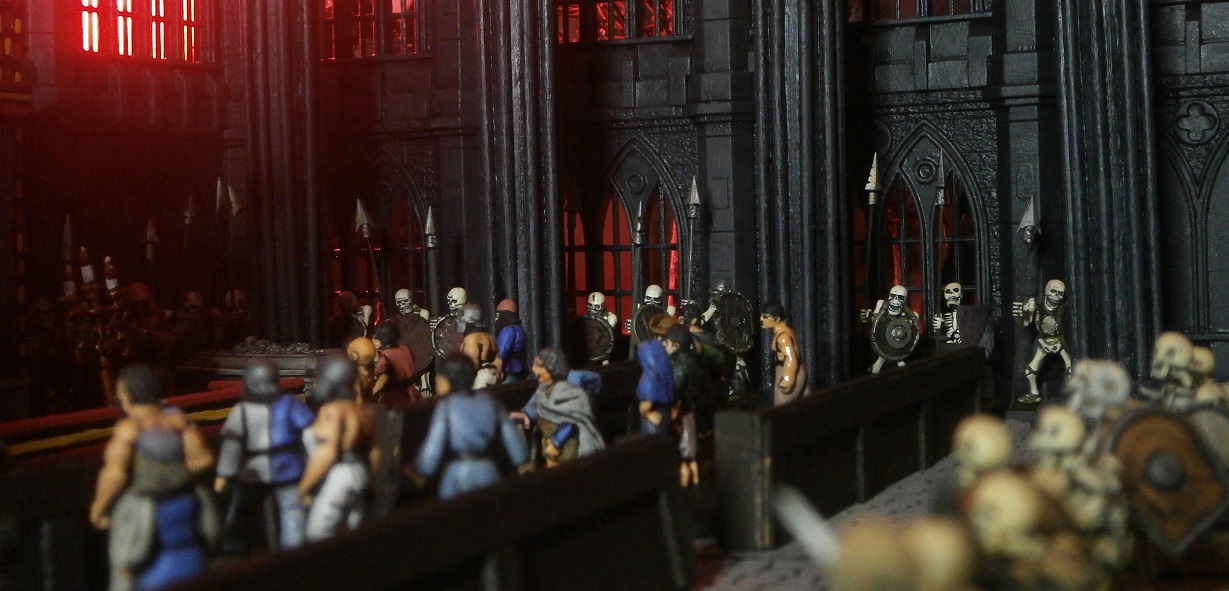
Biagino tutted to show his disapproval, his subsequent sneering glare no more or less ugly than his face at rest.
“I will brook no such nonsense,” he warned. “Any foolishness will be punished most severely. There are worse ways to suffer than your present misery. Now, shall we continue with our prayers?”
Biagino himself took up the prayers once more.
“Nagash, domine et magister
Adveniat regnum tuum, Domine
Fiat voluntas tua”
Once again, the response was ingrained in the forced-worshippers’ minds, despite the unholy insertion of foul Nagash’s name in the preceding prayer.
“Nunc, et semper, et in saecula saeculorum,” they sang with a tunelessness occasioned by fear.
Now, where was I? he asked himself. Ah yes, the valley
Suddenly, he knew exactly what to do. He would array his forces in the valley and meet the foe there, where the ground itself would provide him with reinforcements. He could wrest magical mastery of the wild inhabitants to make them his to command also.
The enemy would find themselves facing a foe from their nightmares in a place of their nightmares.
Where better?
. . . . . . . . . . . . . . . . . . . . . . . . . . . . . . . . . . . . . . . . . . . . . . . . . . . . .
Notes
Nagashi, exaudi nos (Nagash, graciously hear us.)
Domine, majestatis infinitae (Lord, of infinite majesty)
Domine, fornax ardens (lord, burning furnace)
Domine, virtutum omnium abysse, (Lord, bottomless pit of all virtues)
Domine, omni laude dignissime, (Lord, most worthy of all praise)
…
Sanctificetur nomen tuum (Hallowed be thy name)
Libera nos, Domine (Lord deliver us)
A peste et fame (From pestilence and famine)
A morte perpetua (From everlasting death)
Nagash, domine et magister (Nagash, lord and master)
Adveniat regnum tuum, Domine (Thy kingdom come.)
Fiat voluntas tua (Thy will be done)
Nunc, et semper, et in saecula saeculorum (Now, always and forever)
....
Unholy of Unholies
Second Prequel to 'The Battle of the Valley of Death'
Trantio City, Early Autumn 2403
Moved by the malice coursing through his every vein, Biagino mounted the sanctuary and strode to the altar. Although the congregation’s whimpering could be heard throughout the building, he failed to perceive it – for him, the sound was buried beneath the much more powerful sensation of their fear and the delicious stench of so much warm blood. As he greedily guzzled great gulps of the despair emanating from every living soul gathered within the church, their pathetic sobbing was akin to being merely one of several subtle notes possessed by a fine wine. He had other things on his mind to distract him, not least the fact that an enormous army was camped to the west of the city, obviously intent upon doing battle.
Since late afternoon he had been mulling over what to do about the enemy. Should he meet them upon the walls of Trantio, forcing them to assault the city, or out in the field where he could bring his whole force to bear? Should he even be attempting to take on such a massive foe at all? Perhaps his mistress would prefer he retreat than risk losing the army he now commanded? He had left Viadaza with his own Church of Nagash, including his vampire thralls and the huge mob of resurrected cultists he named the Disciplinati di Nagash but referred to as his children, and a small but substantial army gifted to him by the Duchess Maria, containing powerful, arcane constructs and even a monstrous, undead dragon. Once he arrived at Trantio, this army had grown even stronger, as he, his step-get Captain Tusco and the necromancer Pascal della Cava, raised several regiments of ancient warriors, both foot soldiers and horse, from the ancient graves and burial pits of the necropolis valley of Norochia.
Yet the enemy army, no doubt a grand alliance of several states, made all this seem paltry in comparison. This was not to be an easy decision.
Once behind the altar he gave vent to an involuntary hiss and slammed his gold-topped crozier upon the stone floor, the sharp sound of which elicited a temporary silence.

His red-robed acolytes, the vampire thralls known as La Fraternita di Morti Irrequieti, stood nearby on the sanctuary, while his newly raised, fleshless soldiers lined every wall of the church, but he paid them no attention. They gave him nothing, only took from him. It was his will that lent them purpose - without him they would neither be nor do. It was the wretched huddle of people in the nave that fascinated him, for he could feed on them, play with them, delight in their dread.
Tonight, however, he wanted something different. He wanted their worship. Raising his hands to command general attention, he began.
“Let us pray!”
There was some confusion amongst the gathered, and even that gave him joy. The living were a veritable cornucopia of feelings, every one improved by a seasoning of terror and despair. He leered at them, then raised his eyes to the great church’s ceiling, and began intoning.
“Nagashi, exaudi nos.
Domine, majestatis infinitae.
Domine, fornax ardens.
Domine, virtutum omnium abysse.
Domine, omni laude dignissime.”

He fell silent and lowered his head to glare at the cowering flock before him.
“Well?” he demanded.
Someone began to sob – a woman by the sound of it.
“No,” he hissed angrily. “Say the words.”
The nearest acolyte, his face obscured by a hood, now sang in a voice as beautiful as it was terrible,
“Sanctificetur nomen tuum.”
This was followed by a stumbled attempt at repetition by the cowed congregation. Apart from the children, all the reluctant worshippers knew the words, being the same as those chanted by all Tileans during the most common service to Morr. The entire unholy mass was to be an inversion of the familiar; a profane mockery twisted to serve Nagash.

“Better,” muttered Biagino. His satisfied smile revealed the crooked fangs sitting uncomfortably large in his mouth. Then he addressed the congregation with a short homily.
“It gives me great satisfaction to see you all gathered here today. You are the last of the living in the city, and in what days remain of that life, your prayers will serve as the perfect prelude to your imminent sacrifice. Let your every thought be fearful, and all your pain and suffering be a gift unto glorious Nagash, for soon you will be his entirely, for ever more, and then all your suffering will end.”
He crooked his finger at his acolyte, who now sang another prayer, pausing between each line to allow the congregation to give their faltering repetition.
“Libera nos, Domine …
A peste et fame…
A morte perpetua ...”
“Indeed, you shall never fall sick again,” declared Biagino, recommencing his homily. “Nor feel the pang of hunger. You will be delivered from all these things. Death itself shall not come to thee, and you will forget all that you knew, even the name of the false god Morr, for you will walk this earth as a servant of great Nagash, wholly beholden to his will through the medium of myself, his true servant.”
His own words reminded him that there were still creatures in Norochia that he had yet to bend to his will – a mob of ghouls and a large pack of dire wolves. And there were without a doubt still many more ancient warriors lying there he had yet to summon to swell the ranks of his army.
This train of thought was suddenly disturbed by a commotion at the back of the nave. Peering with a power of sight his old, living body was pathetically incapable of, he spied a desperate fool clambering over a pew in an pathetic attempt to flee, only to come face to face with the rank of skeletal guards. Two thrusts of a rusty-tipped spear sent the potential escapee scrambling back to the other prisoners.

Biagino tutted to show his disapproval, his subsequent sneering glare no more or less ugly than his face at rest.
“I will brook no such nonsense,” he warned. “Any foolishness will be punished most severely. There are worse ways to suffer than your present misery. Now, shall we continue with our prayers?”
Biagino himself took up the prayers once more.
“Nagash, domine et magister
Adveniat regnum tuum, Domine
Fiat voluntas tua”
Once again, the response was ingrained in the forced-worshippers’ minds, despite the unholy insertion of foul Nagash’s name in the preceding prayer.
“Nunc, et semper, et in saecula saeculorum,” they sang with a tunelessness occasioned by fear.
Now, where was I? he asked himself. Ah yes, the valley
Suddenly, he knew exactly what to do. He would array his forces in the valley and meet the foe there, where the ground itself would provide him with reinforcements. He could wrest magical mastery of the wild inhabitants to make them his to command also.
The enemy would find themselves facing a foe from their nightmares in a place of their nightmares.
Where better?
. . . . . . . . . . . . . . . . . . . . . . . . . . . . . . . . . . . . . . . . . . . . . . . . . . . . .
Notes
Nagashi, exaudi nos (Nagash, graciously hear us.)
Domine, majestatis infinitae (Lord, of infinite majesty)
Domine, fornax ardens (lord, burning furnace)
Domine, virtutum omnium abysse, (Lord, bottomless pit of all virtues)
Domine, omni laude dignissime, (Lord, most worthy of all praise)
…
Sanctificetur nomen tuum (Hallowed be thy name)
Libera nos, Domine (Lord deliver us)
A peste et fame (From pestilence and famine)
A morte perpetua (From everlasting death)
Nagash, domine et magister (Nagash, lord and master)
Adveniat regnum tuum, Domine (Thy kingdom come.)
Fiat voluntas tua (Thy will be done)
Nunc, et semper, et in saecula saeculorum (Now, always and forever)
symphonicpoet
Moderator
Well done Padre! You have earned your name with this dark story. Brilliant! The blend of familiar and twisted is utterly perfect.
Stormbringer
Vassal
Impressive and highly atmospheric! I love the light coming through the windows!
Grungni
Serf
Keep up the good work Padre, i have read it through twice and (for your benefit) i am compiling a list of typos so that (if you wish) you shall be able to clean it up later. They are few, your writing/typing is good - this is why i wish to help you.
I hope that you are not abducted by aliens.
I hope that you are not abducted by aliens.
Grungni
Serf
I have read this thread through twice entirely, i love Warhammer Battle Reports (1st - 7th (i can handle 8th)) and i also love fantasy stories ... your creation is a delight.
I have said/typed it before and i shall again. Kudos Padre.
I will PM a detailed list of typos at some point within a few turns of the moon...
I have said/typed it before and i shall again. Kudos Padre.
I will PM a detailed list of typos at some point within a few turns of the moon...
Padre
Lord
Your kind words, Grungni, have re-energised my considerably. So, here goes the next one ....
The Battle of the Valley of Death
The Necropolis Valley of Norochia, west of Trantio, Early Autumn, IC 2403
Captain General Lord Alessio Falconi, despite everyone else’s surprise that the enemy had left the protection of the city walls to assemble in the nearby valley of Norochia, did not hesitate in issuing new battle orders. He knew that with a force as huge and unwieldy as this great alliance army, containing battalions from five different realms, any indecision on his behalf could escalate into a hazardous delay upon the field.
It was generally agreed the enemy must be expecting to gain some advantage from choosing to fight outside the city walls, and although some believed a relief force must be on its way to join the enemy host, most thought it was glaringly obvious why the undead would choose Trantio's ancient necropolis as their battleground - the reinforcements were, in effect, already there. They just had to claw their way out of their graves to muster with the already animated corpses serving their vampire masters!

Lord Alessio had incorporated both possibilities into his thinking. If there was a force on its way, then it would surely be intercepted by the mounted force he had ordered to skirt north of the city. The horse-soldiers’ manoeuvre had been intended to prevent any enemies escaping Trantio, thus (un)living to fight another day, but they were also very well placed to serve in this new, if unexpected, role. And if the vampires did intend to bolster their strength with warriors newly raised from the ancient graveyards and tombs, then speed was of the essence. Lord Alessio’s army must engage the enemy as soon as possible, to limit the time available for any necromantic machinations.
And so the allied army, consisting almost solely of foot soldiers and artillery (having been selected to besiege the city), marched boldly to array themselves upon the western ridge of the valley, despite the horrific sight of the enemy silently forming up on the eastern slopes. They performed the manoeuvre well, thanks to the drills Lord Alessio had required of them during their march. Three times he had ordered them to form from marching column into line of battle, their performance improving on each occasion, despite the fact that he specified a different disposition every time. Lord Alessio needed the allied contingents to act as a cohesive force in the field, and to know that they could and would follow his orders promptly. He had them march in a specific order each day, all the better to facilitate his orders for deployment. Unlike their practices, however, this time budge barrels were unloaded and powder distributed, their handguns made ready, matches lit, and the giant colossus-construct was conjured from its slumber (upon a covered pallet carried by three massive wains) to take its place on the far left of the line.
The captain general’s own army was mainly concentrated on the right of the line. He intended these, being the soldiers he most trusted, to secure that flank from any enemy attempt to outmanoeuvre the army. He also concentrated the army’s artillery on this flank, no less than six great cannons and four master engineers (four of the component contingents having brought their own engineers to tend their own pieces). There were a brace of Pavonan pieces, another two Portomaggioran, as well as Reman and Luccinan guns, all of which were also shielded by his own troops. He expected the guns to deliver several crucial and crippling blasts against the foe and was therefore keen to ensure they could not be interfered with by the enemy – another reason to have his most trusted soldiers upon that flank.
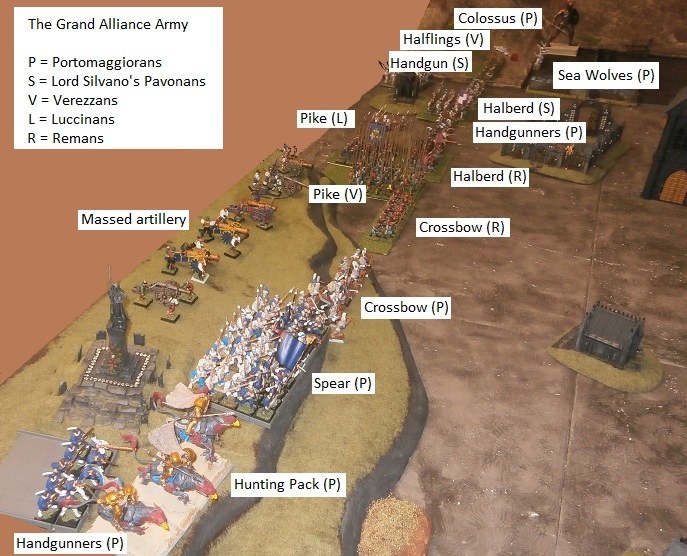
On the furthest flank was Lord Ned’s hunting pack of demigryphs, the fastest troops Lord Alessio had with this army, commanded by his most ferocious commander. This was the only mounted company he had not sent away with the interceptor force heading to the north of the city. If anyone was to prove a match for whatever might attempt to break through, or ride around, the flank to attack the guns, then it was Lord Ned and his monstrous cavalry. Nevertheless, to assist them in this task was a company of handgunners, who might at least slow the enemy sufficiently to allow Lord Ned to bring his own company to bear upon them.
Next in line towards the army centre, was his large regiment of spears and his crossbow, and beyond these Portomaggiorans, upon the lower ground, were massed troops of the allied forces. The Cathayan mercenaries of the arch-lector’s Reman army stood centre-front, crossbowmen and halberdiers with banners showing the keys to Morr’s Garden, while the Verezzan’s large pike regiment and crossbowmen were to their right. Behind them was the smaller Luccinan pike regiment, bearing a royal banner of three fleur de lis (after all, they served a king) and to their left was the second company of Portomaggioran handgunners.
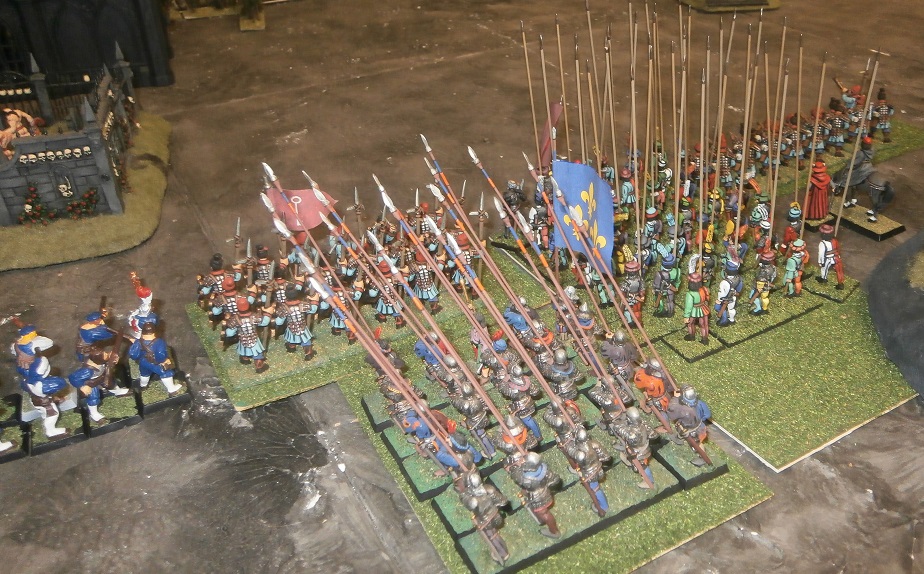
Further left were young Lord Silvano’s Pavonans - archers, halberdiers, handgunners. Their original strength had been reduced by constant war, yet they were still a significant force. The two huge blocks of baggage were clustered behind them, with an unusual halfling war machine nestled in between.

Similarly (suspiciously) close to the baggage, Barone Iacopo and his Verezzan halfling archers had formed up further to the left, and out on the far-left flank – again because Lord Alessio trusted them – marched the plate-clad Portomaggioran veterans known as the Sea Wolves. Finally, upon the army’s extreme flank, strode the Portomaggioran Colossus, as tall as the tallest of giants (if not taller) and fashioned of enchanted bronze and silvered steel, containing massively intricate iron gears and clockwork mechanisms.
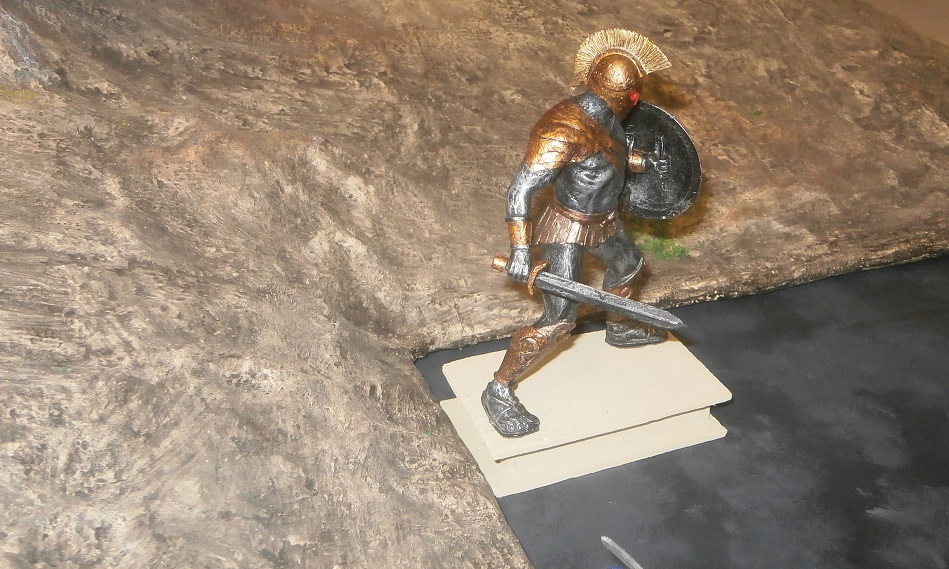
(Game Note: The colossus has the stats, abilities and points-cost of the Tomb Kings’ Heirotitan, but he assists the Portomaggioran army’s spellcasters. This is an example of a player’s own inventive ideas in the campaign. Damo wanted a ‘colossus of Rhodes’ type statue to defend his city, so as a GM I told him the points cost and the time it would take to construct. Later he wanted it to move with his army, which I allowed, but warned him as a consequence of hauling such a massive thing upon wagons his army would march somewhat slower than otherwise it would have done. I try to keep everything balanced. As the undead player had such monstrosities as the terrorgheist and the mortis engine, it seemed fair that with effort, spending and consequences, a 'standard' Tilean army might have a suitable monstrous element.)
…
Upon the eastern side of the valley, the vampire high-priest Biagino watched as the living army assembled. Standing with his Disciplinati di Nagash (the resurrected corpses of the same Morrite dedicants he had marched with when he too had been alive) it crossed his mind that perhaps he should have begun the advance against the enemy earlier, despite the fact his own force had yet to fully assemble. This thought, however, was a fleeting notion, and was soon lost as he scrutinised the enemy army, assessing where the dangers lay, and the weaknesses.
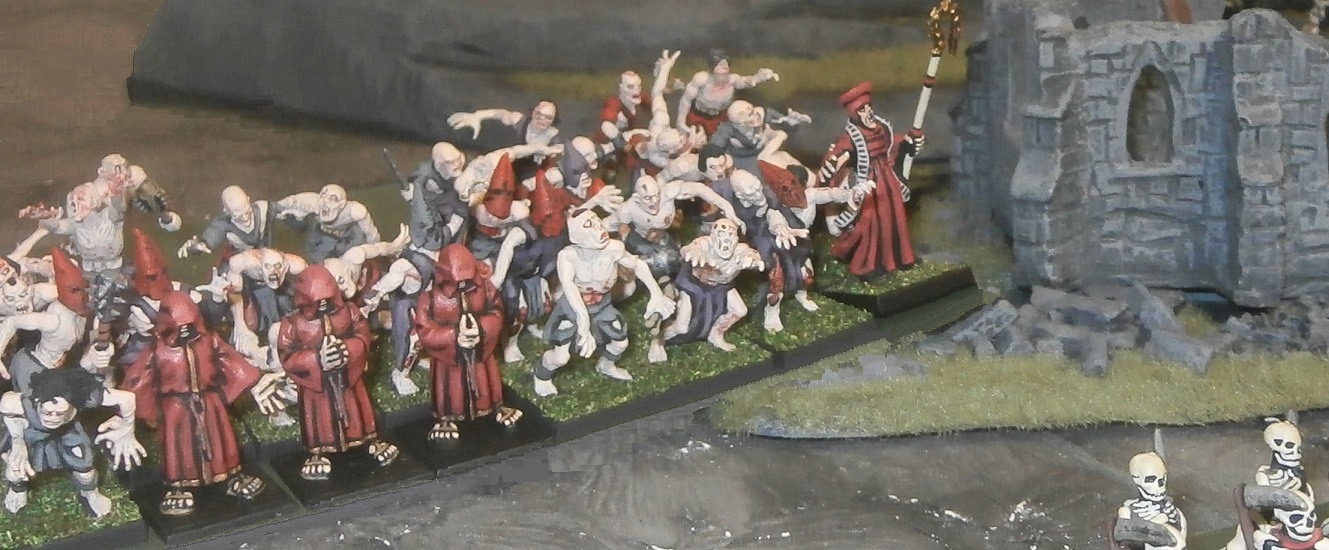
Worryingly, it seemed to him very clear that there were plenty of the former and very few, if any, of the latter. Never before had he seen an army so large. The Viadazan and Reman armies he had marched with when alive had been considerably smaller, and they had nowhere near as many guns. It also occurred to him that he could see not see any horse soldiers, which probably meant that what he could now see was only a portion of the enemy’s true strength. Their army must have been truly massive on the march!
Where are the horsemen? he wondered. Are they out on the flanks, concealed by the lie of the land? If so, then the situation was worse than he had previously thought. What chance did his army have if surrounded entirely? Or are the horse elsewhere? Whatever the truth, he had played his hand and now had to see it through. If he routed the foe before him, he could deal with any mounted soldiers later. And if his enemies were attempting to outflank him, then delay would only give them more time to do so. This was his moment – his chance to prove himself to his mistress and defeat the greatest army sent against her yet.
Biagino, his three thralls and his mob of rotting cultists stood on the right of the army’s centre. Further right was a large regiment of skeletons, the corpse cart, his skeleton riders and a slavering pack of dire wolves.

To his immediate left were two more large regiments of skeletons, one of which obscured from the enemy’s sight by the large church occupying the middle of this stretch of the valley.
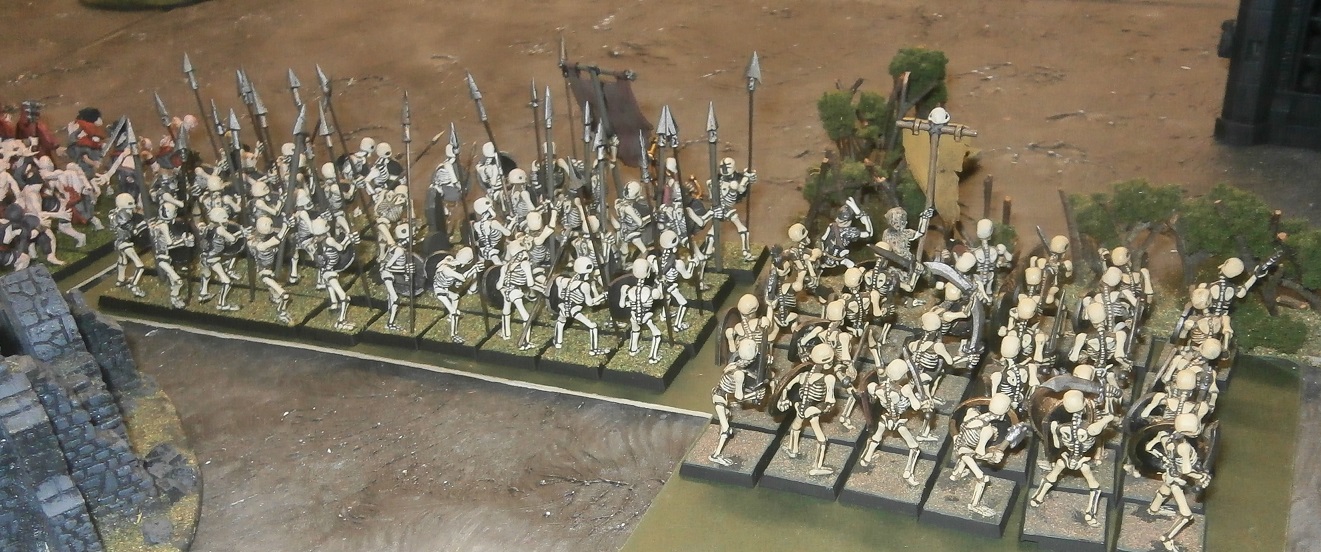
Out on the right flank proper, his vargheists lurked behind a large mob of zombies created from those poor souls who had foolishly returned to scratch a living in the ruins of the city of Trantio after the Pavonans abandoned it and the ogres then ransacked it. Beyond them slunk the huge terrogheist, and beside that the mortis engine drifted ethereally. This had a body of undead ogres before it, and a regiment of grave guard beside it. Outermost on the right rode a company of wraiths.
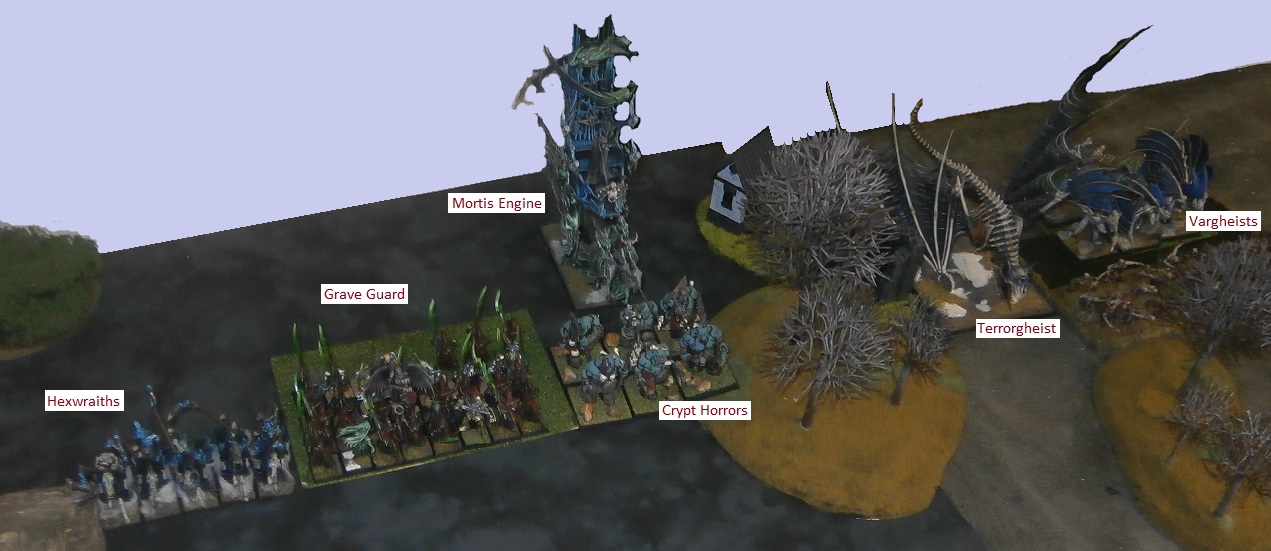
With the merest flick of his wrists, his army beholden to his necromantic will, Biagino commanded his dire wolves and hexwraiths to advance, all the better to get a feel for how the enemy intended to proceed, and how they might respond to the sight of such creatures of the night moving towards them. While the wolves loped between the ancient tombs towards the Portomaggiorans massed on the opposite slope …
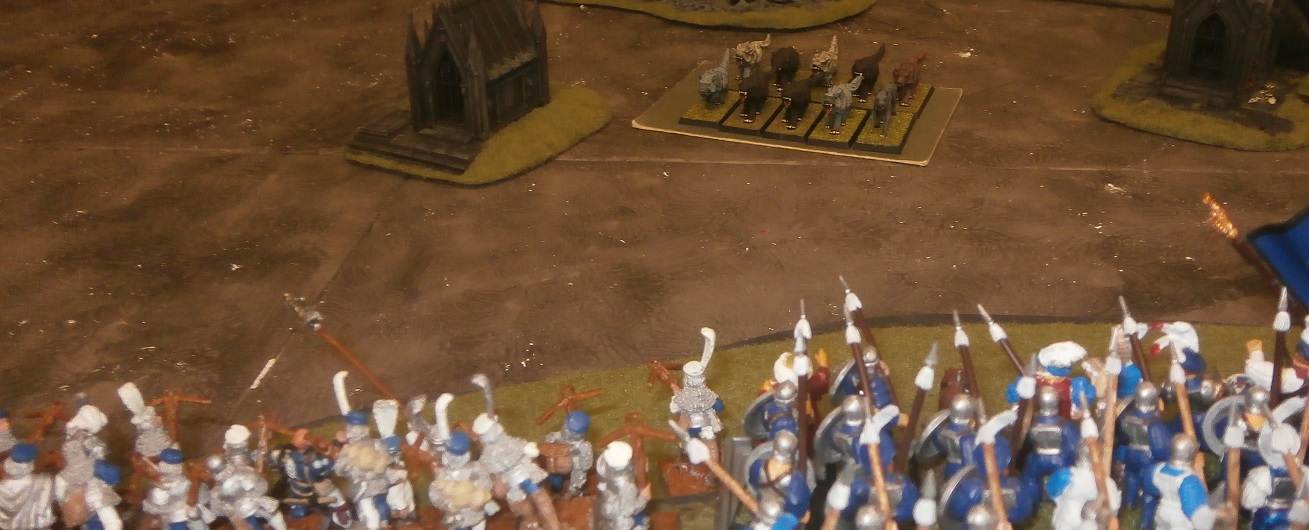
… the wraiths moved boldly on the far right towards the colossal construct.

Due to the nature of the deployment, nearly every living soldier could see these two bodies advancing, but instead presenting a threatening countenance, the act of moving ahead of their own lines merely made them seem weak and lonely. The crossbowmen before the wolves calmly hefted their now spanned weapons to fit their bolts, while the gunners upon the higher slope blew upon their coals and prepared for their first volley.

(Deployment and vanguard moves completed.)
The Battle of the Valley of Death
The Necropolis Valley of Norochia, west of Trantio, Early Autumn, IC 2403
Captain General Lord Alessio Falconi, despite everyone else’s surprise that the enemy had left the protection of the city walls to assemble in the nearby valley of Norochia, did not hesitate in issuing new battle orders. He knew that with a force as huge and unwieldy as this great alliance army, containing battalions from five different realms, any indecision on his behalf could escalate into a hazardous delay upon the field.
It was generally agreed the enemy must be expecting to gain some advantage from choosing to fight outside the city walls, and although some believed a relief force must be on its way to join the enemy host, most thought it was glaringly obvious why the undead would choose Trantio's ancient necropolis as their battleground - the reinforcements were, in effect, already there. They just had to claw their way out of their graves to muster with the already animated corpses serving their vampire masters!

Lord Alessio had incorporated both possibilities into his thinking. If there was a force on its way, then it would surely be intercepted by the mounted force he had ordered to skirt north of the city. The horse-soldiers’ manoeuvre had been intended to prevent any enemies escaping Trantio, thus (un)living to fight another day, but they were also very well placed to serve in this new, if unexpected, role. And if the vampires did intend to bolster their strength with warriors newly raised from the ancient graveyards and tombs, then speed was of the essence. Lord Alessio’s army must engage the enemy as soon as possible, to limit the time available for any necromantic machinations.
And so the allied army, consisting almost solely of foot soldiers and artillery (having been selected to besiege the city), marched boldly to array themselves upon the western ridge of the valley, despite the horrific sight of the enemy silently forming up on the eastern slopes. They performed the manoeuvre well, thanks to the drills Lord Alessio had required of them during their march. Three times he had ordered them to form from marching column into line of battle, their performance improving on each occasion, despite the fact that he specified a different disposition every time. Lord Alessio needed the allied contingents to act as a cohesive force in the field, and to know that they could and would follow his orders promptly. He had them march in a specific order each day, all the better to facilitate his orders for deployment. Unlike their practices, however, this time budge barrels were unloaded and powder distributed, their handguns made ready, matches lit, and the giant colossus-construct was conjured from its slumber (upon a covered pallet carried by three massive wains) to take its place on the far left of the line.
The captain general’s own army was mainly concentrated on the right of the line. He intended these, being the soldiers he most trusted, to secure that flank from any enemy attempt to outmanoeuvre the army. He also concentrated the army’s artillery on this flank, no less than six great cannons and four master engineers (four of the component contingents having brought their own engineers to tend their own pieces). There were a brace of Pavonan pieces, another two Portomaggioran, as well as Reman and Luccinan guns, all of which were also shielded by his own troops. He expected the guns to deliver several crucial and crippling blasts against the foe and was therefore keen to ensure they could not be interfered with by the enemy – another reason to have his most trusted soldiers upon that flank.

On the furthest flank was Lord Ned’s hunting pack of demigryphs, the fastest troops Lord Alessio had with this army, commanded by his most ferocious commander. This was the only mounted company he had not sent away with the interceptor force heading to the north of the city. If anyone was to prove a match for whatever might attempt to break through, or ride around, the flank to attack the guns, then it was Lord Ned and his monstrous cavalry. Nevertheless, to assist them in this task was a company of handgunners, who might at least slow the enemy sufficiently to allow Lord Ned to bring his own company to bear upon them.
Next in line towards the army centre, was his large regiment of spears and his crossbow, and beyond these Portomaggiorans, upon the lower ground, were massed troops of the allied forces. The Cathayan mercenaries of the arch-lector’s Reman army stood centre-front, crossbowmen and halberdiers with banners showing the keys to Morr’s Garden, while the Verezzan’s large pike regiment and crossbowmen were to their right. Behind them was the smaller Luccinan pike regiment, bearing a royal banner of three fleur de lis (after all, they served a king) and to their left was the second company of Portomaggioran handgunners.

Further left were young Lord Silvano’s Pavonans - archers, halberdiers, handgunners. Their original strength had been reduced by constant war, yet they were still a significant force. The two huge blocks of baggage were clustered behind them, with an unusual halfling war machine nestled in between.

Similarly (suspiciously) close to the baggage, Barone Iacopo and his Verezzan halfling archers had formed up further to the left, and out on the far-left flank – again because Lord Alessio trusted them – marched the plate-clad Portomaggioran veterans known as the Sea Wolves. Finally, upon the army’s extreme flank, strode the Portomaggioran Colossus, as tall as the tallest of giants (if not taller) and fashioned of enchanted bronze and silvered steel, containing massively intricate iron gears and clockwork mechanisms.

(Game Note: The colossus has the stats, abilities and points-cost of the Tomb Kings’ Heirotitan, but he assists the Portomaggioran army’s spellcasters. This is an example of a player’s own inventive ideas in the campaign. Damo wanted a ‘colossus of Rhodes’ type statue to defend his city, so as a GM I told him the points cost and the time it would take to construct. Later he wanted it to move with his army, which I allowed, but warned him as a consequence of hauling such a massive thing upon wagons his army would march somewhat slower than otherwise it would have done. I try to keep everything balanced. As the undead player had such monstrosities as the terrorgheist and the mortis engine, it seemed fair that with effort, spending and consequences, a 'standard' Tilean army might have a suitable monstrous element.)
…
Upon the eastern side of the valley, the vampire high-priest Biagino watched as the living army assembled. Standing with his Disciplinati di Nagash (the resurrected corpses of the same Morrite dedicants he had marched with when he too had been alive) it crossed his mind that perhaps he should have begun the advance against the enemy earlier, despite the fact his own force had yet to fully assemble. This thought, however, was a fleeting notion, and was soon lost as he scrutinised the enemy army, assessing where the dangers lay, and the weaknesses.

Worryingly, it seemed to him very clear that there were plenty of the former and very few, if any, of the latter. Never before had he seen an army so large. The Viadazan and Reman armies he had marched with when alive had been considerably smaller, and they had nowhere near as many guns. It also occurred to him that he could see not see any horse soldiers, which probably meant that what he could now see was only a portion of the enemy’s true strength. Their army must have been truly massive on the march!
Where are the horsemen? he wondered. Are they out on the flanks, concealed by the lie of the land? If so, then the situation was worse than he had previously thought. What chance did his army have if surrounded entirely? Or are the horse elsewhere? Whatever the truth, he had played his hand and now had to see it through. If he routed the foe before him, he could deal with any mounted soldiers later. And if his enemies were attempting to outflank him, then delay would only give them more time to do so. This was his moment – his chance to prove himself to his mistress and defeat the greatest army sent against her yet.
Biagino, his three thralls and his mob of rotting cultists stood on the right of the army’s centre. Further right was a large regiment of skeletons, the corpse cart, his skeleton riders and a slavering pack of dire wolves.

To his immediate left were two more large regiments of skeletons, one of which obscured from the enemy’s sight by the large church occupying the middle of this stretch of the valley.

Out on the right flank proper, his vargheists lurked behind a large mob of zombies created from those poor souls who had foolishly returned to scratch a living in the ruins of the city of Trantio after the Pavonans abandoned it and the ogres then ransacked it. Beyond them slunk the huge terrogheist, and beside that the mortis engine drifted ethereally. This had a body of undead ogres before it, and a regiment of grave guard beside it. Outermost on the right rode a company of wraiths.

With the merest flick of his wrists, his army beholden to his necromantic will, Biagino commanded his dire wolves and hexwraiths to advance, all the better to get a feel for how the enemy intended to proceed, and how they might respond to the sight of such creatures of the night moving towards them. While the wolves loped between the ancient tombs towards the Portomaggiorans massed on the opposite slope …

… the wraiths moved boldly on the far right towards the colossal construct.

Due to the nature of the deployment, nearly every living soldier could see these two bodies advancing, but instead presenting a threatening countenance, the act of moving ahead of their own lines merely made them seem weak and lonely. The crossbowmen before the wolves calmly hefted their now spanned weapons to fit their bolts, while the gunners upon the higher slope blew upon their coals and prepared for their first volley.

(Deployment and vanguard moves completed.)
symphonicpoet
Moderator
War and pieces! I await the outcome of this battle of barrow-draino with breath . . . wait . . . I'm not dead yet. My breath is not bated. But I am eager to see the hot iron meet the cold bones and find out how it all comes out. Splendid sir! Just splendid!
